bottom_desktop desktop:[300x250]


German Courses for Juniors
Approximately 2,000 children and youth ages 8 - 17 decide to take German language courses at did deutsch-institut or to stay longer and attend school as an exchange student in Germany. With us, you can get to know the language and culture and also make international friendships that last a lifetime.
Young Learners German Language Courses

German Summer Courses and Camps
In our German summer courses you can make rapid progress and learn actively both inside and outside the classroom

Year-Round Courses
Take advantage of our year round Intensive Course to expand your vocabulary and improve your language skills.

High School in Germany
Do you already know German? Then attend a German school and become part of a host family.
Class trips
Are you planning a class trip to Germany? We will be happy to put together a custom offer suited to the needs of your class.
German at a teacher's house
Taking language lessons designed to fit your personal goals from a teacher in their own home is one of the most successful ways to learn German.
Teaching methods
Our teachers are qualified to teach German as a Foreign Language, have earned a college degree, and can explain the language well.
Our teaching methods focus on partner and group work, and also promote communicative language skills.
We utilize authentic texts and instruct young learners in everyday language use.
During your German language course, you will learn more about the life, country and people of Germany and Austria.

FDSV DIN EN 14804
Adherence to FDSV quality standards and European norm DIN EN 14804 requirements is ascertained through regular oversight of our schools, courses and accommodation options.

At did deutsch-institut adults, kids and teens have the possibility to learn the German language and discover German and Austrian culture.
Head Office: Gutleutstr. 32 60329 Frankfurt am Main Germany
Latitude: 8.669180 Longitude: 50.106499
Phone: +49 (0) 69 2400 456 0
Fax: +49 (0) 69 2400 456 6
Email: [email protected]
Connect with us!
Subscribe to our newsletter, did deutsch-institut cookie-konfigurator.
We are using cookies on this web page. Some of them are required to run this page, some are useful to provide you the best web experience.
Individual Cookie Settings
Only accept required cookies.
Privacy Notes Imprint
Privacy settings
Here is an overview of all cookies use
Required Cookies
These cookies are needed to let the basic page functionallity work correctly.
Show Cookie Informationen
Hide Cookie Information
Typo3 System Cookies
Diese Cookies ermöglichen grundlegende Funktionen, die für die einwandfreie Nutzung der Website erforderlich sind.
CloudFlare ist ein CDN (Content Delivery Network). Verteilt die Inhalte der Website auf CloudFlare Server weltweit, beschleunigt die Webseite, zusätzlicher DDOS Schutz, Firewall
Cookies for Statistics
Statistic cookies anonymize your data and use it. These information will help us to learn, how the users are using our website.
Google Analytics
Dient zur Statistik und Erfassung personenbezogener Daten inkl. Seitenaufrufprofile durch Google
Cookies for external Content
Content for Videoplatforms und Social Media Platforms will be disabled automaticly. To see content from external sources, you need to enable it in the cookie settings.
Registriert eine eindeutige ID, um Statistiken der Videos von YouTube, die der Benutzer gesehen hat, zu behalten.
Back Only accept required cookies.
English translation of 'Klassenfahrt'
- Klassenfahrt
Examples of 'Klassenfahrt' in a sentence Klassenfahrt
Browse alphabetically Klassenfahrt
- Klassendurchschnitt
- Klassenerhalt
- Klassenerste
- Klassenfeind
- Klassenfoto
- Klassenfrequenz
- All GERMAN words that begin with 'K'
Wordle Helper

Scrabble Tools
Quick word challenge
Quiz Review
Score: 0 / 5

- Access the entire site, including the Easy Learning Grammar , and our language quizzes.
- Customize your language settings. (Unregistered users can only access the International English interface for some pages.)
- Submit new words and phrases to the dictionary.
- Benefit from an increased character limit in our Translator tool.
- Receive our weekly newsletter with the latest news, exclusive content, and offers.
- Be the first to enjoy new tools and features.
- It is easy and completely free !
- German English
- German Arabic
- German Bulgarian
- German Chinese
- German Croatian
- German Czech
- German Danish
- German Dutch
- German French
- German Greek
- German Hungarian
- German Icelandic
- German Italian
- German Japanese
- German Norwegian
- German Persian
- German Polish
- German Portuguese
- German Romanian
- German Russian
- German Slovak
- German Slovenian
- German Spanish
- German Swedish
- German Turkish
- Langenscheidt
- German-English dictionary
Klassenfahrt
German-english translation for "klassenfahrt", "klassenfahrt" english translation, „klassenfahrt“ : femininum, overview of all translations.
- class trip Klassenfahrt Klassenfahrt
Example sentences from external sources for "Klassenfahrt" (not checked by the Langenscheidt editorial team)
- Source: OPUS
- Original text source: Tatoeba
Synonyms for "Klassenfahrt"
- Schulausflug (österr.)
Die Funktionalität wird von Ihrem Browser leider nicht unterstützt

Tell us what you think!
Do you like the Langenscheidt online dictionary?
Do you have any feedback regarding our online dictionaries?
Is a translation missing, have you noticed a mistake, or do you just want to leave some positive feedback? Please fill out the feedback form. Giving an email address is optional and, under our privacy policy, used only to handle your enquiry.
Please confirm you are human by ticking the checkbox.*
*Mandatory field
Please fill in the fields marked *.
Thank you for your feedback!
Visit us at:

High School in Germany
Germany is one of the most influential and interesting nations in Europe. With its landscape of lush forests, bustling cities, winding rivers, and northern beaches, Germany greets visitors with cultural treasures such as the Berlin wall, the Brandenburg Gate, the Black Forest Railway, and more! Want to learn more about this amazing country first hand? You can with our high school study abroad programs!
Program Dates
Costs & discounts, eligibility, academic info, orientation, application process.
Our High School Exchange Program in Germany will enable you to immerse yourself in German culture while living with a German host family and sharing in their daily life. As a family member, you will participate in activities and adapt to the family rules as if they were your own. You’ll also attend the high school nearest your host family’s home. Schools in Germany offer a wide range of subjects, including German, English, Math, Physics, History, Art, and Music. Many schools also offer a wide range of extracurricular activities, such as choir, orchestra, foreign languages, arts, sports, and drama. High school abroad in Germany is a once in a lifetime experience!
Not interested in studying in Germany? How about France! Learn more here .
About Germany
Germany is a country full of contrasts. From its Northern beaches to the Alpine mountains in the South you’ll find highly industrialized areas as well as rivers, forests and fertile farmlands.
Located in the heart of Europe and a leader in thriving for the ongoing process of an unified and peaceful Europe, Germany today is proud of its sound democratic values, its social and health system. As well as its pulsing economy and its rich cultural history prior to World War Two. German history dates back to the Roman Ages. Old traditions co-exist with modern trends, the spirit of the Middle Ages may be encountered side by side with that of the information age. To find out how the Germans cope with the giant unification step, how various stereotypes go together with professional discipline and painstaking accurateness is certainly a great challenge and at the heart of this program.

Program Dates & Deadlines
Apply early and get a discount! Submit your application 45 days before the deadline to receive an Early Bird Discount.
These are the approximate start dates. Exact start dates will be provided closer to your arrival.
Academic Trimester: Mid-January – Late April
Academic Semester: Mid-January – Late June
Final Deadline for Completed Applications: September 1st
2 Month Program: Late August – Late October
Academic Trimester: Late August – Late November
Academic Semester: Late August – Mid-January
Academic Year: Late August – Early July
Final Deadline for Completed Applications: April 1st
Program Costs
Discounts & scholarships.
Early Bird Discount – $250 discount if you apply 45 days prior to the application deadline
Host Family Discount – Discount of up to $1000 for families that hosted an inbound student
Area Representative Discount – Discount of up to $500 for children of ISE Area Representatives
ISE Ambassador Scholarship – Designed for students who would like to engage deeply with their host community and reflect on their experience via blog/video contributions.
What's Included In The Program
- Arrival Orientation
- Comprehensive medical insurance
- Support and supervision by local representative
- Host family accommodation including 2 meals a day during the week, and 3 meals a day on the weekends.
- School tuition and fees
- Progress reports sent directly to parents
- 24/7 emergency support
- ISE Tote bag, luggage tag & lanyard
Additional Expenses You Might Incur
- Personal Expenses – cell phone bills, personal spending money, travel expenses
- Transportation to airport at conclusion of program
- Extra School Fees – Uniform, class trips, extra curricular activities
Students coming to Germany should be at least 15 years old and not older than 17 at the time of their arrival.
• At least 2 years of German at school and should be confident enough to try to communicate in German. • Good academic ability and also have a strong interest in Germany and intercultural experiences in general. • Be fun-loving, stable, uncomplicated and, last but not least, adaptable characters with a great “feeling” for people. They should be open, honest and communicative. • Be in a state of good physical and psychological health.
Most important of all these essential criteria is that the students, who apply for this program, have the genuine strong wish to take part in international exchange and get to know Germany and the Germans.
Students will attend either a Realschule, a Gymnasium or a Gesamtschule, where they will be graded according to age and academic ability. Most students attend year 11, some go to year 10. Depending on the state, there are either 12 or 13 school years in German schools, the Abitur is taken after year 12 or year 13. Exchange students will not be able to graduate.
Students have to go to school on a regular basis and will be able to choose courses they personally prefer. They will have the same status as their German fellow students. They are expected to be active members of the school community and support the class by their active participation in every course they choose.
Schools in Germany offer a wide range of subjects. The subjects they can take are: German, English, Maths, Physics, Chemistry, Geography, Social Studies, History, Physical Education, Arts, Music, French, Latin.
Many schools also offer a wide range of afternoon activities on a voluntary basis, such as choir, orchestra, foreign languages, arts, sports, drama. Often they have various sports teams (basketball, soccer, badminton etc.).
For all students an orientation will be held within the first few days upon arrival. The main subject is integration into the host family, into school, and German culture and everyday life.
- Explore our programs, options and countries to find your best match.
- You can submit the interest form here: Travel & Study Abroad Interest Form
- Schedule a meeting with one of our Travel & Study Abroad experts.
- Submit your application and a $200 application fee. This non-refundable fee will be applied to your overall program costs.
- Upon acceptance, you will be required to pay a deposit of 50% of the total program costs, up to $1500. The final payment is due several weeks before your departure.
Parent FAQs
How can my child's mental health impact their program.
Moving away from your support network and into a new and unfamiliar environment can be difficult even for the most well-adjusted students. Students with pre-existing mental health conditions may find this adjustment particularly challenging, which could worsen any issues they were previously facing.
We conduct a thorough screening of all applicants to ensure they are in the right mindset to participate. While the majority of students are eligible to participate, we may not be able to accept students who have recently struggled with mental illness and/or are reliant on medication to treat mental illness in order to protect the student’s well-being.
Pre-existing mental health conditions include, but are not limited to:
- Severe anxiety
- Eating Disorders
- Obsessive-Compulsive Disorder
Will studying abroad help my child mature?
For students prepared to take on the challenge, absolutely. It is, however, important to consider a student’s level of maturity prior to the program because it directly impacts their success.
Ideally, our programs will push students beyond their comfort zone and into what is referred to as their stretch zone . It’s in the stretch zone that learning, growth, and development - along with challenges and risk - occur.
If a student is not ready and/or willing to move beyond their comfort zone, plunging into a new and unfamiliar environment could actually have an adverse effect and place them in what is referred to as the panic zone . Parents should make an honest assessment of their child’s maturity level and understand that study abroad will not fundamentally change their child’s personality or behavior when considering the program.
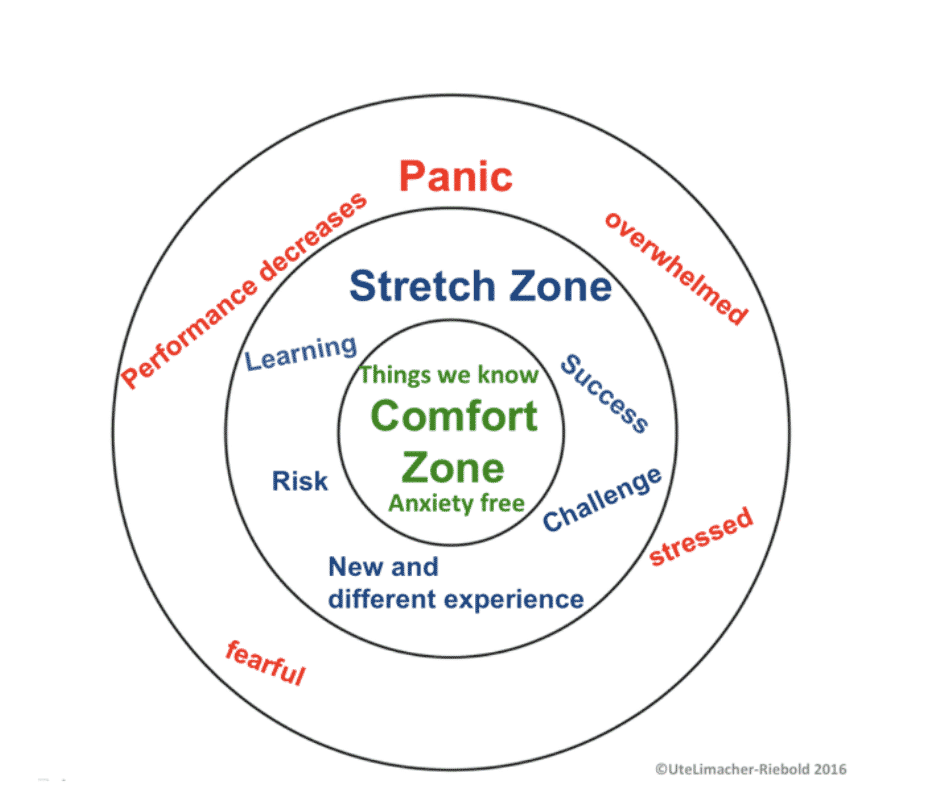
What kind of support will my child receive while studying abroad?
While abroad, your child will be fully supported. First, they will receive a personal Program Manager to assist with everything from the initial request to your child’s departure. Then, they will be supported abroad by a dedicated Local Coordinator who will frequently check in on the student and provide monthly progress reports . Your child will have the contact information of their Local Coordinator and can contact them at any time. There is also a 24/7 emergency line managed out of ISE headquarters.
Can our child come home to visit during their program? Can we visit them?
No. Visits of any kind are not allowed during our programs . If you plan to visit your child, you should plan to do so after the program has ended.
High School Program FAQs
Why participate in the high school program.
There are many benefits to attending high school abroad, including but not limited to:
- Developing new language skills
- Developing problem-solving skills
- Identifying interests to better select your college major
- Inspiring insightful college admissions essays
- Improving academic scores upon your return home
- Developing cross-cultural collaboration skills
If I must take a required class, can you guarantee I can take it abroad?
We can’t offer any guarantees that certain classes will be offered at your host school . We can provide you with general curriculum information, but often students are not able to sign up for specific classes until after they arrive in the host country. In certain instances, virtual high school options for required classes might be a useful option.
Can I take the SATs while abroad?
You will not be able to take the SATs while abroad. We highly recommend that you take the SATs prior to or after the program.
Will I receive a transcript? Will my credits from studying abroad transfer back home?
Upon successful completion of the program, everyone is guaranteed a Certificate of Attendance. Transcripts (i.e. grades) have to be earned. To earn the grades, you will have to excel in your classes abroad, in the language of your destination country. All of our high schools abroad are accredited institutions, therefore their grades are transferable to the United States. Please visit Scholaro for more information on translating and evaluating grades from abroad. As part of the preparation process, you have to check with your guidance counselor which classes/credits you will need to graduate or to advance to your next year of high school. Some classes, such as US History might not be offered abroad, and therefore you will have to find a way to earn those credits either before your study abroad year or after. One option to consider is a virtual high school.
If I already graduated, can I still study abroad?
Yes! Contact us for more details.
Are there additional costs I should budget for?
Yes. Additional expenses to consider include (estimates):
- Stationary and school supplies: $100
- School excursions and trips: $50
- Cell phone service: $20-$50/month
- Personal expenses (shopping, movies, nights out, etc.): $300/month
- Bus pass/transportation: $10-$20/week
General FAQs
Why should i study abroad.
ISE’s Travel & Study Abroad Program will take your academic, career, and life opportunities to new levels! College admissions and employers love compelling personal growth stories, and Travel & Study Abroad will supply you with those stories.
Some of the many benefits of participating in our programs include:
Academic & Career Benefits
- Stand out during the college admissions process
- Develop new language skills in an immersive environment
- Develop problem-solving skills
- Identify interests to better select academic & career paths
- Establish cross-cultural skills
- Improve academic scores
Personal Benefits
- Improve personal organization and time management skills
- Develop a sense of adaptability, independence, and self-reliance
- Boost self-confidence
- Learn about new lifestyles
- Experience new cuisines
- Make lifelong friends
- Gain life experience
Why study abroad with International Student Exchange?
Since 1982, our nonprofit organization has remained committed to educating future leaders and making a positive, long-lasting impact in communities.
To make cross-cultural experiences accessible to more people, we offer the best pricing available to our participants ...and we do so without compromising the quality of the experience or level of support offered .
We assign each participant a personal Program Manager, so you’ll receive assistance throughout your entire program experience by someone you know by name. We also provide 24/7 support from our dedicated Student Services Team.
Lastly, the trusted international organizations we partner with have been trained and certified over the course of many years working to provide study abroad programs
Does studying abroad in high school help with college admissions?
“ The summer abroad experience does lend itself to some very important essays that students write. ” Deputy director of admissions for the University of Texas
“ A lot of schools, including ours, are looking for a diverse perspective, and international experiences lend themselves to that. ” - Admissions Advisor, University of California
“ Anything that makes your application stand out is a good thing. ” - Admissions officer, University of Chicago
“ Not only does studying outside the United States help build necessary language fluency for all college-bound students, it shows those headed to elite institutions will go outside their comfort zone and expand to meet the challenge. Nothing speaks to the ethics of those institutions quite like a commitment to that kind of excellence and personal achievement. ” - Admissions Advisor, New York University
What makes someone a good exchange student?
First and foremost, program candidates should be mature, open-minded, and adaptable . Wondering if our Travel & Study Abroad Program is right for you? Check out our article Should You Study Abroad? 8 Signs You’d Make a Great Exchange Student to find out!
When can I study abroad?
During the Academic Year (Visit Our High School Programs Page for Specific Dates)
- Short Term Option (1-2 months)
- Trimester and Semester Options
- Full Year Options
During the Summer (Visit Our Summer Program Page for Specific Dates)
- Program options from 1-8 weeks
Post-High School Gap Year (Visit Our Gap Year Page for Specific Dates)
- 12-month program option
Where will I live when studying abroad?
For the majority of our programs, you’ll be living with a host family.
A few of our programs offer boarding schools. In those cases, you will be living with other students in a dormitory.
Can I choose my host family?
We offer placements in big cities, medium-sized suburbs, and small towns. For select programs, you can choose the specific location you’d like to stay in for an added fee.
Is airfare included in the program price?
We don’t include airfare in our pricing because we know that allowing people to shop around for the most competitive rates and convenient airport locations is best . Not to mention you might have frequent flyer miles that you could use towards the purchase of a ticket, why take that opportunity away?
You may see other programs that include flights, but it should be noted that often these flights will cost more than what participants could find on their own and/or depart from less convenient locations.
Will someone meet me at the airport?
Yes, pick up and drop-off at the airport is included in all of our programs.
Is insurance included in the program price?
Yes, a travel medical insurance policy is included in the program price for all participants.
Am I required to speak another language?
To attend a high school you must be sufficiently proficient in the native language of the country you would like to visit , but you don’t have to be fluent. Your language skills will improve quickly once you are culturally immersed!
Don’t speak another language? Don’t worry - we offer several programs in English-speaking countries.
How do I apply to study abroad?
We try to make the application process as simple as possible. Here are the steps you should follow if you’d like to apply:
- Explore our programs, options, and countries to find your best match.
- Complete our interest form and, if applicable, let us know who referred you to us.
- Upon acceptance, you will be required to pay a deposit of 50% of the total program cost, up to $1500. The final payment is due several weeks before your departure.
Are there any payment plans available?
All program fees must be received before departure, usually 6-8 weeks before. The usual payment schedule is: $200 student application fee, $1500 deposit before your application is forwarded to our partner in the country of choice and a remainder 6-8 weeks before departure. Personalized installment plans are also available, where a minimum payment is set at $500. We understand that financing a study abroad program might be challenging for some, therefore we want you to know that we are here to help as much as we can. Please visit our Scholarship and Fundraising pages for additional financing hints.
Can I travel alone or with friends when I have free time?
Minors are not permitted to travel alone or with other minors. You may travel with your host family, local representative, or with a school. Students above 18 years old, must coordinate with their host family and local representative before making any travel plans.
How can I make purchases with my spending money abroad?
Making the best decision on how to prepare for a trip to another country where different currency is used takes a bit of planning. Besides US dollar banknotes, that you can exchange anywhere in the world, most debit and credit cards are also accepted worldwide. Before leaving the US you should speak to your bank to make sure that you won’t be charged exorbitant international fees. Many banks in the US offer cards with no international or ATM fees. Also, consider inquiring about prepaid cards. Another option might be traveler’s checks that are an alternative to cash and cards. It is not very common that you will be able to open a local bank account to which you could transfer money to. However, since we live in an ever-changing world, you should never disregard this option; we encourage you to inquire about it upon your arrival. Our local representative will always be happy to assist you. Remember, never keep all of your cards and cash in one place.
LearnGermanOnline.org
Choose from dozens of free online resources for german learners.

German Language for Travellers: Learn German Travel Phrases
Last updated on April 4, 2024
If you are planning a short holiday stay or a business trip to Germany you do not need to learn any German as most people you are going to meet will speak some English anyway. But, it will not hurt if you learn some basic German phrases, such as greetings, just to sound nice. However, if you are traveling to Germany or any other German-speaking country more often, learning a few essential German travel phrases and expressions may help you get along in situations when there are no English speakers around. Below you will find an overview of free Internet resources that largely focus on German for travellers.
German for Tourists on YouTube
- German Phrases for Travelers is a 20 min video that will teach you the very basics of the German language that any foreigner travelling around Germany will find useful.
- Basic German Travel Phrases from expertvillage is a collection of fourteen youtube videos that will not only teach you essential German travel phrases like those used when greeting people, asking for directions, travelling through airports, seeking accommodation, ordering in a restaurant, renting a car or expressions used in emergency situations, but will also give you a couple of useful travel tips on must-see German locations for foreign visitors.
Interactive Online Courses for Travellers to Germany
- LingoHut offers a free German course suitable for tourists as most of their 109 lessons focus on travel topics such as understanding directions, airport and hotel conversations, moving around town, sightseeing, shopping, ordering food at a restaurant, etc. You will learn basic vocabulary and phrases related to each topic. Each lesson includes vocabulary training, flashcards, and matching, tic-tac-toe and concentration games as well as a listening game.
- Goethe Verlag has prepared a German course for beginners as part of their series called 50 languages. This course contains many lessons that frequent travellers to German-speaking countries may find useful. In the first 80 or so lessons you will learn basic German phrases related to the most common conversational topics whereas the remaining lessons provide examples of sentences illustrating the use of German grammar (this part may be difficult to understand without further explanation, though). You can access this course online for free, download all of its 100 lessons as mp3 files or try it on your mobile device. However, only the first 30 lessons are free in the mobile application. Complete course for portable devices will cost you $2.99.
German for Travellers on Mobile Apps
- Bravolol is a mobile application for foreign visitors to Germany who wish to learn some basic German phrases and vocabulary most frequently used when traveling around. You will be listening to the speaking parrot and repeating the phrases and expressions you heard. Whenever needed you can search for phrases by keywords. This app can also be used offline. The basic version is free but the full version will cost you $4.99.
German Travel Phrases on PDFs
- German for Confident Travel is a free downloadable German travel phrasebook in the PDF format. It contains hundreds of German phrases with English translations and explanations on when to use each phrase. This phrasebook also provides pronunciation guidance for English speakers. The main focus is on travel-related topics such as greetings, food, accommodation, shopping, transportation and socializing.
Social Platforms for Travellers
- PolyglotClub is a social platform where people can find conversation partners in foreign countries who are native speakers in the language they are trying to learn. However, this platform is also used by travellers who wish to connect with natives in the country they are planning to visit. They can ask them all sorts of questions about their country, language and culture to become more familiar with the place before they leave on a trip. Likewise, travellers can ask their language exchange partners before they go on a trip to teach them correct vocabulary to be able to take a taxi, check at a hotel, ask for directions or order meals and drinks at a restaurant.
- Interpals brings together people from all over the world who are learning foreign languages and/or are looking for travel buddies abroad that will show them around when visiting their town. Although this platform is not specifically designed for teaching travel phrases, it is very likely that these will be some of the first expressions you will learn before and during your visit to another country.
Other Great German Learning Resources for Travelers
Also, do not forget to check out our section on German beginner courses where you will certainly find additional lessons that teach vocabulary and phrases you can use on your next trip to Germany or any other German-speaking country. Alternatively, for making friends in foreign countries who can help you learn their native language and introduce you to their culture see the list of free language exchanges . Your German language exchange partner will not only help you learn some basic German travel phrases but may also want to meet you in person and show you around their town next time you are visiting Germany.
Travel German FAQs
‘Ja’ (yaa) and ‘Nein’ (nain).
The first words you may want to learn before your trip to Germany should include: ‘Ja’ (yes) and ‘Nein’ (no), greetings such as ‘Hallo’ (hello), ‘Guten Tag’ (good day), ‘Auf Wiedersehen’ (good bye) and a couple of words to sound polite such as ‘Bitte’ (please), ‘Danke’ (thank you), ‘Entschuldigung’ (sorry, though many Germans also say sorry) and ‘Gesundheit’ (bless you).
‘Bitte’ is one of the most frequent words you will hear when visiting Germany and usually means ‘please’ or ‘yes, please’. As an interjection it can also translate as ‘you are welcome’, ‘here you go’ or ‘go ahead’. ‘Die Bitte’ is also a noun meaning a ‘plea’, ‘request’ or an ‘appeal’.
‘Bitte schön’ are actually two words used most often as a polite response to someone saying ‘Danke schön’ or ‘Danke sehr’ (i.e., different ways of saying thank you such as ‘many thanks’ or ‘thanks a lot’) and it means ‘you are welcome’, ‘my pleasure’ or ‘not at all’.
The most common casual German greetings are ‘Grüß dich!’ and ‘Hallo!’.
The German word for tip is ‘Trinkgeld’ which literally means ‘drink money’, suggesting that you usually tip the waiter. It is a kind of gratuity, not a service charge. Hence, if you were happy with the service, you round up the bill by adding up to 10% extra. But, if you were not satisfied, there is absolutely no reason to leave a tip.
You may hear people say ‘gerne’ quite often while travelling in Germany, especially as a response to saying ‘thank you’ to them. It is a polite expression that translates as ‘gladly’ or ‘with pleasure’, meaning that the person enjoyed helping you.
Genau literally means “exact(ly)”, “accurate(ly)” or “precise(ly)”. However, its other meanings are “that’s right”, “yes, that’s it”, “yes, that’s correct” or simply “right” or “yes”. This broader meaning is the main reason why German speakers use the word “genau” so much.

How to Plan a Trip to Germany (Your Step by Step Germany Trip Planner for Traveling to Germany for the First Time!)
This post may contain affiliate links. Read my disclaimer policy.
You’ve decided to visit Germany. Hooray! Whether you’re looking for bustling cities, sandy beaches, alpine hiking, intriguing history, fairytale castles, delicious food, fun festivals or friendly people, Germany is the perfect European vacation destination.

Not only is there a tremendous amount to do, see, eat, and experience in Germany, you can easily combine a visit to Germany with other European destinations. Germany is easy to get around in by train, bus, car or bike, and many people speak English.
You’re probably wondering…where do I even begin with planning my dream-come-true vacation to beautiful Deutschland?
Where should I go? Is it better to take the train or rent a car? What are the must-see cities and attractions? Which ones should I skip? Where’s the best place to stay? What should I eat and drink?
Join our FREE Germany Trip Planning Facebook Group!
Don’t worry! We’re here to help you narrow down your travel options, plan your itinerary , and book your trip with ease. It’s actually quite easy to plan a trip to Germany by yourself with the information in this article, on this site and with some help of some online booking engines.
To reduce overwhelm and help you plan your ideal vacation, we cover everything you need to know to get started planning your trip to Germany . And if you have any questions, you’re welcome to ask us in our free Germany travel Facebook community or send us an email .
Ok, let’s begin!
- 1 Meet Your Germany Travel Guides
- 2 Overview of Regions
- 3 Where to Go in Germany: Itineraries and Planning
- 4 Want more itinerary ideas? Are you a big city person? Check out…
- 5 Prefer smaller historic, picturesque cities? Check out…
- 6 What about cute little villages with “Fachwerk” (half-timber) architecture? There are so many! Here are a few ideas…
- 7 Looking forward to visiting fairytale castles?
- 8 Like islands and water? Take a look at…
- 9 What about nature, hiking, and national parks? Consider…
- 10 Passports & Visas
- 11 What’s the Best Time to Go to Germany?
- 12 Germany Booking Timeline
- 13 What’s the Weather in Germany Like?
- 14 What Time is it in Germany Right Now?
- 15 What’s the Best Way to Get to Germany?
- 16 Where to Stay in Germany
- 17 Getting Around Germany
- 18 What to Wear in Germany
- 19 My Absolute Favorite Travel Clothing Items
- 20 What to Eat in Germany
Meet Your Germany Travel Guides
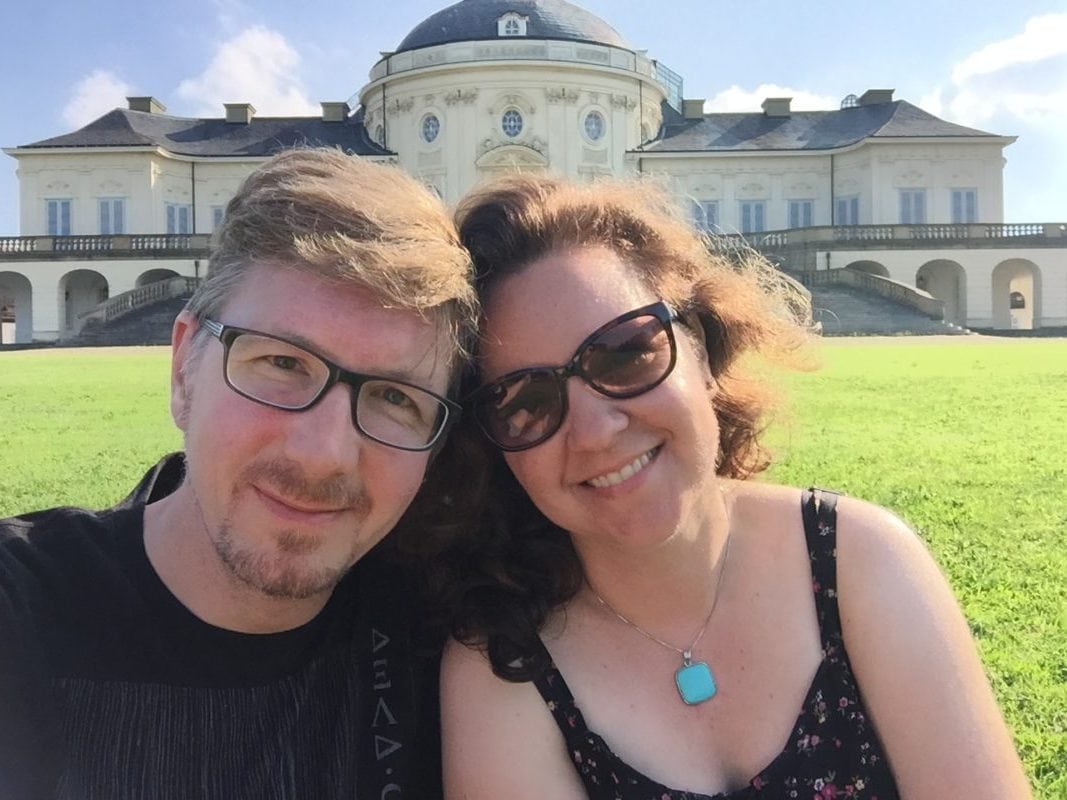
Hi, we’re Cate and Aaron, and we love helping people plan amazing trips to Germany. While Aaron has visited Germany several times (and is our chief rental car driver!), I lived there for 4+ years, have spent nearly 30 years of my life going back and forth between the US and Germany, and have traveled to all corners of the country.
I also taught German for several years and have a PhD in German Applied Linguistics, which means I’ve gotten to know Germany from several different angles. We’re so excited to help you plan your dream trip to Deutschland!
Overview of Regions
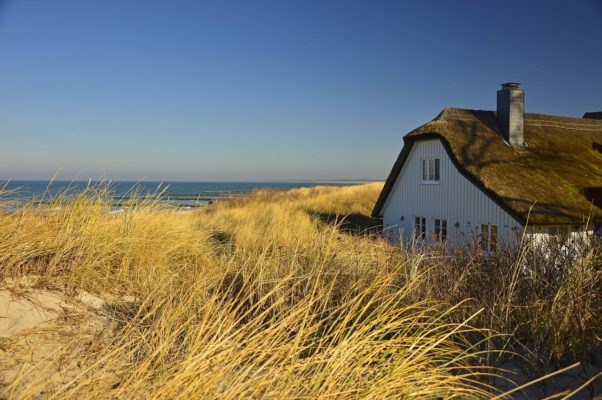
Northern Germany – Hamburg is the largest city in this region but there are other must-visit smaller cities like Lübeck , Stade, Bremen, and Lüneburg. Northern Germany also has the beautiful beaches of the North Sea and the Baltic Sea, the Wadden Sea national park, and the islands of Sylt, Flör, and Heligoland. Northern Germany is flat and great for biking. It looks so different from Bavaria! Combine a trip to Denmark with a visit to northern Germany.

Eastern Germany – Berlin is of course the feature city in this region, but Dresden, Leipzig, Magdeburg, Quedlinburg, Bautzen, Erfurt, and Weimar are smaller must-see cities. There’s also the Harz mountains, Swiss Saxony national park , Saalfeld Fairy Grottoes in Thuringia, Wernigerode castle, the Schwerin Palace, and Sansouci in Potsdam. Combine a trip to eastern Germany with a visit to Poland or the Czech Republic.

Central Germany – This region offers bustling cities like Cologne , Düsseldorf, and Frankfurt , smaller cities like Aachen, Wiesbaden, Koblenz, and plenty of cute villages. There’s also the Rhine and Mosel river areas, vineyards, the Eifel national park, castles , and beautiful rolling hills. Combine a visit to central Germany with a trip to the Netherlands, Belgium, Luxembourg, or France.

Black Forest/Baden-Württemberg – Stuttgart is the largest city in this region, and smaller cities like Baden-Baden, Heidelberg, Freiburg , Tübingen, and Ulm also warrant a visit. Vineyards and wineries, spa towns, castles (such as Hohenzollern or Lichtenstein ), waterfalls, Lake Constance, cute villages, and hiking are also features of the Black Forest /Baden-Württemberg region. Combine a trip to France or Switzerland with a visit to southwestern Germany.
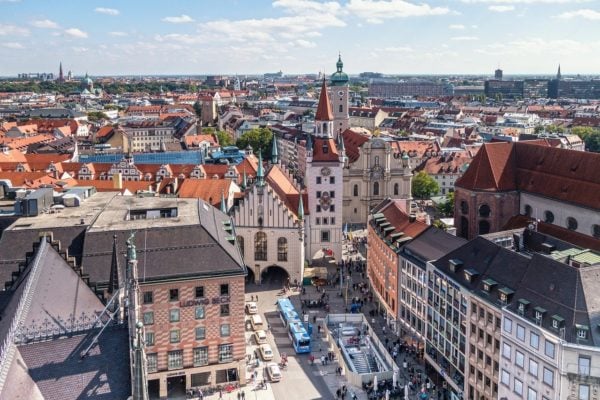
Bavaria/Alps – Munich is the feature city of Bavaria ( Oktoberfest! ), along with smaller cities like Regensburg, Nuremberg, Würtzburg, Bamberg, and Passau. There’s also the famous Zugspitze, Eagle’s Nest, Neuschwanstein castle , and Chiemsee lake, as well as lovely alpine towns like Garmisch-Partenkirchen and Berchtesgaden . Combine a trip to Bavaria with a visit to Austria, Czech Republic or Switzerland.
Click here for what to do in Munich!
Where to Go in Germany: Itineraries and Planning
There’s so much to see and do in Germany! Here’s some info to get you started on your itinerary (you can also check out this article with 10-14 day itinerary ideas ).
If you have just a few days, I recommend focusing on one city and a day trip (e.g., Hamburg with a day trip to Lübeck or Munich with a day trip to Neuschwanstein ).
If you have a week, you could visit 2 cities (plus 2 day trips) in different parts of Germany and allot one day for travel between cities (e.g., a few days in Munich with a day trip to Chiemsee, travel day to Berlin, then a few days in Berlin with a day trip to Potsdam). Or you could spend a week touring one region of Germany (e.g. the Black Forest or the Rhine and Mosel areas).
If you have two weeks, you can see a lot of Germany! You could, for example, start in Berlin, then visit Hamburg, take a day trip to Lübeck , then visit the Rhein river area, stop in the Black Forest , and end your trip in Munich. You could easily do this trip via train or car. Take a look at a couple 10-14 day itineraries we’ve outlined to give you a sense of how much you can do in that amount of time.
Grab our FREE Germany Trip Planning Checklist Now!
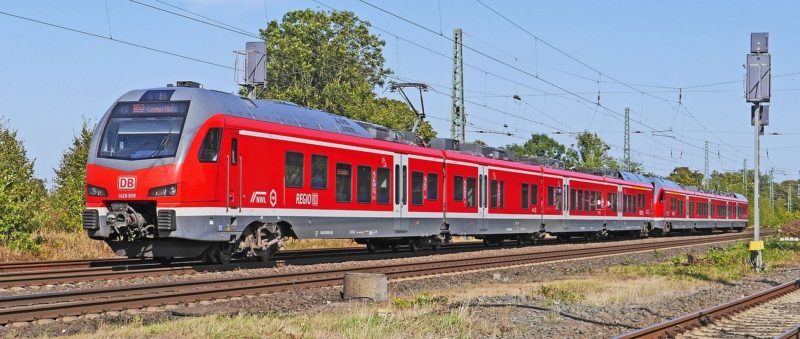
How long does it take to travel around Germany by train?
It’s quick and easy to travel around Germany by train. Here are some sample travel times to give you an idea:
- Berlin to Hamburg – 1 hour 45 minutes
- Berlin to Munich – 4 – 4 1/2 hours
- Hamburg to Lübeck – 1 hour
- Hamburg to Cologne – 4 hours
- Hamburg to Munich – 5 hours 40 minutes
- Frankfurt to Nuremberg – 2 hours
- Stuttgart to Munich – 2 1/4 hours
- Munich to Berchtesgaden – 2 hours
I use and recommend the official German rail system website to check travel times and book train tickets (point-to-point, saver tickets, and discounted regional tickets). I book all of our train tickets here!
Want more itinerary ideas? Are you a big city person? Check out…
- Cologne / Düsseldorf
Prefer smaller historic, picturesque cities? Check out…
What about cute little villages with “fachwerk” (half-timber) architecture there are so many here are a few ideas….
- Wernigerode
- Quedlinburg
- Dinkelsbühl
- Rothenburg Ob der Tauber
- Berchtesgaden
Looking forward to visiting fairytale castles?
- Neuschwanstein & Hohenschwangau (the “Disney castle”)
- Castles near Frankfurt
- Castles near Cologne
- 16 castles to visit in Germany
Like islands and water? Take a look at…
- Husum (North Sea)
- Timmendorferstrand (Baltic Sea)
- Lake Constance (Bodensee)
- Titisee
What about nature, hiking, and national parks? Consider…
- Schleswig-Holstein Wadden Sea National Park
- Hamburg Wadden Sea National Park
- Lower Saxon Wadden Sea National Park
- Jasmund National Park
- Western Pomerania Lagoon Area National Park
- Müritz National Park
- Lower Oder Valley National Park
- Harz National Park
- Kellerwald-Edersee National Park
- Hainich National Park
- Eifel National Park
- Hunsrück-Hochwald National Park
- Saxon Switzerland National Park
- Bavarian Forest National Park
- Berchtesgaden National Park
- Black Forest National Park
How about a road trip? Why not drive the…
- German Timber-frame Road (northern to southern Germany)
- Romantic Road (Bavaria and Baden-Württemberg, north/south)
- Castle Road (Bavaria to Baden-Württemberg, east/west)
- Wine Road (Palatinate wine region, north/south)
- Fairytale Route (from Hanau to Bremen, south/north)
- Black Forest High Road (Baden-Württemberg, north/south)
- Alpine Route (Baden-Württemberg to Bavaria, east/west)
- Volcanic Route (Rhein River and Eifel mountains, north/south)
Passports & Visas
If you’re from the US, Canada, Australia, New Zealand and many other countries, you do not need a visa to enter Germany (at the time of publishing this article). You do, however, need a valid passport with at least 3 months validity AFTER your planned departure date.
Play it safe and have MORE than 6 months validity on entrance to Germany! You also need at least 2 blank passport pages at the time of your arrival. Check your passport NOW so you have plenty of time to renew it if needed. Do not wait until the last minute to do this (been there, done that – it’s expensive and stressful)!
Germany is part of the Schengen zone, which means you can stay in Germany for up to 90 days without a visa. If you visit other countries in the Schengen zone before or after Germany, that counts towards your 90 days and reduces the amount of time you can spend in Germany. While on the automatic 90-day tourist visa you may not work but you can engage in business.
What’s the Best Time to Go to Germany?
The best time to visit Germany is whenever you can get there! No, seriously! There’s no best time of year for your Deutschland tour because there’s no bad time of year to visit. I’ve traveled all over Germany in spring, summer, fall, and winter and enjoyed every single season (Cate here, writing this article, by the way).
When should you travel to Germany? Well, it just depends on what you’re looking for…

Summer is when you’re most likely to have warm (even hot) sunny weather. But it’s not guaranteed. I’ve had hot steamy summers in Germany (like last summer when we traveled during a heat wave), cold rainy summers, and everything in-between.
Fortunately, even if you encounter rain in the summer it likely won’t last more than a few hours or at most a couple days before you’ll see the sun again. The benefit of summer travel is that you’ll have nice long days for sight-seeing because the sun doesn’t fully set until about 10pm. If you’re interested in beaches or mountains, summer is a great time of year to visit.
Note, however, that not all hotels, cars, and restaurants use A/C. If you really hate hot weather, play it safe and avoid Germany in the middle of the summer. (Although, to be honest, in all of the summers I’ve spent in Germany, there have only been a few days in the summer that I’ve found truly unbearable without A/C.) If you must have A/C, be sure to confirm that your room or rental car has it.
Summer can also be a more crowded time to travel, since so many families make use of summer break. Book accommodation early for the most options and best prices!

Winter travel in Germany can be cold but beautiful. One of my favorite times of year to travel in Germany is during the four weeks of advent at Christmas.
Yes, it gets dark early (by 5pm or a bit earlier) but the lights, decorations, and Christmas markets more than make up for it. Plus, you can go skiing and enjoy other winter activities.
I was just in Germany for a couple weeks in December and the weather was perfectly fine 90% of the time. There was only one day where the weather was truly miserable and even on that day there were enough breaks in the weather to enjoy my day trip exploring a new town and a new Christmas market.
Germans don’t let winter keep them from enjoying outdoor activities, hiking to strolling through a Christmas market or enjoying a coffee at an outdoor cafe. Don’t let it stop you, either! Just bundle up, grab a mug of Glühwein, and you’ll be fine!
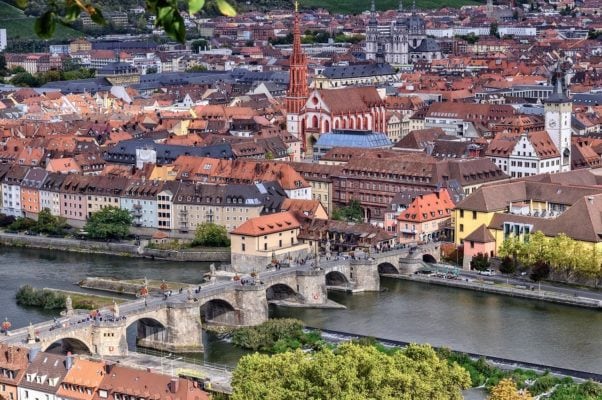
Fall and spring are also great times to visit Germany. In the fall you’ll enjoy crisp mornings and cool evenings and seeing the leaves change color.
In the spring you’ll experience the joy everyone feels when they can once again sit outside at cafes and restaurants. The weather can vary quite a bit day to day but if you travel late in the fall or early in the spring you can score great deals and will find smaller crowds.
Germany Booking Timeline
I’ve booked flights, accommodations , and tours and tickets a few weeks before my arrival, and I’ve booked them several months in advance. Book early if you:
- Are traveling during peak summer, Christmas market or ski season
- Have very specific travel dates or lodging, transportation, sight-seeing needs
- Are visiting big cities
- Are on a tight budget
- Are visiting during a special event, such as Oktoberfest
I usually start looking at my options as early as possible so I can figure out what a good deal looks like for my travel dates. I then set up flight alerts and start earmarking AirBnB’s and hotels. I begin booking whenever I find something that meets my needs and fits my budget.
Here’s a general booking timeline to get you started:
6-12 months in advance:
- Research and book your international flights
- Research travel insurance
- Plan your travel itinerary and dates
- Research and book flights within Germany or Europe
- Research travel options within Germany (rental car, train bus, etc)
- Research accommodation options (book if you find great deals or if availability is limited)
- Make sure your passport is up-to-date (you need at least 6 months left on it when you enter Germany) and apply for a new one if it isn’t
3 – 6 months in advance:
- Book accommodation
- Book trains or busses (usually 90 before your travel dates is the earliest you can book but always check if you can book earlier – the best deals go fast)
- Book rental car
- Book tours, events, and tickets
- Book travel insurance
- Review your travel wardrobe and gear and purchase the items you need
1 month in advance:
- Book any remaining attractions and tours
- Book airport transfers or plan how you will get to your lodging
- Purchase a sim card for phone or check how you can use your current phone service in Germany (e.g., I can use my Verizon phone service for a $10/ a day fee)
1 week in advance:
- Print out or ensure that you can easily access all bookings, tickets, and travel info on your phone (make sure you can access everything without data or wifi!)
1 day in advance:
What’s the Weather in Germany Like?
What will the weather be like when you visit Germany? Well, it depends on the time of year and where you are. Weather in Germany can be somewhat unpredictable no matter the time of year.
I recommend being prepared by wearing layers, packing an umbrella or rain jacket, and remembering that the weather will likely change soon. And, as I said earlier, don’t let any kind of weather stop you from enjoying Germany!
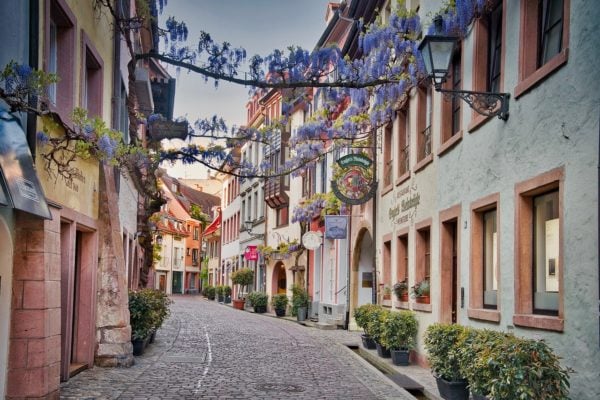
Summer. Germany comes alive in the summer with everyone and their dog (literally, there are dogs everywhere) outside enjoying the nice weather. Average high in the summer is 80F.
Be warned…it can rain in the summer but it doesn’t usually last that long. It can also be super hot in the summer…but again, scorching temperatures doesn’t usually last that long.
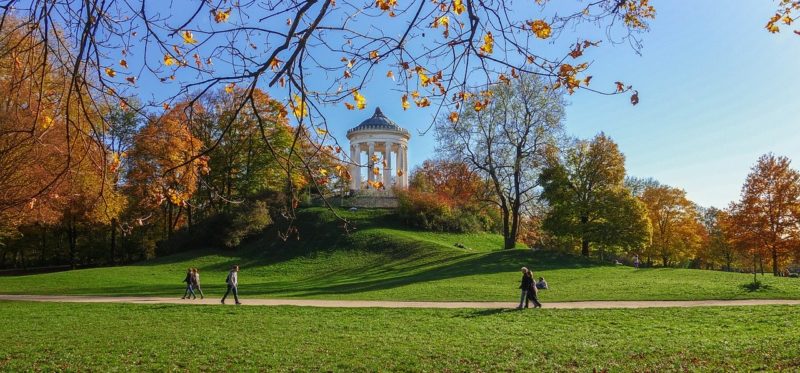
Fall. Such a beautiful time of year in Germany with the leaves changing colors and cool, crips mornings and evenings and warm days. One of my favorite times of year in Germany! In September, the average high is 67F and by November it’s around 47F.
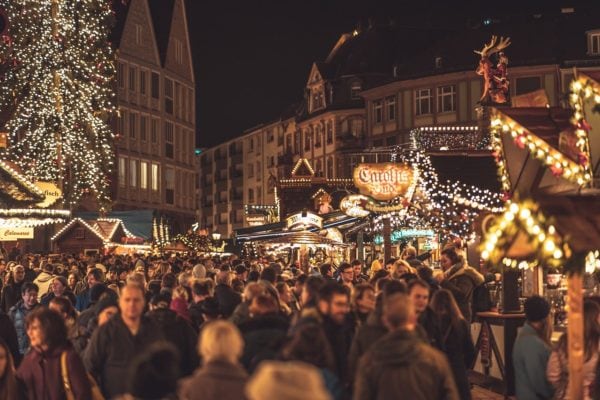
Winter. Bring your scarf, hat, and mittens because German winters can get cold! Average temps hover around freezing with warmer days in the 40s/50sF. While it can snow anywhere in Germany, you’ll find the most snow in southern Germany. Winter weather doesn’t mean everyone hides inside, though. On the contrary! Do what the Germans do – bundle up and enjoy the outdoors.

Spring. I love being in Germany on the first spring day because everyone heads outside to enjoy the sun and everyone is in such a good mood! Early spring will see a high around 47F but by late spring it’s more like 67F.
What Time is it in Germany Right Now?
Germany is in the Central European Time zone (CET) or UTC+2. It’s 6 hours ahead of the US EST, 7 hours ahead of CST, 8 hours ahead of MST, and 9 hours ahead of PST.
Daylight savings in Germany in 2020: time “falls back” on October 25 and “springs forward” on March 29. Write these dates in your calendar so you don’t accidentally miss any flights or trains (been there, done that)!

What’s the Best Way to Get to Germany?
It depends on where you’re coming from and where you’re going. When flying from outside Europe, many people fly into Frankfurt (FRA), the largest airport in Germany and one of the largest and busiest airports in Europe.
The benefit of flying into Frankfurt is that it has a ton of direct flights, and once you reach Germany you can easily take a commuter flight, train, bus or rental car to your final destination.
The downside? The airport is huge, busy, and I’ve noticed prices into Frankfurt have been higher than regional airports in Germany.
I used to always fly into Frankfurt , and then take a train, bus or rental car to my final destination. But recently? I’ve found that it’s easier (and sometimes cheaper) to bypass FRA and fly into other German cities, such as Munich , Hamburg , Berlin , Düsseldorf ( Cologne ) or Stuttgart .
You might even be able to find a direct flight from the US (I’ve flown direct Atlanta – Stuttgart and Washington DC – Munich, for example). Otherwise, you’ll change planes somewhere in Europe and take an easy 1-3 hour flight to Germany. We’ve changed planes in London, Amsterdam, Stockholm, Paris, and Vienna, for example. You could also fly into another European city and then take a train, bus or rental car into Germany.
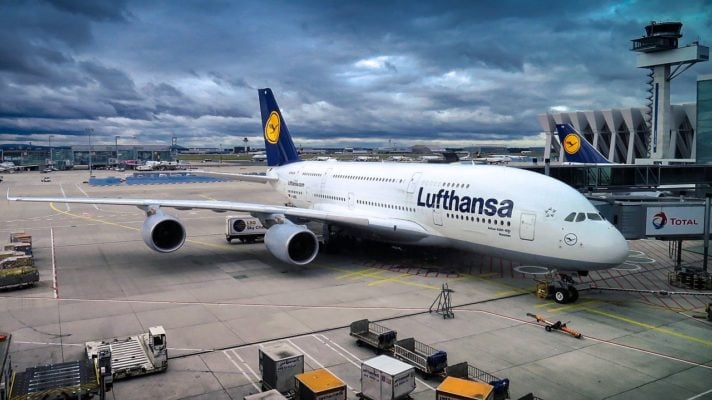
A Few Notes About Flying Into FRA (Frankfurt Airport) and Traveling Onwards
If you take a commuter flight from Frankfurt (FRA) to your final destination in Germany, you’ll go through passport control in FRA and then to your connecting gate. Super easy. Most flights from FRA to elsewhere in Germany are an hour or less in duration.
If you’re traveling onward by train from Frankfurt, you can transfer to the train right at the airport below Terminal 1. If your train leaves from the main station in Frankfurt, you can either take the S-bahn or a regional train from the airport to the Hauptbahnhof (main station) in about 10-15 minutes.
Important: you’ll find cheap “savings fare” train ticket prices if you book your ticket online well ahead of your arrival. Be sure to book your ticket for at least a few hours after your flight’s arrival time into FRA.
Be warned: getting through passport control, customs, picking up your checked luggage, and making your way to the train station can take longer than you think. And if your plane from the US (or elsewhere) is delayed…well, it’s easy to miss your train and have to buy a new, much more expensive ticket on the spot. Personally, I would book a saver fare train ticket for a train that leaves 3-5 hours after my international flight’s arrival time – at the minimum. And that’s still cutting it close if there’s any kind of delay!
Tip: If you want maximum flexibility and peace of mind, buy a “flex ticket.” You’ll pay more but these tickets aren’t tied to a specific train. So if your flight is five hours late, you can take a train later in the day without changing your ticket or losing money.
These tickets also you to stop somewhere en route to your final destination for a couple hours, and then get back on a different train (e.g., stop in Stuttgart for a couple hours on your way to Munich). So if you arrive on time, you can work in a short excursion on the way to your final destination (store your luggage at a locker in the train station). If your flight is late, just go directly to your destination. These tickets are also refundable before the first day of travel.
For ultimate flexibility and peace of mind, spend the night in or around Frankfurt and book a saver fare train for early the next morning.
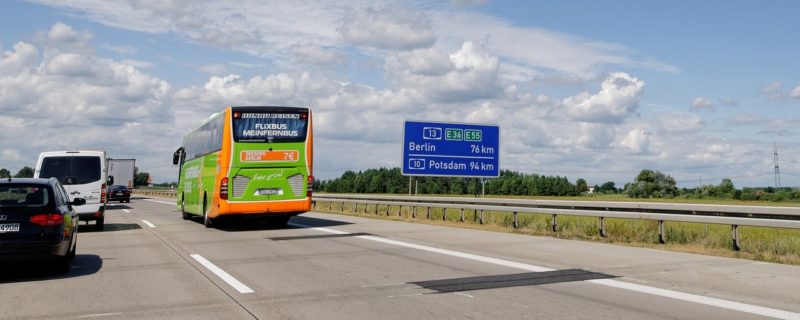
You can also easily pick up a rental car at FRA and drive to your final destination. Aaron and I have done this a few times and never had any problems.
The one problem we do have? Staying awake long enough to drive to our destination! We usually keep the driving distance to an hour or two on the day of our arrival and drink a lot of coffee. Sometimes we pull over at rest area and take a nap.
If you want to rent a car at the airport and are concerned about driving while jet lagged, consider picking up the car and then spending the night in nearby town, such as Wiesbaden (I spent an enjoyable few days there before catching my flight home a few years ago).
If you’re catching a bus from the city center to travel onwards, S-bahn 8 or 9 will zip you into town quickly and cheaply in about 10-15 minutes. Buy tickets at any of the ticket machines before you board the S-bahn.
You can also catch busses into Frankfurt and elsewhere in front of Terminal 1 (arrivals level) and Terminal 2 (level 2).
You’ll find taxis in the same general area. It takes about 20 minutes to get into downtown Frankfurt by taxi.
Flying to Germany from Elsewhere in Europe
These days it’s super easy and generally inexpensive to fly to Germany from all over Europe. Here are a couple tips:
When booking your international flight, you might be able to include a stop-over in the city where you’ll transfer to your Germany flight. I used to do stopovers in London, and a couple years ago I did an awesome stopover in Iceland. TAP also offers free stopovers in Lisbon or Porto.
I highly recommend looking into both flying and taking a train (or bus) into Germany, especially if you’re arriving from a neighboring country and not on a stopover. Of course, if you’re flying from cities like London, Barcelona, Rome or Oslo, flying is the best option. But if you’re traveling from Paris, Vienna, Copenhagen or Prague, for example, a train might be the better way to go.
Even if the actual flight is only an hour, you have to factor in the time it takes to travel to the airport, go through security, potential flight delays, and then traveling to your lodging once you land. A 5- or 6-hour train ride might actually take less time than a 1-hour flight when you total it all up!
Traveling to Germany By Train, Bus or Car
Traveling to Germany from other European countries by train, bus or car is easy. Train travel is generally simple, comfortable, and quick. Most train stations in Germany are located in the city center, so it’s easy to get to your lodging via taxi or public transportation.
If renting a car in another country, just double check that you’re authorized to take the car out of the rental country. If you are, you’ll have no problems crossing the boarder and driving around Germany.
Busses tend to cost less than trains, and you can find some amazing deals, but to be honest, I still prefer taking trains over busses. Trains are more comfortable, you can get up and walk around, and they’re almost always faster than busses. Plus, they don’t get stuck in traffic.
Tips for Booking the Best Flights with Cash or Miles:
- Start looking for flights early, especially if you’re traveling during peak season. I booked our mid-June flights in late January. While we found low mileage flights for very specific weekend travel dates, we could have found better flight times had we booked even earlier.
- Track flights through google or look at options in Hopper so you’ll know a good deal when you see one.
- Look for last-minute deals. When I decided to go to Germany in December I didn’t start looking for flights until early November (the trip was a last-minute decision). Because I was flexible on travel dates and went early in the month, I found excellent tickets using miles. This doesn’t always happen, but it never hurts to look for deals, even if your travel dates are right around the corner.
- Fly in or out of smaller regional airports (e.g., Berlin , Hamburg , Stuttgart , Munich , Düsseldorf). When I booked our flights for mid-June I couldn’t find anything into Frankfurt using miles. But I did find flights into Berlin and out of Stuttgart, and that actually worked even better for that trip ! For my recent December trip , I found that flying in and out of Stuttgart used the lowest amount of miles and had the best schedule. I’ve also flown into Hamburg and Munich airports.
Where to Stay in Germany
Germany has so many options for lodging:
- Vacation rentals (e.g., VBRO, AirBnB)
- Hip boutique hotels
- Quirky hostels
- More traditional HI hostels
- Large hotel chains
- American-styles hotels (Hilton, Marriott, etc)
- Family-run Pensionen (bed and breakfast)
- Camping (RV and tent)
When we’re in Germany we typically opt for AirBnB (I like having a kitchen to make breakfast) or a smaller family-run Pension or boutique hotel. We used to stay in hostels when we was younger (they’re pretty nice in Germany) but even then I found Pensionen to be very affordable – sometimes more affordable than hostels – especially when traveling with one or two other people. If we’re spending the night near an airport or train station and want convenience and ease we’ll stay at a larger chain hotel .
Whether you’re looking for luxury or budget accommodations, you’re sure to find what you’re looking for in Germany! To help you get started, check out our Germany hotel guides.

Breakfast is often included with lodging in Germany (but not always). Sometimes breakfast will feature fresh bread or Brötchen (delicious German rolls), cold cuts and cheese, butter and jam, and tea and coffee. Other times there will be an extensive breakfast buffet that includes things like yogurt, museli, a variety of breads, meats, cheeses, and even hard-boiled eggs. You’re unlikely to find things like omelets, bacon, pancakes, waffles, and hot oatmeal.
If you’re looking to save money on lodging, book rooms with a shared bathroom. (This is typically only an option in smaller or older hotels and not an option I come across as often anymore.) Sometimes that will mean sharing a full bathroom with other guests on your floor, and other times you’ll have a sink and/or shower in your room and will share a toilet located in the hallway. Shared bathrooms are more common in smaller Pensionen than in hotels.
These days I prefer the convenience of having a full bathroom in my room but I’m not averse to sharing a hall bathroom when needed (takes me back to my younger backpacking days – ha!). I’ve never had to wait to use a shared bathroom or had any trouble with them. Sometimes there are two or more bathrooms per floor. If you do opt for a shared bathroom, bring flip-flops!
Hostels can be a great option for families, as many offer family rooms. Hostels typically offer a simple breakfast and sometimes dinner. While accommodations are simple, some hostels can be in spectacular locations. The hostel in Bacharach, for example, is in an old castle on a hill and offers a gorgeous view of the town below and the Rhine river!
Getting Around Germany
One of the benefits of traveling in Germany is that it’s super easy to get around the entire country. You have so many transportation options.
You can rent a car and drive from place to place. Or you can stick to trains and busses. Or ride a bike – there are tons of bike paths throughout Germany.
If I’m primarily visiting big cities I prefer taking the train or a bus to get from one city to another. When I spend more time in smaller cities or want to take day trips to harder to reach places, I prefer having a car.
For our recent summer trip to Germany, we rented a car at the Berlin airport and returned it to the Stuttgart airport. We didn’t take trains or busses at all. We got a car so we could go to places that aren’t as easily (or quickly) accessible by train. We didn’t use the car every day, though. We walked and used public transportation when exploring cities.
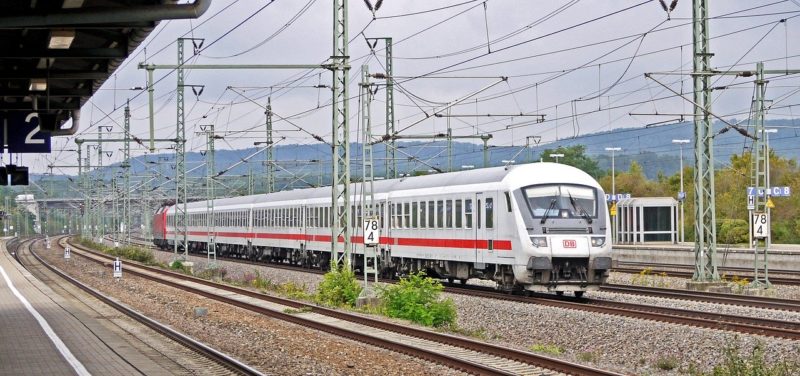
Speaking of public transportation, Germany’s is one of the best! It’s super easy to get everywhere you want to go via the S-bahn (above ground metro), U-bahn (underground metro), Strassenbahn (street car), and city bus. Taxis (and Uber/Lyft, where available) are also convenient options, though more expensive than public transport.
There are also car-share programs that you can look into. I haven’t used any of them and don’t know how convenient they are for travelers but it doesn’t hurt to check them out.
German cities are very walkable, so it’s easy to get around by foot. And, if you’d like to bike around like a local, there are lots of places to rent bikes (or scooters!) around town or maybe even at your hotel or AirBnB. If you’re more interested in just one afternoon of biking, try a city bike tour!
A few transportation tips:
- For the best train ticket prices book your ticket via the official German rail system website in well in advance. I book all of our tickets there. Note: if you pre-purchase your ticket at the lowest price you have to take the specific train you booked. If you miss that train, you have to buy another ticket.
- If you don’t mind taking slower regional trains you can get some really cheap tickets and regional day tickets. You may not want to use these tickets to go from Munich to Hamburg, but they’re great for day trips, whether traveling solo or with others.
- Busses are often less expensive than the train (though not quite as comfortable and often slower).
- There are Eurail options for Germany, and they’re a great choice if you value flexibility and ease or if you want to make stops while traveling (eg., stop in Cologne for a couple hours while traveling from Hamburg to Munich).
- If you plan to rely on public transportation in the cities you visit, buy a day pass (or perhaps a multi-day or week pass) rather than individual tickets. Also check to see if there are group day tickets or if young kids can ride free. Note: there’s often a small additional fee to bring a bike or a large amount of luggage on public transportation. There are often less expensive day passes for travel starting after 9am.
What to Wear in Germany
Check out my packing list for Germany!
Layer, layer, layer! The weather in Germany is often unpredictable so your best bet is to bring layers so you can customize your wardrobe on the fly. Since rain is a possibility any time of year, you may want to bring a light rain jacket or an umbrella.
Bring comfortable shoes. You’ll no doubt walk all day long (often on cobblestone), so bring your most comfortable, supportive shoes. Be sure to break in your shoes before you travel. There’s nothing worse than realizing a day into your trip that your shoes pinch your toes or give you huge blisters. (Bring along moleskin, just in case. I always have this kind in my day bag!) I typically bring a good pair of walking shoes appropriate for the season (e.g., boots in the winter) and a nicer pair of flats (sandals in the summer).
You can wear jeans. Some people say never travel with jeans but I’m not one of those people. I love traveling with jeans! They’re comfortable, I can wear them a few times without having to wash them, and I feel less like a tourist wearing them because everyone wears them. If you like jeans, wear jeans.
Scarf, hat, gloves. If you’re traveling in the winter or even late fall or early spring, definitely bring a warm scarf, hat, and gloves or mittens. Or buy them in Germany and take them home as a souvenir! Almost all of my winter accessories are from Germany. Even if you’re not traveling in colder weather, I recommend a travel scarf with a hidden pocket for ease and security.
You can wear shorts in the summer. Shorts are more popular in Germany than they used to be, so if you like them and are comfortable in them, wear them. That said, do also bring summer dresses or skirts and or lightweight pants to wear when shorts are too informal.
Bring a comfortable day bag or purse. When you’re out and about all day you want a comfortable bag or purse to hold your travel essentials – wallet, phone, camera, ipad/kindle/book, umbrella, journal, etc. For peace of mind, you may even want one with special security features. Click here to read my guide for buying the best travel purse.
My Absolute Favorite Travel Clothing Items
Merino wool camisole/tank – These camisoles are the BEST for travel! They’re soft, comfortable, easy to hand wash, and they never stink. This might be TMI but a few years ago, when I was traveling solo around Europe, I wore the same merino wool tank each day for 14 days in warm spring weather. It never smelled bad! Since that experiment I don’t typically go that long without washing my tanks, but I like knowing that I could! Click here to read more reviews and buy a merino wool camisole/tank.
Foldable flats – I splurged on a pair of foldable leather flats a few years ago, and after I broke them in I started really liking them. I wouldn’t recommend them for a full day of walking (especially on cobblestones) but I like to bring my foldable flats along for a change of pace or when I want the option of wearing a cute pair of shoes but don’t want them to take up much space in my suitcase.
Merino wool shoes – I bought a pair of dark grey merino wool walking/tennis shoes a couple years ago and I LOVE them! I can wear them barefoot in the summer, and not only do my feet stay relatively cool, my shoes don’t stink when I take them off at the end of the day. I can throw them in the wash if they get dirty (though mine still look great 2 years later), they pack flat and don’t take up much space in my suitcase or travel backpack, and the heel is thick and cushioned. You can also buy replacement merino wool insoles without having to buy a new pair of shoes.
What I don’t like: the pair I have doesn’t have enough arch support for me and there’s not enough padding under the ball of my foot. The first few times I wore them they were uncomfortable after walking all day and I was super disappointed! But after adding an arch support and a gel insert under the ball of my foot (I like this one ) I loved them and now wear them all the time while traveling and at home. Many people love them from the start! Click here to to read reviews and check out merino wool shoes.
What to Eat in Germany
You’ll never go hungry while traveling in Germany! While you can always find traditional items like Schnitzel, Spätzle, Rouladen, and Bratwurst, there are plenty of healthier options, including those that are vegetarian, vegan, and gluten-free.
Many restaurants now cater to special diets and accommodate allergies, as do some specialty grocery stores. Aaron has a meat allergy and frequently eats gluten-free and has never had a problem finding delicious food in Germany.
These days Germany has a wide variety of restaurants to ft all budgets featuring cuisine from all over the world (except Mexican…I’ve yet to find good tacos in Germany). So you won’t be stuck eating Schnitzel every day – unless you want to!
We usually eat breakfast at our AirBnB or hotel, enjoy a nice lunch at a restaurant we’ve stumbled upon, and then grab a Döner, salad or pizza for dinner. We also often picnic using ingredients from the bakery and grocery store or farmer’s market.
Traditional German dishes to try: Schnitzel, Spätzle, Rouladen, Bratwurst, Sauerbraten, Schweinehaxen, Maultaschen, Currywurst, Leberkäse, Flammkuchen, Sauerkruat, Kartoffelsalat (potato salad), Quark, all kinds of German breads.
Quick lunches and snacks on the go: Döner, Falafel, Bratkartoffeln (fried potatoes), Kartoffelpuffer (potato pancakes), Bratwurst, Currywurst, salads, Brötchen filled with meat and/or cheese, fresh pretzels, pastries, cakes. Click here to see the best German street food!
Desserts & sweet treats: Schwarzwälderkirchtorte (Black Forest Cake), Bienenstich (Bee Sting Cake), cheesecake, Stollen, Frankfurter Kranz, cake, Donauwellen cake, Berliner, Lebkuchen, Pflaumenkuchen (plum cake), all kinds of pastries and chocolate – just to name a few! Click here to see the 10 must-try German desserts and sweets.
Beer: every kind you could ever imagine! I usually just ask for the local beer unless there’s a specific one I know I want to try.
Christmas: This is the best time of year to be in Germany, partly because of the many delicious holiday treats like Lebkuchen, Stollen, Glühwein, and so much more. Click here to read more about what to eat in Germany during the Christmas season.
Want to try German food now? Click here to see where to buy delicious German food online!
Got a question about traveling in Germany? Join our free Germany trip planning community or send us an email!
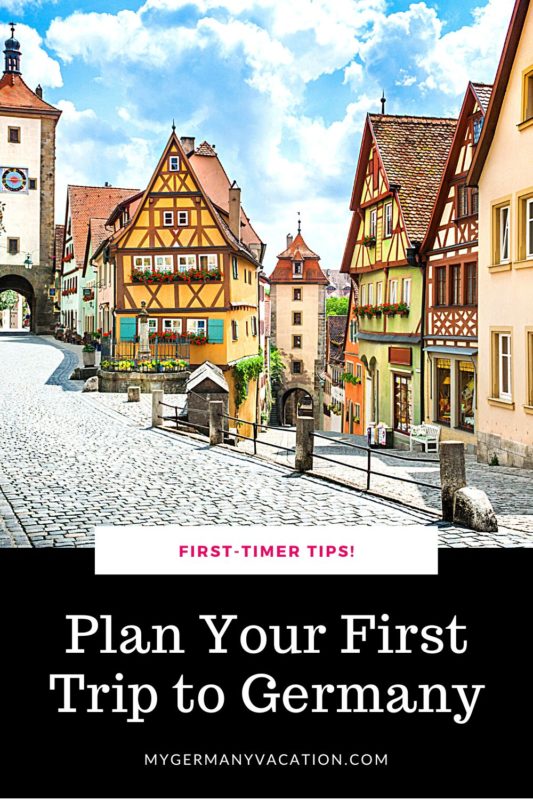
Cate has been traveling to Germany for 30+ years. She has lived in Germany, taught college German, and has a PhD in German Applied Linguistics. She loves helping travelers plan their dream trips to Germany!
Similar Posts

How to Visit King Ludwig’s Fairytale Castles in Bavaria, Germany

15 Best Germany Travel Guides

Stuttgart Christmas Market Guide for 2024

28 Top Things to Do, See and Experience in Cologne, Germany in 2024

Best Hotels Near Neuschwanstein Castle & In Füssen
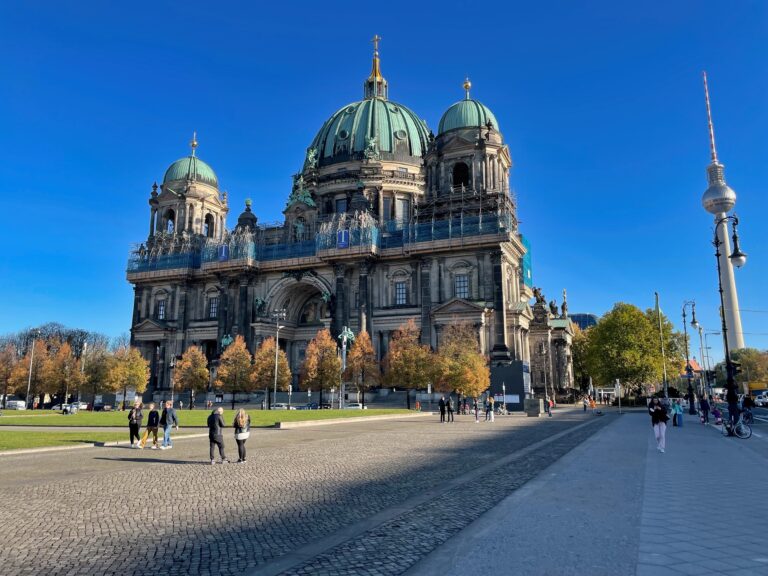
Summer in Germany: 19 Beautiful Places to Visit & Things to Do
Here’s how we can help you plan your perfect trip in 2024.
GERMANY TRAVEL PLANNER: Just getting started? Have questions about Germany’s confusing train tickets or how to find the best guided tours? Not sure which parts of Germany should be in your itinerary (and what to leave out)? Our Germany Travel Planner answers those questions and more via how-to videos, our interactive Germany Planning Map, City Cheatsheets, and MUCH more. Click here to unlock the best of Germany the easy way!
GERMANY TRAVEL CONSULT: Feeling overwhelmed? Itinerary just not coming together? Wonder if a few tweaks would take your trip to the next level? Book a Mini or Full consult with Cate! She’ll help you create or tweak your itinerary, recommend train tickets/passes, hotels, things to do, guided tours, show you how to buy train tickets, orient you to specific cities, help you plan out day trips, and answer your Germany travel questions.
ACCOMMODATIONS: We recommend using Booking.com since they have widest range of accommodations available from hostels, boutique hotels, luxury chains, aparthotels, at the best prices. Check out our accommodation guides for specific recommended hotels.
WHAT TO PACK: If you’re bringing your phone, be sure to bring this plug adapter , this power bank , and this wrist strap . They’ve been lifesavers for us! You can see our other packing essentials here and here .
TICKETS & TOURS: For guided tours, day trips, private tours, and skip-the-line tickets, Get Your Guide is our go-to!
TRAINS & BUSES: To research train schedules and buy tickets or a Germany Rail Pass, we recommend the official Deutsche Bahn (German Rail System) website (and download their DB Navigator app). For buses, look at FlixBus , which offers tickets for routes within Germany and to other European countries. FlixBus is often cheaper than trains but can take longer.
69 Comments
I enjoyed reading this information. My husband and I would like to stay in Germany for 2 to 3 months in 2022. I am interested in staying in the area of Bamberg with the plan of visiting other regions in Germany via a rental car. Either at the end or beginning of our stay we would like to visit France (especially Paris). I have so many questions. But our hope is to have basically our last trip on our own and experience more of the everyday lifestyle. Up to this point we have only traveled via being guest of Viking River Cruise and tours.
Hi Donna! 2-3 months in Germany sounds awesome! Since you’ll be there so long, you might want to consider spending 1 month in 3 different regions or 1.5 months in 2 regions. Otherwise you’ll be doing a lot of overnight or multi-night trips if you want to see other regions. Are you thinking about renting an AirBnB? If you want to experience the everyday lifestyle, I highly recommend it. Feel free to email me if you have questions as you start planning. 🙂
Hi! Thank you for this awesome post. It’s very useful. I wanted to ask you a question. I’m planning to travel to Germany as soon as the pandemic starts to be less dangerous. I want to go to Germany for 2 months, how many cities do you think is possible to visit? And also how much money do you think is possible to use everyday for food if my budget is small? Thank you very much!
Hello! Two months is a good amount of time to visit Germany, and you should be able to see and do quite a lot! Just how many cities depends on how quickly you like to travel and what you want to do in each place (e.g., just see the highlights or live like a local). If you want to stick to big cities you could spend 1-3 weeks in each and take lots of day trips to see the surrounding area.
If that’s the case, you could rent an Airbnb (or similar), which would not only save you money on lodging (they’ll often give discounts for stays of 1 week or longer) but also make it easier to make some inexpensive meals at the Airbnb (and it’s easy to make German dishes “at home”!) and maybe even do laundry for free.
If you want to be on the go the whole time, moving from city to city (big, medium, and small), it will be more expensive unless you stay at hostels (or super cheap hotels). And remember to factor in the constant packing and unpacking, time getting to/from the train station (or airport)…that gets tiring when traveling for a couple months!
I recommend coming up with a budget, then looking at what kind of lodging fits that budget (hotels, hostels, longer Airbnb stays, Couchsurfing, etc). Then think about what you most want to do in Germany (live like a local, just spontaneously explore, see specific sights, have specific experiences, etc) and what you want your daily experience to be like (e.g., do you want to feel relaxed each day and get to know fewer places or be on the go, packing and unpacking, moving from place to place). Neither is better than the other, it’s just important to get clear on what kind of experience you want!
A few ways to reduce your budget: – Eat in fewer sit-down restaurants. Eat breakfast at “home”, buy snacks and drinks at the grocery store and bring them with you each day, cook some meals each week at “home”, pick up lunch from a grocery store or bakery and eat in a park, etc. Make eating dinner in a sit-down restaurant a special occasion. Doing these things will save you money and you’ll eat healthier!
– Take busses or slower trains to travel around Germany. There are regional train passes you can purchase that allow travel in a specific area very inexpensively. Travel will be slower and there are some restrictions on when you travel (often not during rush hour) but you’ll save money and often you’ll see some out of the way sights. You can also get good deals on flights but once you factor in travel to the airport (time and cost), time to check in, waiting to board, potential delays, and then getting from the airport to your final destination, it’s often just easier to take the train.
– Buy standard train tickets in advance. You can get nice discounts on faster train tickets if you book far enough in advance.
This might be more info than you wanted but I hope that helps you start planning your trip! Let me know if you have any other questions. 🙂
- Pingback: Europe Through the Seasons: The Best Time to Visit - Intentional Travelers
Great post full of detailed information on all aspects of travel in Germany. When travel reopens in Europe we’re planning on a 2 week trip in Germany with our adult son. He’s an avid soccer fan so we’ll need to plan the trip around the soccer schedule so he can see as many games as possible. We are considering Eastern Germany with a short trip into Poland or Northern Germany with a few days in Denmark. We’d really appreciate your expertise and suggestions. Although we’ve traveled extensively in many western and eastern European countries, we have not spent a great deal of time in Germany. Thanks. J.
Hello! I’m back working on this site now and am happy to help. I’ve got more articles and resources coming but let me know if you have any specific questions!
Hi Both The Ueckermann family 9-10 adults and 2 little once to experience Germany in Oct 2023. Central G and Netherlands will be awesome. We need to do all planning and funds estimates please assist. We live in South Africa and hopefully COVID 19 not a factor any more. Plan 2-3 weeks depending on the funds regards Engela
Hi Engela! Let me know if you have any specific questions about planning your trip to Germany. Happy to help!
HI, I was having trouble with your email 🙂 so sorry I am just replying here. I was hoping you could help us and I wasn’t sure if you offer buying tickets and guidance of our specific places we would like to visit. Anxiously wanting to hear back from you, Anne
Hi Anne! I just sent you an email. 🙂
Hello Cate! Such a well written article with great info! My husband and myself would like to travel to Germany in Oct. of 2022, possibly with my then 16 year old son as well. We want to go in October so we can also experience Octoberfest. I cant have beer because I have celiac’s. IS THERE OTHER ALCOHOL DURING OCTOBERFEST OTHER THAN BEER? WHAT IS THE WEATHER IN OCTOBER AND DOES OCTOBERFEST RUN THE FULL MONTH? IS THERE A CERTAIN AREA WE SHOULD STAY TO REALLY EXPERIENCE OCTOBERFEST AND ANY POTENTIAL ISSUES TO AVOID DURING OCTOBERFEST? We are overwhelmed with planning our trip because we don’t even travel within the US and I feel like there’s so much we want to experience in such a short period. We would like to go for 2 weeks. We want to go because both our families are from Germany. My family comes from Nuremburg (sp) and my husbands family Bavaria but we are unsure which part. This trip is important for us to try to learn about our family roots. DO YOU KNOW WHERE WE COULD GO IN GERMANY TO LEARN ABOUT OUR GENEOLOGY? We would like a more of a laid back approach to experiencing Germany. I dont want to necessarily feel rushed every single day but I do understand that some events and places we would want to visit would need to be scheduled and we are ok with that. I would like to do the Air bnb but know nothing about them. I would like less stress worrying about transportation such as missing busses. We are interested in castles, picturesque views, experiencing floating on the Rhine River perhaps. ANY SUGGESTIONS ON AIR BNB’S THAT PROVIDE BREAKFAST AND ANY IDEAS ON AREA’S TO VISIT BASED ON EVERYTHING I’VE PROVIDED? P.S……our last name literally translates to “the German”. We have had so many Europeans tell us that when they hear our name…LOL
CORRECTION: This is Lisa Nemec. My hubands family is Bohemian. We believe his family crossed over from Czech.
Hi Lisa! There are plenty of other drinks at Oktoberfest, both alcoholic and non-alcoholic, so you shouldn’t have any trouble finding something. The weather at that time of year can vary but in late September to early October it’ll likely be warm during the day and cooler in the evening. Oktoberfest is mostly held in late September but I believe it goes until Oct 2 in 2022. There are a lot of hotels and AirBnB’s within walking distance of Oktoberfest (also walking distance to downtown) but book early because they fill up quickly! You’ll also pay a premium at that time of year. Some people prefer not to stay near the main train station but other people don’t mind it.
As to where you could go in Germany to find out about your genealogy, I’d start by searching the genealogy sites online and get as much specific info as you can. You can then try a site like http://www.genealogienetz.de/index_en.html (I haven’t used it, just found it).
If you have 2 weeks, you could fly in and out of Munich and focus on Bavaria. While in Munich you could take a couple day trips to Salzburg, Berchtesgaden, Neuschwanstein, the Alps, etc. You could see a lot at a laid-back pace in 2 weeks!
AirBnB’s are great if you’re going to be somewhere for at least a few days, want a little extra space, a kitchen, etc. Even just being able to make breakfast, coffee/tea, and keep drinks cold for when you come home in the evening is so nice. But you don’t typically get hotel-like services like a prepared breakfast, new towels each day or linen changes. If you want to be walking distance to lots of things in Munich, a hotel near downtown could be a great option. If you’re ok with being in a neighborhood, an AirBnB could be a good choice. There are so many great neighborhoods in Munich so you really just need to look at price, amenities, and distance to the things you want to see. I’ve stayed at hotels near Marienplatz and in an AirBnB further away (maybe a 10-15 minute walk + U-bahn ride to Marienplazt) and I enjoyed both.
I hope that helps!
- Pingback: 12 Most Popular German Drinks & Beverages You Must Try In Germany | travel-boo | Portugal & Spain Travel Blog
HELP……I have been put in charge of coming up with an itinerary for my hubby and 4 of our friends for travel in July 2022. I truly have no idea what I am doing. What we are looking for are castles, beautiful scenery and history (although I have been told that they do not want to go to concentration camps). The following is the tentative itinerary I have come up with. We are looking also, for moderate priced Inns/quaint hotels and castle stays centrally located. Any changes/suggestions/comments would be GREATLY appreciated. We will be renting 2 cars. 1 night Munich drive to Nuremburg 3 nights Nuremburg – drive to Fussen 1 night Fussen – drive to Ettal 3 nights Ettal – drive to Unterwossen 1 night Unterwossen – drive to Salzburg Austria 3 nights Salzburg Austria drive to Munich 1 night Munich – fly home
Hi Linda! Your itinerary looks good for a 2-week trip. Here are few suggestions:
-If you’re flying into Munich, you could drive right to Nuremburg on the first day, since it’s only a couple hours drive from Munich airport. If you pick up your car, drive into Munich, settle into a hotel, and then drive to Nuremburg the next day, you’re using a lot of time for driving/checking in/unpacking/packing and you won’t get to see much of Munich. If you go right to Nuremburg on arrival day and stay for 3 nights, you could add a night to the end of your trip so you have 2 nights in Munich or add a day to Salzburg and keep Munich at 1 night.
-Fussen and Ettal are pretty close to each other so you could stay 3-4 nights in one and then take a day trip to the other. I like to reduce the number of one night stays as much as I can during 1 and 2 week trips for the reasons I mentioned above. You could also stay in Ettal and make day trips to both Fussen and Unterwossen and cut out 2 1-night stays.
-If you don’t want to see Munich, I’d keep that at 1 night and stay near the airport at the end of your trip. If you do want to see Munich, I’d give that 2 nights minimum.
I hope that helps! I think you’ll really enjoy your itinerary!
- Pingback: Can I Go to Germany Right Now? (Your COVID-19 Questions Answered) - My Germany Vacation
Thankyou for all the wonderful suggestions! I’m visiting Germany closer to Christmas for two weeks.
That’s my favorite time to be in Germany! Everything is so beautiful and festive. You might be interested in my Stuttgart Christmas Market article – even if you won’t be near Stuttgart, it will give you an idea of what you can do, see, and eat at any Christmas market. I also talk about 6 other nearby Christmas markets that are super fun to visit. 🙂 Enjoy your trip!!
I had all but given up on our delayed 25 yr Wedding Anniversary(07/28/2020 delayed to Sept 2021, due to covid) trip to Germany. Then I found your website! It reinvigorated our desire to NOT CANCEL our plans! We have a son in Kaiserslautern(rhein main air force base) , and want to split a 2 week trip between seeing 7-8 days traveling in Germany( Berlin, Munich, Cologne, and Stuttgart) and Paris. And then 6 to 7 day visiting our son. We had all but given up, until I read your article. Thanks! I wish that there were some way to have everything planned for us in advance! But, your post at least has assured us that we can make this happen on our own. Thank you very much!!
Definitely don’t cancel your plans, even if you have to postpone! (We had to postpone our anniversary trip, too – such a bummer!) You can definitely make your trip to Germany happen. Here are a few ideas for you…
You could fly into Paris, then travel to Kaiserslautern to see your son and do a day trip to Stuttgart (visit the Christmas market if you’re there in December or nearby Esslingen any time of year) and then either visit Munich and the area around there (fly out of Munich) or travel up to Cologne and over to Berlin (fly out of Berlin).
It’ll be a lot to try to see Paris, spend several days in Kaiserslautern, and also see Cologne, Stuttgart, Munich, and Berlin but if you can combine things – like if your son can go with you to visit Stuttgart and Munich or Cologne and Berlin, you could see a lot of the places you’re interested in. Flying into one city and out of another will help a lot, too.
You could also fly into Munich, then go to Kaiserslautern via Stuttgart, take a short trip to Paris, then go to Berlin via Cologne and fly out of Berlin. Or do the same but start in Berlin and fly out of Munich.
You’ll have a great time no matter your itinerary! 🙂
Your website is a such a great resource! I have a ton of questions about planning a trip, I’m just going to send you an email.
Thank you Komal
Got it and replied 🙂
What is a good budget for 2 adults in Germany for two weeks?
It’s nearly impossible to give a guideline because it depends on so many things – your travel style, what kind of transportation you want to use, your accommodation & restaurant preferences, etc. I know that’s not very helpful in the short-term but it would be less helpful for me to give you a specific budget not knowing any specifics about you or your trip plans. Plus, most travelers like to splurge in one area and cut back in another but that’s so different for each traveler.
What I recommend is this: start looking at flights, transportation, and accommodations well before you want to book them in order to get an idea of what each costs for your travel dates. Add everything up for 2 weeks and then decide if you’re ok with that amount so far, keeping in mind you’ll still need to add on food, souvenirs, tickets/tours, insurance, and anything you need to get before you leave (clothes, luggage, passport, etc). I like to do this research before I book flights/transport/accommodations. That way I get an idea of what will be my splurge and where I will need to reduce costs to keep within the budget that’s right for me. Everyone’s ideal budget is so different!
hi i am planning to travail to Germany in December 2021 with my family , any idea
My big tip for Germany in December: visit the Christmas markets (if they’re open this year)! You’ll find one in nearly every German city, town and even small villages. They’re outdoors so dress warmly and enjoy the food, drink, and stalls. They’re a great place to pick up souvenirs and gifts, too.
Days are short in December, and some touristy sites do shut down in winter, so keep that in mind. But you’ll still find plenty to do after dark, especially if you’re in bigger cities. As long as you take these two things into consideration, you’ll have a great visit no matter where you go!
Hi, my partner and I are wanting to visit Germany in January 2022. I have previously stayed in Wurzburg for 3 weeks and dream of taking my partner there.Seeing as I went with school a few years ago we didn’t really have a chance to look around other parts of local Germany. Where would you recommend us to go whilst in that area? We like architecture (but not too much…) we’re in our 20’s so we also want to have fun 🙂 we’ll either be driving (we live in France) or we’ll be going by train. Will the Christmas markets still be on? I doubt it but you never know… Thanks
Also, we are wanting to go with our dog. Would that be possible or too complicated?
You could easily go to Munich and spend a few days there – lots to see and lots of places to have fun. (I had a great time there in my 20s!) There are also a lot of day trip options – Berchtesgaden, Salzburg, Neuschwanstein, Passau, Regensburg, etc. You could also stop in Nuremberg on your way to Munich. All of that is easy by car or by train – and if you go by train, you could probably do those day trips using a regional train pass. Or you could do guided day trips and not have to plan anything! I’ve got some listed in my Munich guide – https://www.mygermanyvacation.com/munich-travel-guide/
It looks like the Christmas markets are on for 2021 but they could always get canceled in the coming weeks. Most have their last day on Dec. 24 so unfortunately, you won’t get to see them if you visit in January. That just means planning another trip to Germany for December 2022! 🙂
Germany is pretty dog-friendly so it’s probably do-able. But there are likely museums and other sites that might not allow dogs inside. If you mostly want to spend time outdoors, and your dog is ok with possibly very cold/wet/windy weather, or if you can leave the dog at your lodging for part of the day, it might work ok.
Hope that helps!
Hi Cate, you have put together a terrific planning guide. Thanks. Our 4 children just gave us a trip back to Germany in celebration of our 50th wedding anniversary. We lived in Erlangen from Aug 1972 – 1973. We are excited to go back but we are debating between a Rhine river cruise or going on our own. We’ll probably go sometime in May/June or Sept/Oct 2022.
How exciting!! It’s so fun to go back and revisit where you used to live in Germany. Aaron and I did that in 2019 and had such a good time seeing what had/had not changed. I’m excited for you!
I’ve heard people say great things about Rhine river cruises. If you don’t have time to or don’t want to do much trip planning, that’s a great option. The downside is that you’re more limited to what you can do and see. If you have time and interest in planning your own trip, you can definitely do it. And since travel is coming back, I’ll be focusing on this site a lot more in the coming months and helping people plan their trips, so I’ll be here to help you, too. 🙂
Hi Cate, We have wanted to visit Germany (from the US) for a few years now and have finally decided to make it happen, but had no idea where or how to start. Your article is full of valuable information. Thank you. At least we now have a starting point. Our trip isn’t for another year, but it will go quickly. So excited and thank you for all the information.
You’re welcome! I’m so excited for you already. 🙂 The next year will fly by and you’ll be on a plane bound for Germany before you know it. Now that travel is coming back, I’ll be focusing on this site a lot more so be sure to come back when you’re ready to plan your trip. I’m working on lots of guides and helpful resources! 🙂
Hello. My grandfather expressed interest in going to Germany in 2022. More specifically, he wants to go to ‘The Battle of the Bulge’ where his older brother passed away in World War II. We would also like to go to the Holocaust Memorial. I have been trying to research/plan this trip but would be open to suggestions. We are from the US and could spend about a week out there. I am grateful that I stumbled across your blog as it is very informative and interesting! 🙂
Hello! That sounds like it will be a wonderful trip for your grandfather! If you’re talking about visiting the Holocaust Memorial in Berlin (highly recommended), you could fly right into Berlin (their new airport!) and spend half of your time seeing the city, then head to Brussels and take a Battle of the Bulge day tour! I found one here that you can look at (aff link): https://www.getyourguide.com/bastogne-war-museum-l35043/bastogne-battle-of-the-bulge-tour-from-brussels-t169657/?partner_id_Y5UOFLS It looks like it also goes into Luxembourg so you could get 3 countries in one trip. 🙂 If you have enough time, you could take a day trip to Brugges or Ghent – both are 30-60 minutes from Brussels. You could then fly out of Brussels back to the US. To get from Berlin to Brussels you’d probably want to fly but it’s a short flight and you could probably get an early morning or a late afternoon flight so it wouldn’t take up your whole day. Hope that helps with your planning!
Hi, your site is wonderful and has some great information! I am traveling (solo) to Germany in late April and will be there for one month. I have been to Munich/Bavaria/Salzburg before so I’d planned on focusing my trip on the rest of Germany. I’m flying into Berlin and was planning on staying there 4-5 nights, then I’m not sure where to go. I was thinking of spending a week in an area and going on day trips; for example, the Black Forest, the middle Rhine area, maybe Harz Mountain. But I also want to see some cities like Cologne, Frankfurt, Heidelberg, Trier, and Hamburg. So maybe a bit of both cities and countryside? Do you have any thoughts? Thanks!
I definitely recommend choosing 3-4 locations where you can stay for a week or so and then take day trips. You could do longer stays in Berlin and Hamburg – there’s tons to do and see in each city, as well as lots of day trip options. You could also do Cologne or try a smaller town on the Rhein or Mosel and explore that area in more depth. For the Black Forest you could stay in the university town of Freiburg and day trip to towns/hiking in the Black Forest, as well as Basel and Colmar/Strassbourg). You could also choose 3 locations for longer stays (e.g., Berlin, Hamburg and Freiburg) and then do a couple of 2 or 3-night stays as you travel between cities, e.g., a short stay in Wernigerode or Quedlinburg (Harz mountains), Trier, Heidelberg, Stuttgart, or Tübingen on your way to Freiburg. Tip: if you want to do a lot of day trips, make sure you stay where it’s fairly quick and easy to get to the train/bus station! Since you’ll be there for a month you have lots of flexibility and plenty of time to do and see a lot of the areas you mentioned!
@Cate, Thank you so much! I’m really enjoying going through your site, too!
Looking for a good travel guide book for Germany any recommendations?
Rick Steve’s is always a good one! I’ve used his guidebooks a ton. You can get his Germany guidebook on Kindle or as a hard copy (aff link): https://amzn.to/33z7d59
@Cate, Thanks
So excited to find your site! My husband and I will travel from Texas to Bavaria for 7-10 days in September. I am in charge of all the planning. I’m thinking Munich & surrounding area and Salzburg. Do you have any suggestions? I’m also pondering some organized day tours..
Munich is a wonderful home base for seeing lots of great sites in Bavaria! You could easily spend 1-3 days in Munich (especially if you’re there during Oktoberfest) and then take day trips to places like Neuschwanstein, Garmisch-Partenkirchen, Salzburg, Linderhof, Chiemsee, Berchtesgaden, Nuremberg…just to name a few! You can easily do all of that by train and mix it up with some organized day tours here and there. I’ve been working on a Munich guide that will have ideas for day trips and tours so keep an eye out for that!
Hello Cate, Your blog is very helpful. Like to seek your help and guidance. I am from Singapore and not familiar with Germany. Both me and my wife intend to fly to Amsterdam where my daughter is attending university and spend 18 days vacation with her in Europe during her break. Am planning 7 days touring Germany. Tentatively looking tourist site at hamburg, Berlin, Stuttgart and then off to another country eg. france, switzerland or Italy for another 7 days. then travel back to Amsterdam to fly home. Any advise how we can optimize the traveling as we are not familiar with these region? Appreciate your kind assistance. regards, Perry
It will be so much fun to travel with your daughter! It might be difficult to fit Hamburg, Berlin and Stuttgart into 7 days. On the train it takes about 6 hours from Amsterdam to Hamburg, 3 hours from Hamburg to Berlin, and over 8 hours from Berlin to Stuttgart. While all three of those cities are amazing, I recommend choosing either northern or southwestern Germany, rather than trying to hit all three (or make the Germany part of your trip 10 days).
You could, for example, travel from Amsterdam to Hamburg, then to Berlin, and fly from Berlin to France or Italy. That would give you plenty of time for travel, city exploring and day trips.
Or take the train from Amsterdam to Stuttgart and explore that area. Stuttgart is close to France, so you could spend several days seeing both southwestern Germany (Stuttgart, villages in the Black Forest, Freiburg, Baden-Baden, etc) and French cities like Strassbourg, Colmar and Mullouse. You could also very easily go to Basel in Switzerland! It’s a long train ride from Amsterdam to Stuttgart so I’d look into flights. Stuttgart is a great airport to fly into!
Hi, my family and I would like to visit Germany this summer. My husband and I have two teenagers (15 and 13), and one of them is reads a lot and it is very interested in history. We would like to visit german cities but also, some concentration camps. Our plans is to spend two weeks there. Any suggestions?
You’re going to have so much fun in Germany! Everywhere you go there’s so much history, so it just depends on what kind of history you’re looking for. For a 2-week stay you could easily visit 2 (maybe 3) different parts of Germany without feeling like you’re spending your whole vacation on the train or in the car. You could, for example, fly into Munich, visit the city and Dachau concentration camp, take a few day trips to Salzburg, the Alps, Neuschwanstein, Nuremburg, etc – there are so many options!…then visit the Black Forest area, the Rhein/Mosel area, the Hamburg area or the Berlin area and fly out of that second city (Stuttgart, Cologne/Düsseldorf, Hamburg or Berlin). If you want to focus on 2 main areas, say Munich and Berlin, you could do a 1-2 night stopover in a city in-between. Hope that helps you get started on your planning! 🙂
@Cate, We are from USA planning on attending next years NfL game if possible. We are a large group 10-15people who would also like to see the culture and history. Open to staying in Berlin, munich, or anywhere else as long as accessible to get to game. We want to fly out wed night from BOS be there Th F S Su (game in Frankfurt) leave M. Anything you would recommend?
Hi! I just now saw your question. If you’re flying into FRA and have Th, F, and S to do some sight-seeing, I’d stick to the Frankfurt area and do day trips. If you go to Berlin or Munich you’ll spend most of your time in transit and checking in/out of hotels. We’ve got a Frankfurt guide on our website and also a castles guide – so you could spend a day exploring FRA, then a day visiting a castle, and then 1 day visiting a nearby city like Heidelberg, Nürnberg or Rothernburg ob der Tauber. Hope that helps! Let me know if you have any other questions. We’ve also got a Germany Trip Planner and one-on-one travel consults, too. And lots of info on this website. We’re happy to help!
I just found your great website! We have just drafted a 3 week trip plan to Germany and Austria and I would love your thoughts about it!. Is late May better than June? (I really can’t do heat without AC!)
– [ ] 2. Land in Vienna- 2 nights… – [ ] 3. Take tour or just Spend a day in the sprawling Schönbrunn Palace, – [x] 4. Rental car to Take KM 29 for about an hour to Burg Liechtenstein drive an hour to Melk Abbey Then Steyr From Melk, Steyr 1 night stay – [x] 5. Spend a little time, touring the Steyr Mannlicher! – [x] 6. Wake up early and bike 15 minutes to spend the morning exploring more of Halstatt before the day-trippers.. Sky Walk salt mine – [x] 7. After lunch, enjoy more the beauty of Salzkammergut area! on to Salzburg in time to return the rental car. we will stay in the old town (Salzburg 3 nights) – [ ] 8. See Salzburg – [ ] 9. Take guided tour to Eagles nest – [ ] 10: To Munich by 2 hour train.. taxi to hotel, Sleep Munich 2 nights … – [ ] 11. Guided tour all day— Dachau and Munich sites – [x] 12 Slow morning to rest, checkout, cab, 1.5 hour train to Oberarmagau for lunch and stroll. Rent car in Garmish and Drive another hour to Sleep in Hohenschwangau 2 nights Maybe take 30 minute Schloss Hornschwangau Castle tour before closing if time – [x] 13 Visit Neuschwanstein! (Hohenschwangau castle first if not last evening) then rent a bike and go a mile -7 minutes to Tegelberg luge ride – [x] 14 drive 2.5-4 hours but first stop for lunch and see Ulm Cathedral. Going Opposite the crowds arrive in afternoon to stay in nearby Rothenburg 3 nights. See stunning Rothenburg – [x] 15 After coffee and quiet streets, walk the medieval wall. If crowds arrive, leave and drive a short way and tour the Bad Weinsheim Frankonian Open Air Museum – [x] 16 Drive 30 min to Ansbach, park and Take 30 min train and10 min cab into Neuremburgfor day. – [x] 17. leave in early morning and drive 3-5 hours through To St Goar take B9 along the Rhine from Bingen arrive in time to tour Burg Eltz and then maybe return car in Emmelshausen this day or next. Take cab back down to nearby St Goar for 3 nights. – [ ] 18 See Burg Eltz castle if not seen yesterday and then see Marksburg castle – [ ] 19 REST maybe just board a boat for a relaxing Rhine River cruise from Sant Goar. We will disembark to visit small Bacharach and back again by train. – [ ] 20 Depart by 70minute train to Frankfurt airport Or would it be better to do the trip in reverse, starting with Germany first? Thank you!!
It’s not usually super hot in May but it can be hot in mid-late June. The last time we were there in June (2019) it was incredibly hot and there isn’t as much a/c there…but you never know, I’ve had cold and rainy June visits, too. If you want to be more sure of not-super-hot weather, I’d go in mid-late May or early to mid-June — as long as you’re ok with the possibility of some not-so-warm days. If you go in mid-late June and don’t love hot weather, book hotels with a/c, rent a car with a/c, and plan to buy a lot of cold drinks. No matter the weather, it’s always fun to travel around Germany! 🙂
You could easily do your itinerary either way so I’d just look at whether flights are better into Vienna/out of FRA or vice-versa. Check the hotels you want to stay in to make sure they have availability — I’ve actually reversed my itinerary before due to hotel availability!
You’re planning to cover a lot of ground in 3 weeks and be on the go go go, which some people find more tiring than expected…but if you know your travel style, then go for it! 🙂 3 nights in one place gives you 2 full days, which is a good amount of time for most places. 2 nights means 1 full day, which can be enough in some locations but if you do many in a row, it can feel like you’re constantly checking in/unpacking/packing/checking out, and can get super tiring if you’re doing a lot of day trips.
Be sure to plan in time for getting ready, eating breakfast, packing, checking out of the hotel, getting to the train station/car rental – it often takes up more time than you’d expect. Trains aren’t as punctual as they used to be, so keep that in mind for what you plan on arrival after a train trip.
An idea — instead of taking a train to Oberammergau, then to Garmisch to rent a car, then driving to Hohenschwangau, I’d rent a car in Munich and drive to each place. It will probably be less expensive to rent in Munich and easier than doing the train and car pick-up (especially with luggage!).
For the longer drives, plan on them taking longer than what’s estimated in google maps because there’s often traffic! If you miss the traffic and arrive early, it’ll be a nice bonus!
Your idea to add in some guided day tours is a good one – it’s a nice change from having to figure everything out yourself and can feel like a mini vacation from your vacation.
Overall, you’ve got a really fun trip planned!
Hi Cate! I love your clear way of describing and explaining. My husband and I are invited to a wedding outside of Berlin the last weekend in April. From there we would love to head to the spas in Baden-Baden .. what else would you suggest to see in the Baden-Baden area and without driving the best transportation option? We can stay up to about 10 days. Thank you!
Thank you for your nice comment! 🙂 I’d take the train from Berlin to Baden-Baden. It’s about 6 hours and you can relax and see the sights along the way. You could fly from Berlin to Stuttgart but by the time you travel to the airport in Berlin (the new one is further out than Tegel was), check in, wait to board, fly, and then take the train from Stuttgart to Baden-Baden, it’s at least as long as – if not longer – then taking the train.
When in Baden-Baden you could visit Gengenbach, the Black Forest, Triberg (cuckoo clocks & waterfalls), Tübingen, Stuttgart/Esslingen, Lichtenstein Castle, Hohenzollern Castle, Freiburg, Basel (Switzerland), Strassbourg (France), Colmar (France) — just to name a few! You should be able to reach all of these places via train/bus. The Black Forest Open Air Museum is also a lot of fun! I’m working on guides to several of these locations – and some are already on the site – so check back soon for new ones. 🙂
You should be able to get a free KONUS train pass, which enables you to travel throughout the Black Forest region for free. I don’t think it works for every place I listed but it will get you to several of them. Here’s more info about the KONUS card: https://www.schwarzwald-tourismus.info/planen-buchen/konus-gaestekarte (you can switch to English if it’s in German).
You could fly out of Stuttgart airport or travel up to Frankfurt and fly out of there. Strassbourg or Basel might work, too.
@Cate, that really does! Thanks again,
You’re very welcome!
- Pingback: Best 31 Things to Do in Stuttgart, Germany in 2022 - My Germany Vacation
- Pingback: 10 Days in Germany: Itinerary Ideas For the Perfect Trip - My Germany Vacation
- Pingback: Perfect Berlin in 2 Days Itinerary: What to Do & See - My Germany Vacation
- Pingback: Vacation In Germany - Touriago
I am planning a trip with my husband, 18 year old daughter, mother in law and myself. We will have 8 nights total flying Munich to Amsterdam or vice versa. Interested in the Christmas markets, of course, castles (would love if we could stay the night in a castle if that’s possible), and just getting an authentic German experience. My mother in law found family ancestry in Stuttgart, so she would like to stop there. The other areas that we have an interest in are Frankfurt, Cologne (wonder if there is such thing as a day cruise on the Rhine River), and maybe Hamburg (for the canals, but I’m not sure December is the best time of year for that). Although, I’m not sure we’ll be able to see all those cities in just 8 nights, as we would also like 1-2 nights in Amsterdam.
We plan to rent a car and I will be doing the driving. We live in Colorado so I’m familiar with winter driving, but wonder if I can use Google maps while traveling through Germany.
Would love your thoughts or suggestions on this.
Thank you, Lea Ann
Hi Lea Ann, you’ve got the makings of a magical winter trip! All of the places you mentioned will be beautiful in December because of the Christmas markets. Stuttgart, for example, has a huge, old Christmas market (plus there are 2 other really beautiful ones nearby) and there are 2 nearby castles you can visit. Hamburg and Cologne and also wonderful cities (Frankfurt too but I’d skip it on a short trip unless you have a specific reason to go there).Amsterdam is also a lot of fun and a great place to fly in or out of.
It’s a lot to fit into 8 nights so you’ll definitely need to hone in on just a few places, otherwise you’ll spend your entire trip packing/unpacking/driving. 🙂
You can use google maps in Germany and that’ll make getting from place to place easy. But unless you want to stop at specific sights between cities, you could easily take the train, since you’re going to big cities (you don’t need a car in any of the cities you want to visit). If you don’t mind parking the car at each hotel in the city, a car can give you more flexibility.
You can also stay in a castle in Germany! We’ve got a guide for that right here so you can see which one you like best.
It’s hard to get more specific about an itinerary here in the comments without taking to you and getting a better sense of your interests and needs but we’ve got lots of resources to help you — Christmas market guides (definitely take a look at the Stuttgart one!), city and hotel guides , and we’ve also got a Germany Travel Bundle with an interactive Germany Travel Map, City Cheatsheets, and other resources, and I do one-on-one trip planning consults .
And be sure to join our travel planning Facebook group !
@Cate, thank you for your quick response and feedback! I’ll check out the links you shared and I’ve joined your Facebook group.
You’re welcome! Glad you joined the group! 🙂
Hi Cate , I have visited Germany but only Düsseldorf for my sugery. I will like to take my wife and kids with me this time I have an appointment in December might use the opportunity to take them for Christmas holiday . I have 12’night in total . 5 night in Düsseldorf can you please advise which city we can visit for the rest days and we are not leaving Germany until 26th. So I want them To enjoy the Christmas but I don’t know which city to choose .I will you to please give me where the kids can enjoy the trip age 8 ,6 and 3 . Do we fly back from Düsseldorf or from Another city ? Thanks for your help.
If you’d like to fly out of the Düsseldorf airport, you could spend the second part of your trip in Cologne so you could visit the markets there, in Bonn, and surrounding area (e.g. a day trip to Aachen).
If you’re ok with flying out of a different airport, you could go to Stuttgart (good Christmas markets in the area and a couple castles), Munich (good markets and day trips) or Berlin (good markets and day trips) and fly out of any of those airports.
Most everything will be closed on Dec 25 and the latter half of Dec 24 so keep that in mind when doing your daily planning.
Hope that helps with your planning!
Hi, Thank you for the detail page. I and my family will be visiting to watch a NFL game in Frankfurt and had some travel ideas outside of the city that I have not found solutions for. First, are US citizens allowed to rent cars without a permit? We want to travel to Stuttgart and Munich for some museums and possibly Berlin, but I’ve yet to figure how time and distances for the trip as these do seem to be quite a distance from each other. Then, we would end the trip back in Frankfurt to travel back to the US, unless we find an airline in Berlin. Do you have suggestions? This would be a 7-14 day trip, depending on cost. Thank you
Hi Marco! Yes, you can rent a car with just your US driver’s license. While not required, an int’l driver’s license can be helpful if you get pulled over or in an accident (you can get on at AAA). You can check distance between those cities via google maps (it’ll show you both driving and trains). I always add 25% to the times they suggest because there’s a good chance you’ll encounter traffic somewhere. We use google maps for all of our road trips in Germany. You could definitely do Frankfurt – Stuttgart – Munich – Berlin – Frankfurt (stay near airport on the last night) in 14 days. If you don’t want to drive from Munich – Berlin – Frankfurt, you could return the car in Munich and then take the train to Berlin and back to Frankfurt. Hope that helps you get started on your trip planning!
Leave a Reply Cancel reply
Your email address will not be published. Required fields are marked *
Save my name, email, and website in this browser for the next time I comment.

How to Take the Train in Germany: A Step by Step Guide!
Last Updated: July 9, 2024
*FYI - this post may contain affiliate links, which means we earn a commission at no extra cost to you if you purchase from them. Also, as an Amazon Associate I earn from qualifying purchases. Check out our Privacy Policy and Disclosure. for more info.
When it comes to the German rail system, I think one thing you could definitely say is… I have a LOT of feelings about it.
Train travel in Germany is a truly funny and misunderstood thing, shrouded in a romantic cloud of efficiency, speed and scenic bliss.
But while German trains are leaps and bounds better than train travel in many countries, it is far from the flawless and simple utopia many of us imagine in our heads.
From awkward seat shuffling and breathless running to impatient inspectors and stunningly muffled announcement quality, German train travel is a piece of work that, like a marriage, requires years of learning, understanding and patience.
Don’t worry though – I’ve endured the marital strife so you don’t have to. I lived in Germany for over five years, exploring the country (mostly) by train, and today I’m going to walk you through the process, from start to finish.
I hope you find it helpful!

Save this guide on how to travel Germany by train for later!
You’ll be very glad you did.
A Brief Introduction to the German Rail System
Let’s start with some basics on taking the train in Germany, which involves the largest rail network in Europe and over 33,000km of track!
Rail Providers in Germany
Operating over 40,000 trains a day, Deutsche Bahn is the national rail provider in Germany responsible for the vast majority of trains in the country.
When it works, it works great. However, when there are delays, travelling with them can be a bit of a nightmare, which is why the brand has become the butt of countless jokes regarding delays and high prices.
But bear in mind these jokes are often made by Germans who don’t realize how bad train systems can be in other countries.
Honestly, compared to many countries like Canada where I’m from, the German train system is fantastic, and still my go-to mode of transport around Germany.
It’s far from flawless but it’s still pretty great, especially when boarding at hubs like my former home of Munich, since there’s far fewer delays at the start of a journey!
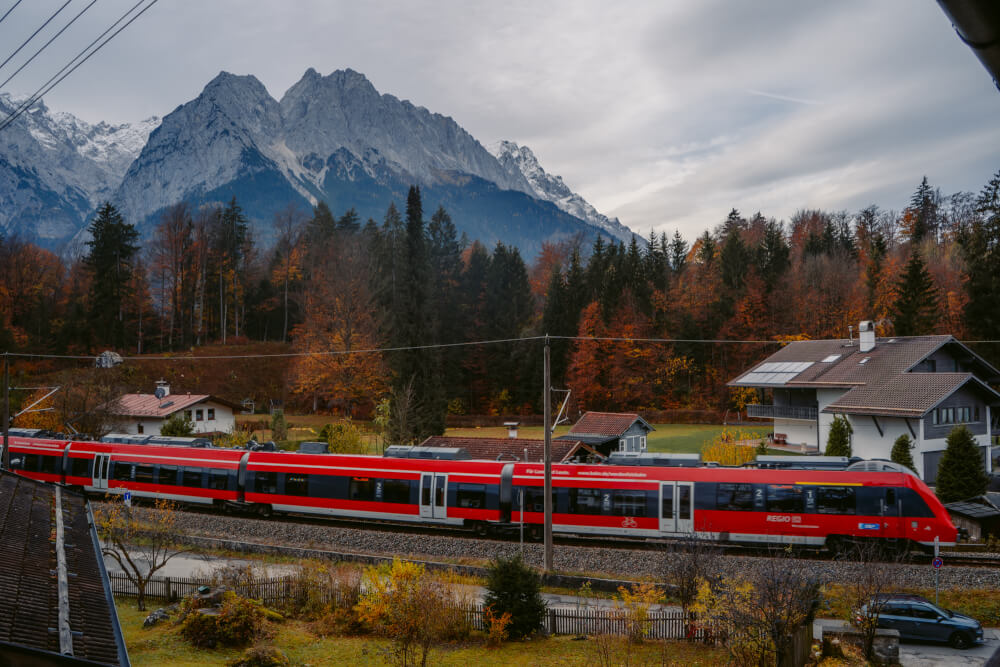
Another train operator you can consider in Germany is FlixTrain.
I’ve personally never taken them because in the time I lived in Germany, they were operating really limited routes and I still haven’t had a chance to try them. That said, their value proposition is super cheap fares starting at only 4.99 euro so definitely worth looking into if budget is a priority.
Flixtrain is fairly no frills – they only have one standard class and the buying process is straightforward so the rest of this post will focus on Deutsche Bahn trains and tickets.
NOTE: If you do book with Flixtrain though, be sure to double check that you are in fact booking a train, because this company also owns Flixbus, one of the biggest bus companies in Europe, and they’ll often show you buses alongside trains.
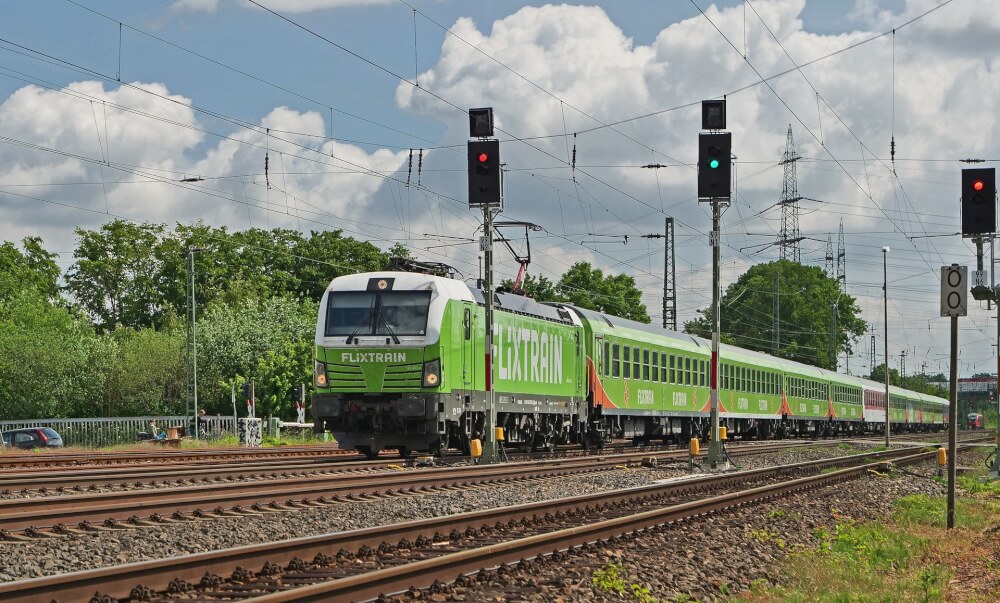
Now, let’s discuss…
Types of Trains
Broadly speaking, we can divide German trains into two three categories: long distance, regional, and local, such as S-Bahn or U-Bahn trains.
Understanding the difference between these is important, as they make a huge difference in journey time and cost, so I’m going to run through the most common ones, along with their abbreviations that typically show up in the train numbers and booking portals.
Long distance trains in Germany are used to connect larger cities and are therefore usually quicker, but typically require booking in advance, with reservations being a good idea in busy periods.
Under the German long distance train umbrella, we have…
- ICE: InterCityExpress trains, which are the fancy, high speed trains that get you between major cities, and can go up to 300km an hour. Especially quick are the ICE Sprinter trains which make even fewer stops than normal.
- IC: Intercity trains, which also travel between cities in Germany but are sometimes a bit slower than the ICE ones (maxing out at about 200km an hour) and often not as new or nice.
- EC: Eurocity trains, which travel between cities in Germany and elsewhere in Europe. These can look different than usual Deutsche Bahn trains because depending on the route, they may be operated by another country’s rail provider.
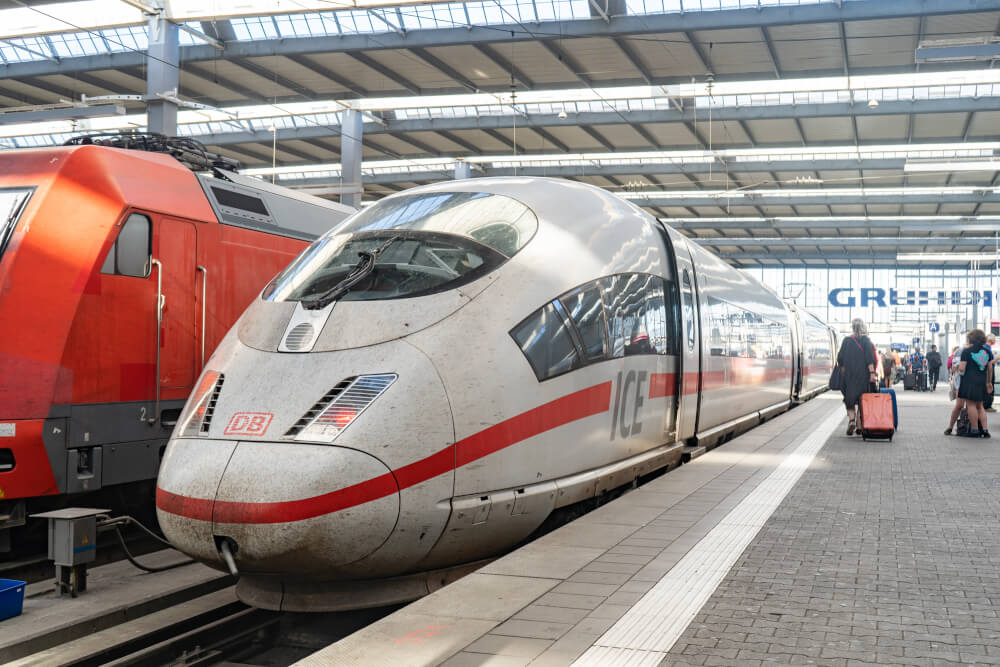
In contrast, regional trains cover shorter distances, typically within one state or region.
Reservations and assigned seats are not possible for these trains, their prices are fixed so buying in advance isn’t necessary, and they’re covered by a range of special deals which I’ll go over later.
Under this regional train umbrella, we have…
- IRE: Interregio-Express trains, which travel longer distances between regions but usually at much slower pace than the long-distance trains (and are therefore classified as a regional train as far as special deals are concerned)
- RE: Regional Express trains, which connect destinations in one region, but don’t stop at every stop on the route which can be faster than the…
- RB: Regional Bahn trains, which connect destinations in one region and do stop at every stop along a particular route
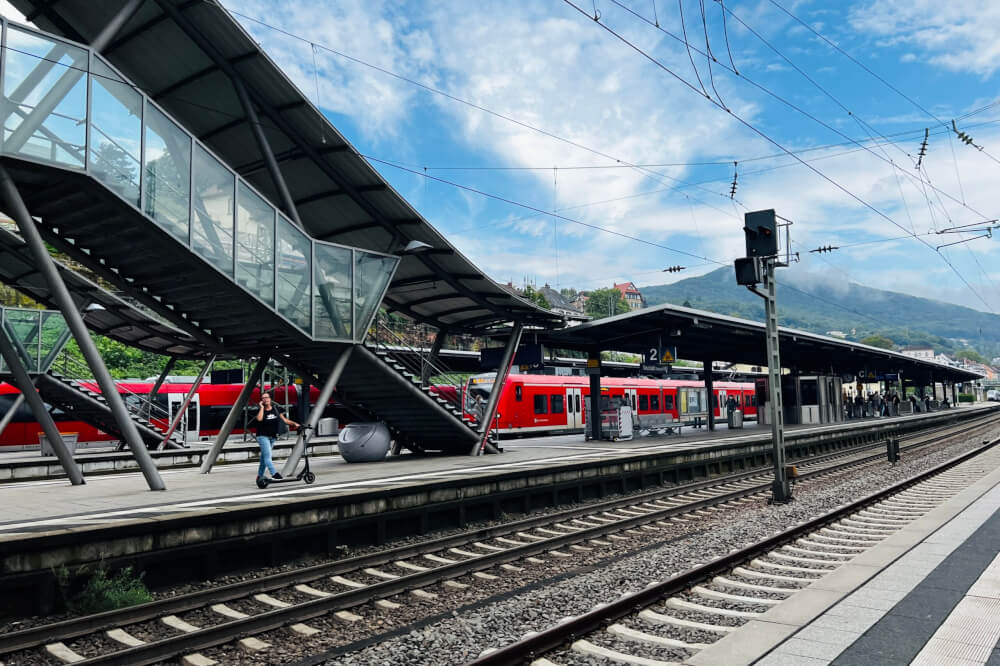
Lastly, on the local train front, we have options like…
- S-Bahn, which are trains that connect stops within cities and out to nearby suburbs, as well as…
- U-Bahn (in some cities) which are underground trains that connect stops within the city itself like the Subway or Metro
These are also typically covered by the special deals we’ll be discussing below.
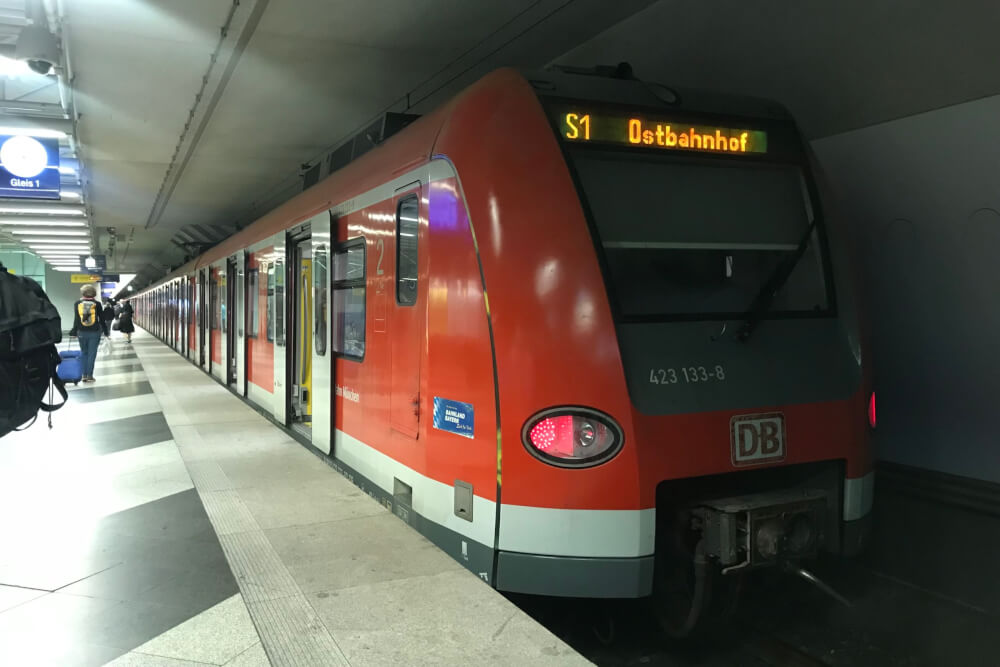
Now, with the basics covered, let’s go through step by step how to plan a train trip in Germany.
Step One: Decide if Train Travel in Germany is Right for You
First – let’s talk alternatives to train travel in Germany.
I’m a huge fan of German train travel, but there are other options for getting around that may be better suited to your specific trip and priorities.
Overall, I think taking the train in Germany is great if you’re looking for convenience, comfort and scenery.
The downside is however it can be quite expensive, especially if you don’t book in advance. It’s also not super convenient if you’re travelling with a lot of luggage (more than one big suitcase per person).
A more budget-friendly alternative may be taking buses, booking a ride share on services like BlaBlaCar or sometimes even flights if you’re booking with budget airlines like Ryanair , easyJet and Wizz Air .
Or, if your priority is freedom and getting off the beaten path, it may be worthwhile to rent a car.
Overall, if you’re torn and want to compare all your options at a glance, Omio is a great app that shows you planes, trains, and buses from Point A to Point B. From there, you can gauge whether train travel suits your needs.
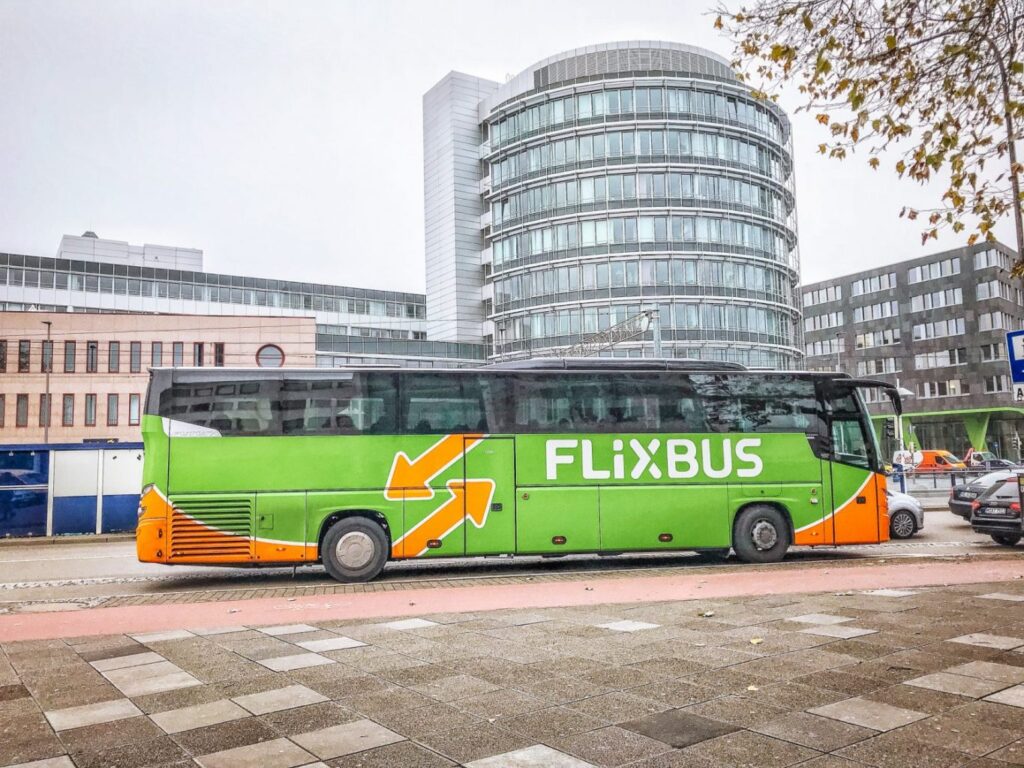
If/when you’ve decided you do indeed want to take the train, then we move onto…
Step Two: Buy Your Germany Train Tickets
The pricing of trains in Germany is dynamic, meaning the cost changes depending on when you buy it and what demand is like.
It is totally bananas to me that a ticket, when booked early, can be 20 euros but if you wait until the day before/day of it can go up to 180 euros.
But alas, I do not make the rules. If I did, everyone would get a free on-board puppy.
In any case, I’d advise booking tickets in advance online, because buying them on board isn’t usually possible, and buying in person from the information desk at the station does incur an extra service fee.
You can also buy tickets on machines at the station but I feel like this adds an extra element of stress, so be sure to book in advance whenever possible.
Now, there are a lot of considerations to be made when you go to buy train tickets in Germany. I’ll outline them all now.
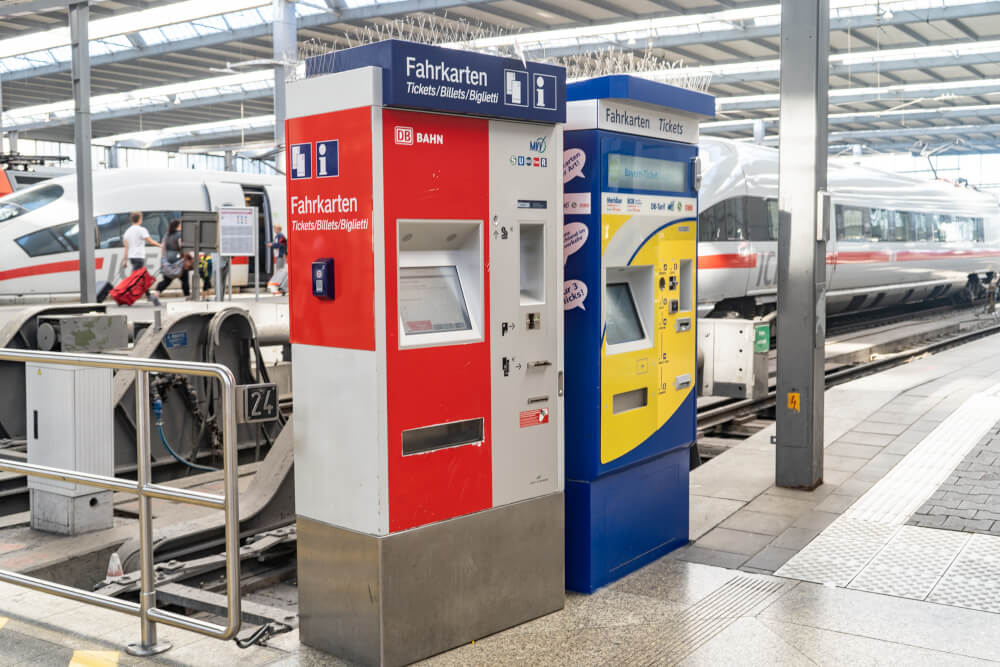
First off…
BahnCard vs No BahnCard
If you plan to stay a while and take a lot of trains in Germany, it may be worthwhile to purchase something known as a BahnCard.
These are cards that you purchase for a set fee that then give you discounts on most train journeys, either 25% or 50% depending on which one you buy.
While these cards are definitely more geared towards locals than tourists, sometimes the discounts can be so significant that you can make the cost up in just a few journeys, so it’s worth crunching the numbers.
Especially interesting for short term visitors are the Probe Bahncards, or Trial cards which allow you to buy a cheaper membership that’s essentially a trial for 3 months, rather than for a whole year.
These start at just 17.90 for the three months, an amount you can easily make up if you’re buying an expensive long-distance or last minute ticket. Just don’t forget to cancel your subscription 6 weeks before the expiry date, or it auto-converts to an annual one that of course costs more.
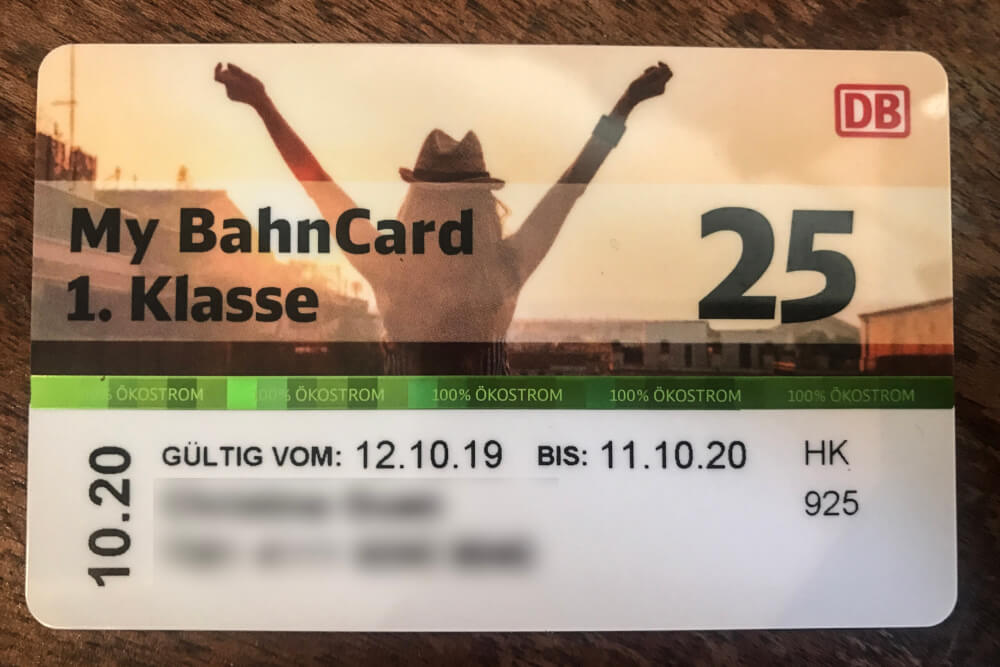
Honestly though, for most tourists visiting for a short time, there are better ways to save money on German train tickets.
So let’s move onto our next consideration which is…
Standard Tickets vs. Special Tickets or Rail Passes
If you are only booking a few train journeys during your time in Germany, the best option is most likely to just buy tickets for the journeys you’re taking, meaning hopping on the Deutsche Bahn app or website, entering Point A to Point B and buying tickets for each trip you plan to take.
Sometimes though this won’t be the way to get the best deal. So, I’m going to outline some options that may save you money depending on your circumstances.
First off – do know that there are age based discounts on Deutsche Bahn for the following groups:
- (FREE!) Children 6 & under
- (FREE with parents or grandparents) Children aged 6-14
- Youth (aged 15-26)
- Senior (age 65+)
So, to activate these discounts, be sure to specify your age and the age of those travelling with you when you go to search routes.
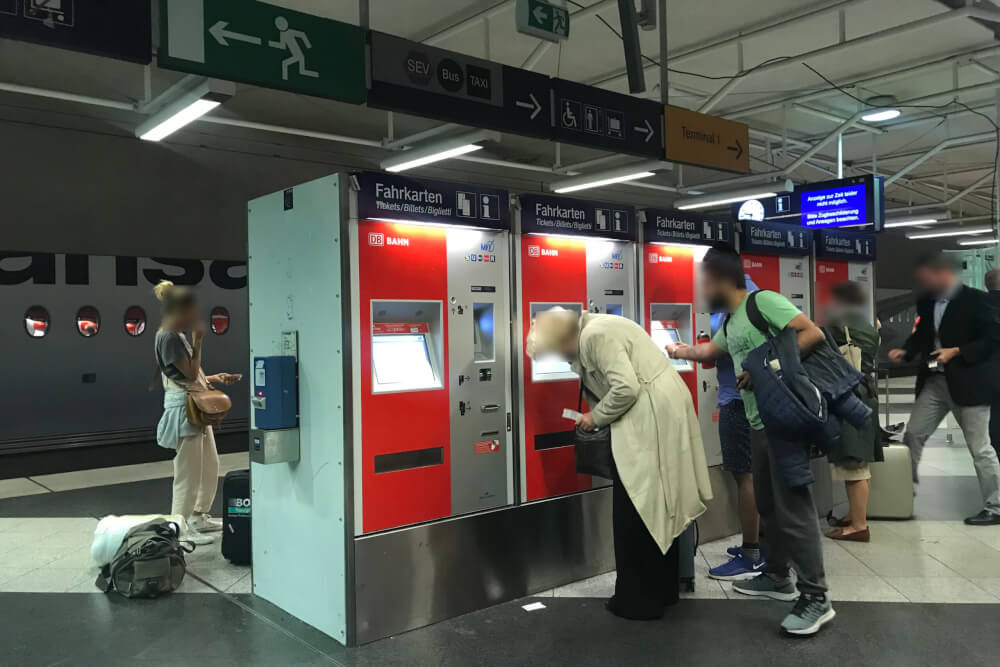
Now, if you are looking to save money on regional and local trains in Germany, there are few excellent options that are almost guaranteed to save you money, especially for day trips.
With one of these, you can genuinely save hundreds of euros over buying individual tickets the day-of.
If your travels are restricted to one German state, then look into buying a regional day ticket (known in German as Länder-Tickets ). These give you unlimited travel on regional trains for one day, with options up to five adults on one ticket.
The savings with these are also better the more people you bring, with a base fee, then a small additional fee for every extra person, so definitely worth considering if you’re travelling in a group.
Here are the different regional tickets you can buy:
- Baden-Württemberg-Ticket
- Bayern-Ticket
- Brandenburg-Berlin-Ticket
- Hessen-Ticket
- Mecklenburg-Vorpommern-Ticket
- Niedersachsen-Ticket
- Rheinland-Pfalz-Ticket
- Saarland-Ticket
- Sachsen-Anhalt-Ticket
- Schleswig-Holstein-Ticket
- SchönerTagTicket NRW
- Thüringen-Ticket
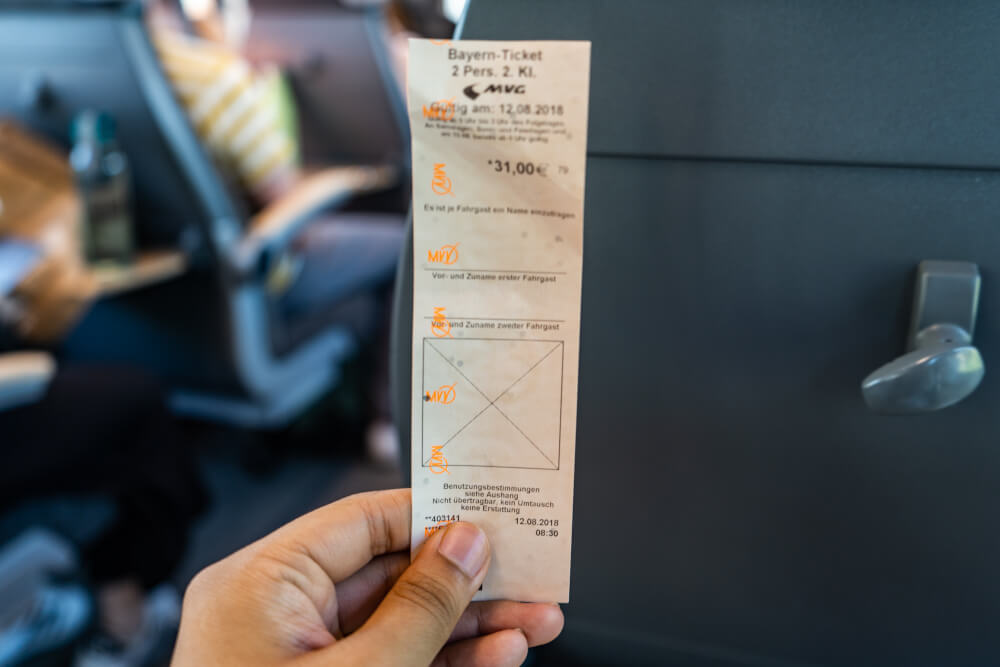
They also have a Germany-wide version of this ticket if you plan to travel across states, known as the Quer-durchs-Land-Ticket.
BUT, an even better deal if you plan to use regional trains exclusively across Germany is a relatively new offering known as the Deutschland ticket.
This golden ticket is only 49 euro a month and gets you unlimited travel on regional trains for that whole month. Considering a one-day Quer-durchs-Land Ticket is already 44 euro, getting the Deutschland Ticket is pretty much a no-brainer if you’ll be taking regional trains for more than one day.
BUT the catch is, this ticket is more geared towards locals, and therefore is offered on a subscription basis. So long as you cancel your subscription in time though, then you can easily just use it for one month or as you need.
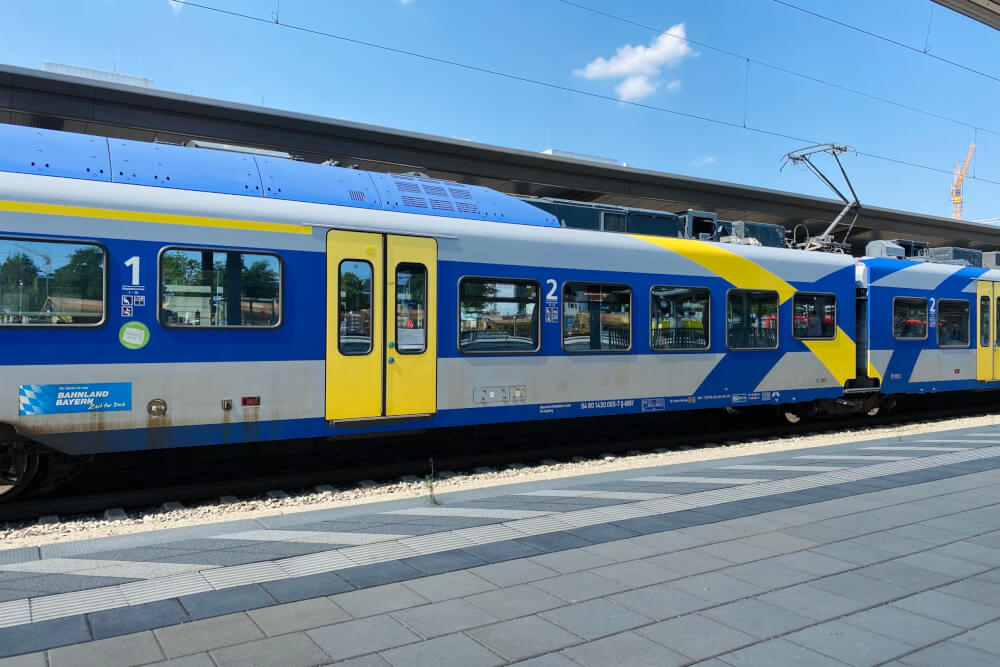
Unfortunately, saving money on long distance trains is less simple. Generally, your best bet is just booking early. The earlier you book, the cheaper it’ll be.
If you can’t book in advance though, a potential cost saver could be a rail pass.
If you are just travelling within Germany, there is a German rail pass you can buy for unlimited journeys either on a flex basis, meaning for a few days within a set period or on a consecutive basis, meaning a set number of days in a row.
If you are travelling to other countries in Europe, it may be worth getting a Eurail pass , also known as an Interrail Pass when you’re a resident of Europe.
Used properly, these passes can save you a lot of money, but only in certain situations so for more information on that, be sure to read my full Eurail review.
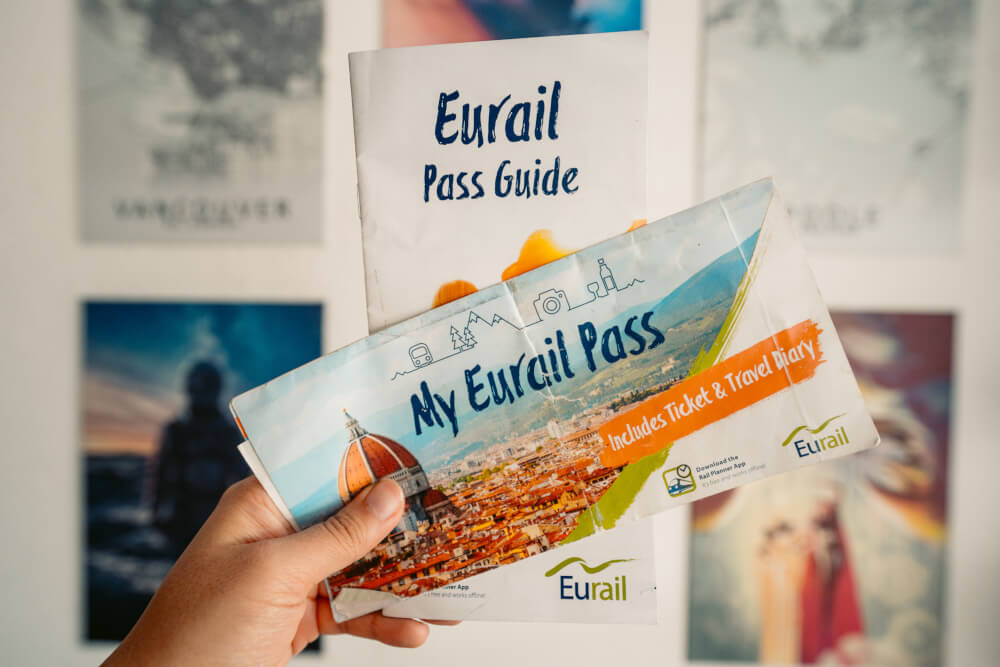
Now, when you go to buy tickets, you can either do so in person or online.
Online, you can either buy tickets directly through Deutsche Bahn (website or DB Navigator app) or through a third party website.
Booking direct with Deutsche Bahn will pretty much always be the cheapest option, but if you’re planning a big trip with lots of trains or buses in other countries, then a 3rd party like Omio or Trainline might be worth it just to keep all your tickets in one place.
NOTE: When choosing your journey, always prioritize direct connections or routes that make fewer stops. These will usually cost more, but trust me, it’s worth every penny! Transfers are simple enough when trains run on time, but as soon as you’re hit with a delay, that can disrupt your entire journey and make things 100x more stressful.
Whether you buy from Deutsche Bahn or from a third party though, there are several considerations to make, so I’ll run through them now.
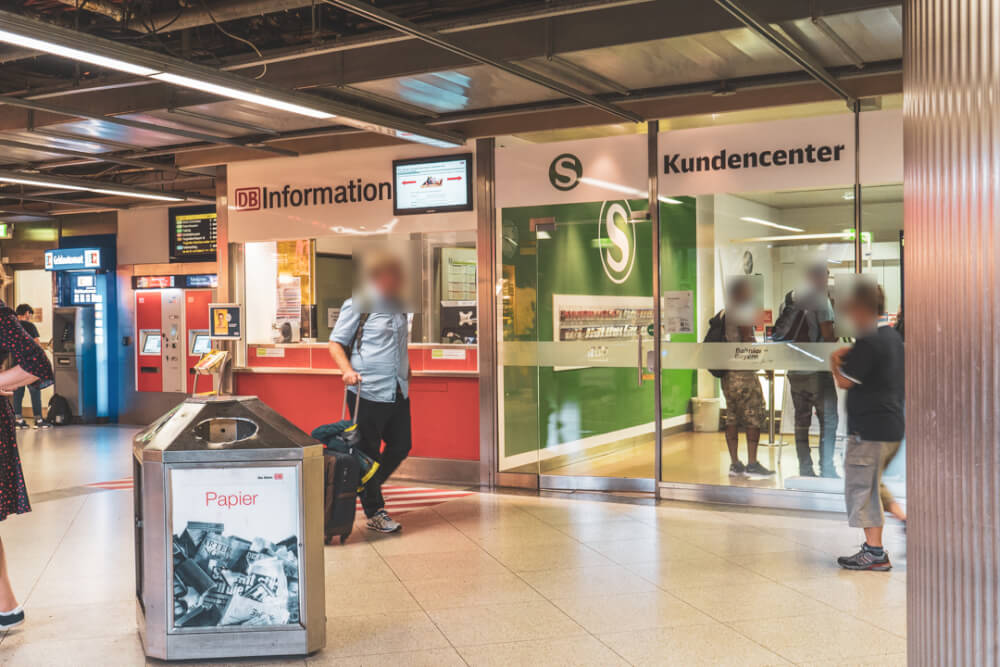
1st vs 2nd class on German Trains
The first time I got to sit on a 1st class German train, I had extremely high expectations.
Part of my brain flashed to a sepia-toned flashback of glamour train travel in the 60s, with fizzy champagne flowing and a steak dinner served right to my seat. I knew this wasn’t going to happen, so I dialled it down. I once took a first class train in Italy and they gave us coffee and snacks. I therefore looked forward to said coffee and snack.
German trains? You get pretty much nothing. So no, the difference isn’t stark, but there are some instances where I think splurging on first class is worth it.
On regional trains, there isn’t a dramatic difference between first and second class seats.
The main perk is it’s generally quieter and sometimes the seats are slightly comfier. So, I would go for first class in regional trains if a) the price difference isn’t much/doesn’t matter, b) you want extra privacy or c) it’s a busy time and you want to secure your chances at having a seat (and space for your stuff).
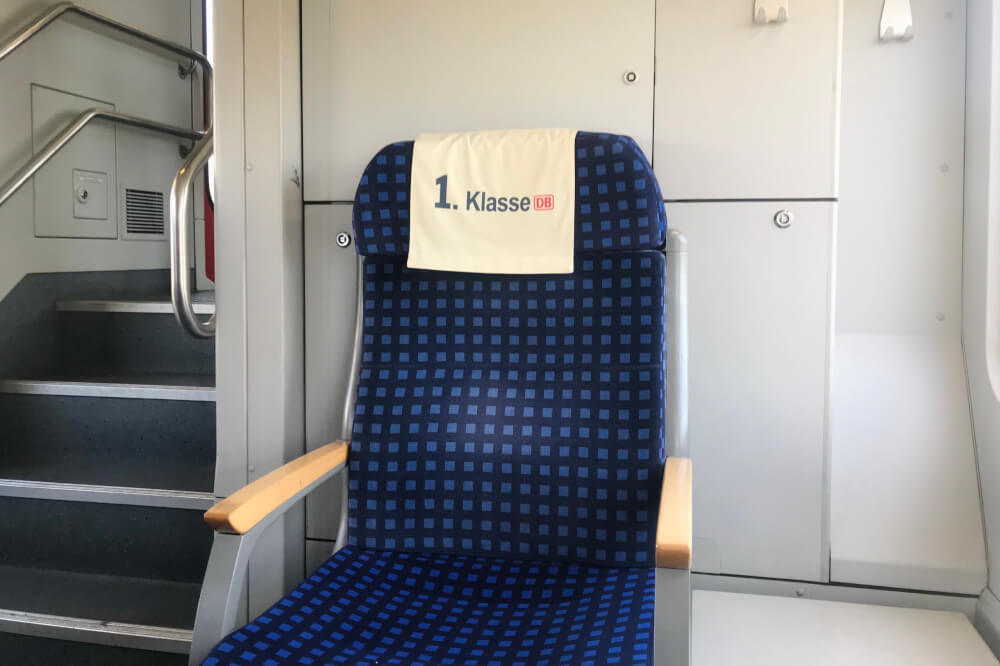
On long distance trains however, there’s definitely a bigger difference between first and second class, especially on ICE trains.
In first class, the seats are more comfortable, a reservation is included, you can get food/drinks ordered to your seat, and for introverts like me, there are even single seats you can reserve so you don’t have to sit next to anyone.
If any of these perks sound appealing to you, then I’d say it’s worth the extra cost (which is sometimes minimal if you book early enough).
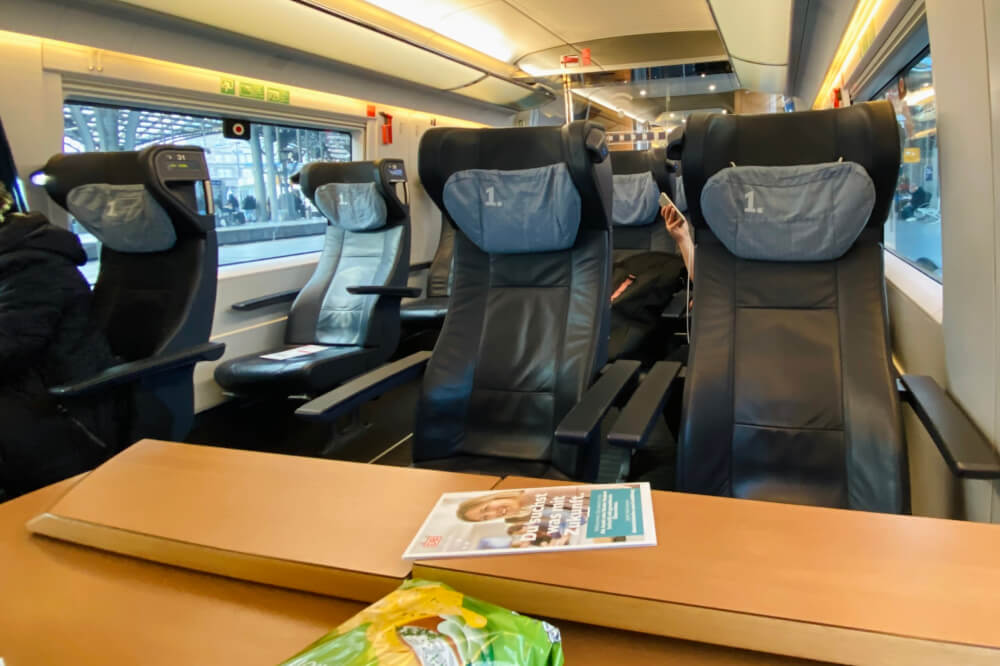
The next consideration is…
Reserved vs. Unreserved seats
Reservations are pretty much never mandatory on German long distance trains, and aren’t even possible on regional trains, S-Bahn or U-Bahn.
That said, I would highly advise making a reservation if you’re at all an anxious traveller, or if you’ll be travelling during a busy period.
The cost is only about 5 euro and having that peace of mind for me is more than worth it.
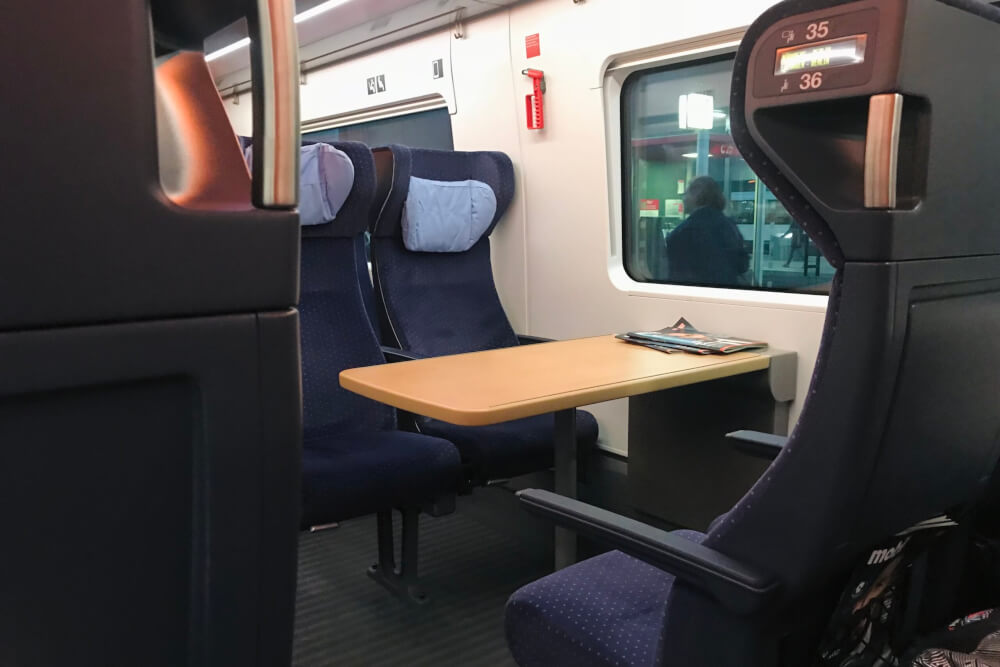
If you do end up reserving a seat, another consideration is…
Carriage and Seat Types
Some trains in Germany have different carriages intended for different purposes, such as…
- Silent/quiet carriages
- Cellphone carriages (where you can freely make calls)
- Family areas
- Bike zones (with additional space)
- Accessible zones
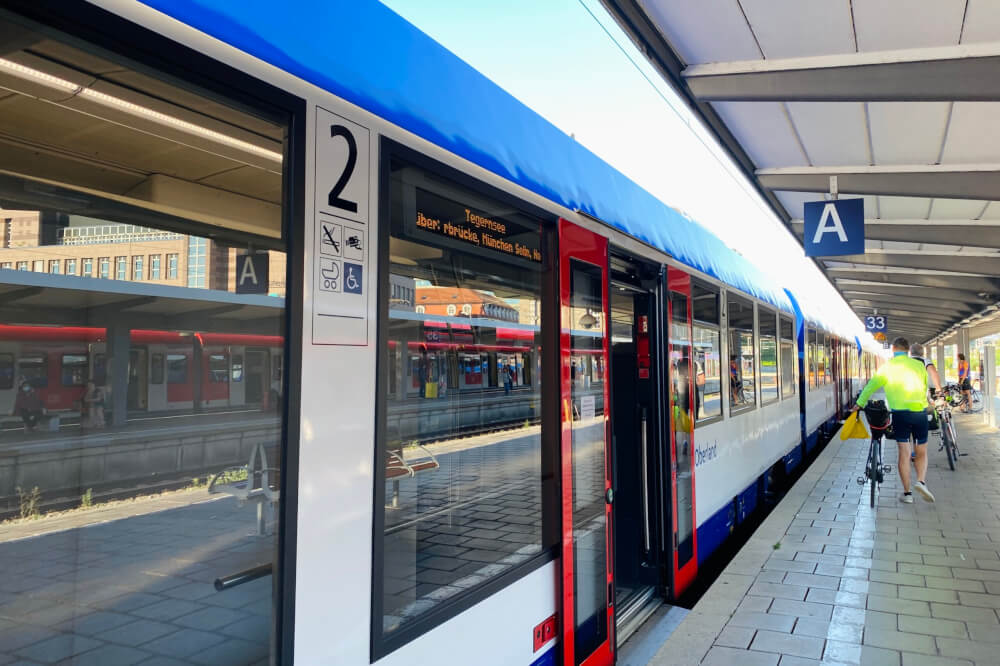
There are also different seating configurations for many long distance trains, with the two main choices being:
- Open saloon seating, which is your standard train set-up with seats in a carriage, sometimes with a table around which 4 people can sit facing each other OR
- Compartment seating, which are more old school closed compartments with seats facing each other. These are fun if you get them to yourself, or with your own group but can be a bit intimate if you’re sharing with strangers
You’re usually given an interactive map when you book a reservation, so you can also make other considerations like window vs aisle or how close you are to amenities like the bathroom, luggage racks or the on board restaurant.
Be sure to take some time to consider which seat you might want to reserve – not all seats are made equal!! With seats at the end of cars for instance, people will be coming in and out constantly to go to the bathroom, which isn’t ideal if you’re looking for a peaceful journey.
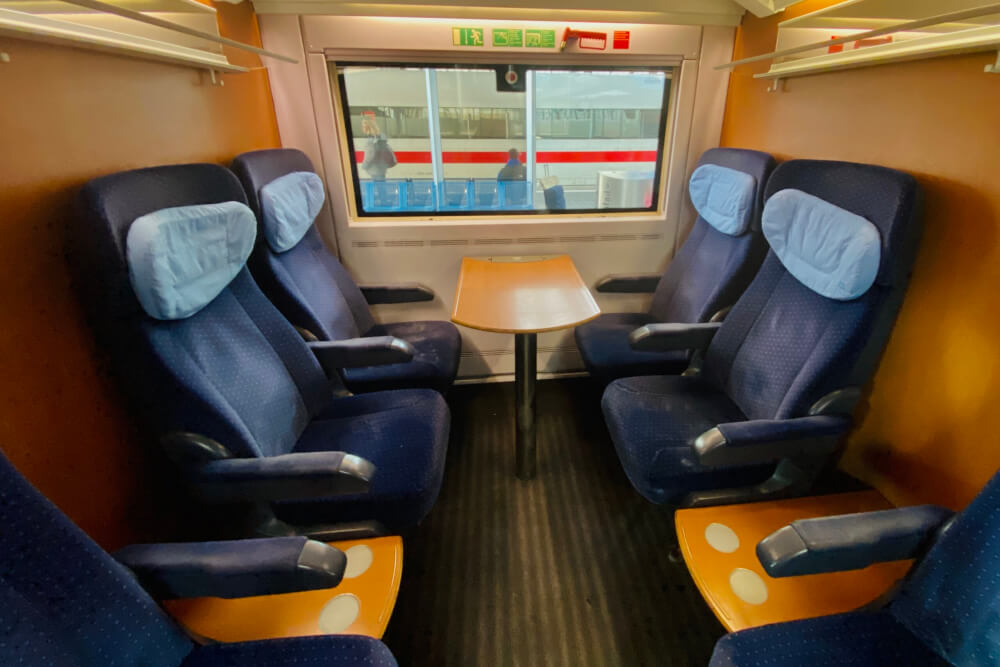
Another choice you’re given when buying tickets is…
Flexpreis vs Sparpreis
Essentially these are different versions of the same ticket, and make no impact on the destination/route, but do impact how flexible the terms of your ticket are.
The Sparpreis is essentially a ticket that is only valid for that one train and time you’re booking. In exchange for this lack of flexibility, the fare is much cheaper, especially with the Super Sparpreis (which is most limited in flexibility).
In contrast, the Flexpreis ticket gives you a lot more flexibility, usually allowing you to travel on any train that day for your chosen route, or with the Flexpreis Plus, even trains the day before or two days after.
Overall, I feel like the price difference is rarely justified for these Flexpreis tickets (sometimes it’s more than 5x!), but do what’s right for your own trip and priorities.
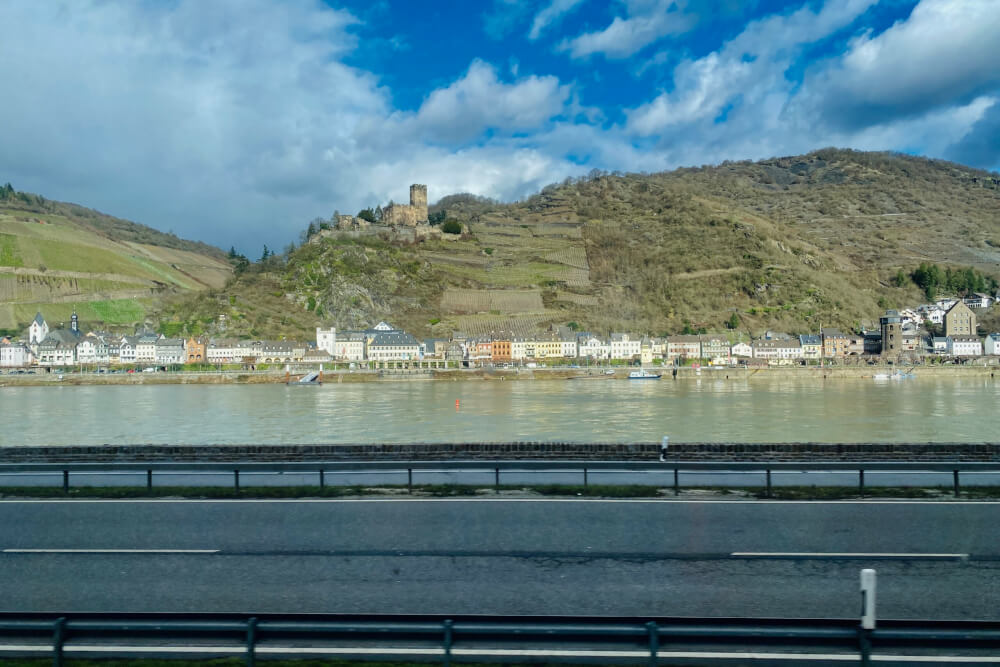
Lastly, there’s…
Bike/Pet Add-Ons
If you are travelling on German trains with a bike or with a pet, know that you’ll typically need to buy an additional ticket for them.
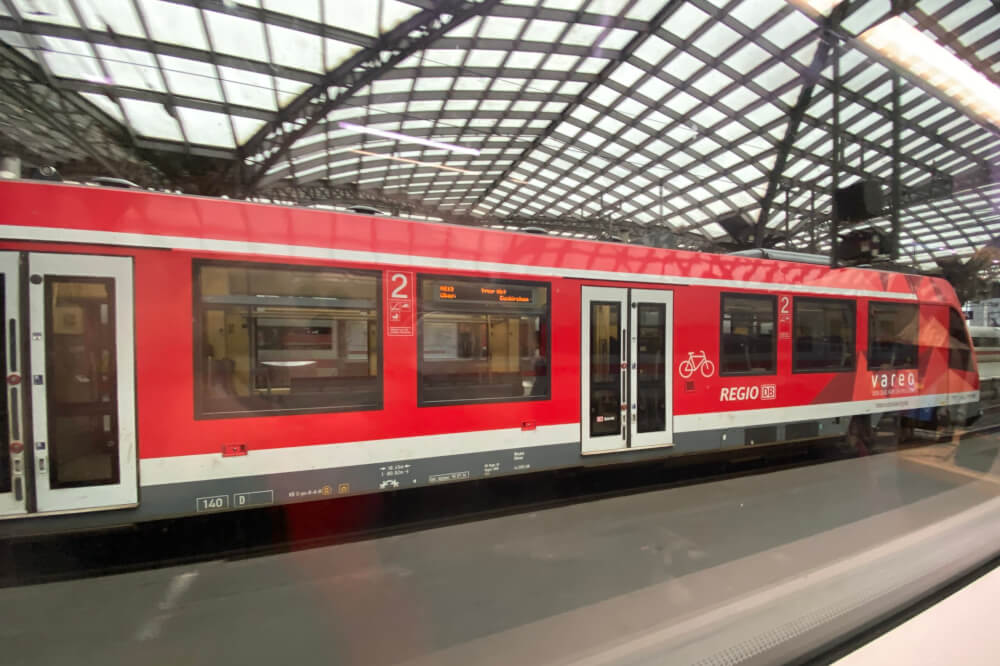
Alright with your tickets booked it’s time to move onto the day of your journey, with…
Step Three: Get Snacks
On the day of your journey, I highly recommend you get some food and drink to bring with you on the train (especially for longer trips). This is completely allowed on German trains!
While there are usually some food options on board with long distance trains, they tend to be fairly limited and pricey, so getting your own gives you more control. On regional/local trains, there is no food or drink sold on board at all.
So, at the very least, I’d get some water or something to drink. There’s often great options even at the train station itself.

Now let’s move onto…
Step Four: Arrive at the Station
First off, before leaving, double check that you are headed to the right station. Many major cities will have multiple stations like Munich, which has its Hauptbahnhof (Main Station) as well as Ostbahnhof (East Station) and other smaller ones.
If it’s your first time at this station, and if you’re in a big city, I recommend you arrive thirty minutes or more in advance of your departure time, because main stations in cities like Berlin, Munich & Hamburg can be very overwhelming, with multiple levels, shops and 20+ platforms.
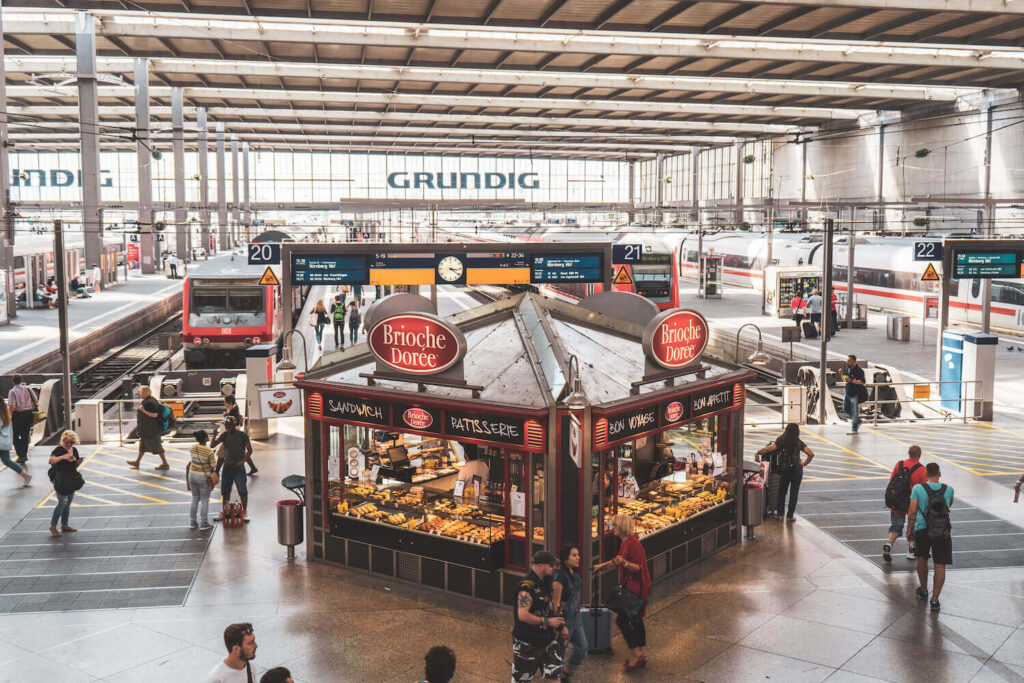
Now, if you are taking public transport and arriving at the train station in a big city, you might find it tough to find where the trains actually are, because often these stations are multi level transport hubs servicing U-Bahn, trams and buses as well.
In any case, all you need to do is look for train symbols on signs like this which will point you in the direction of the platforms:
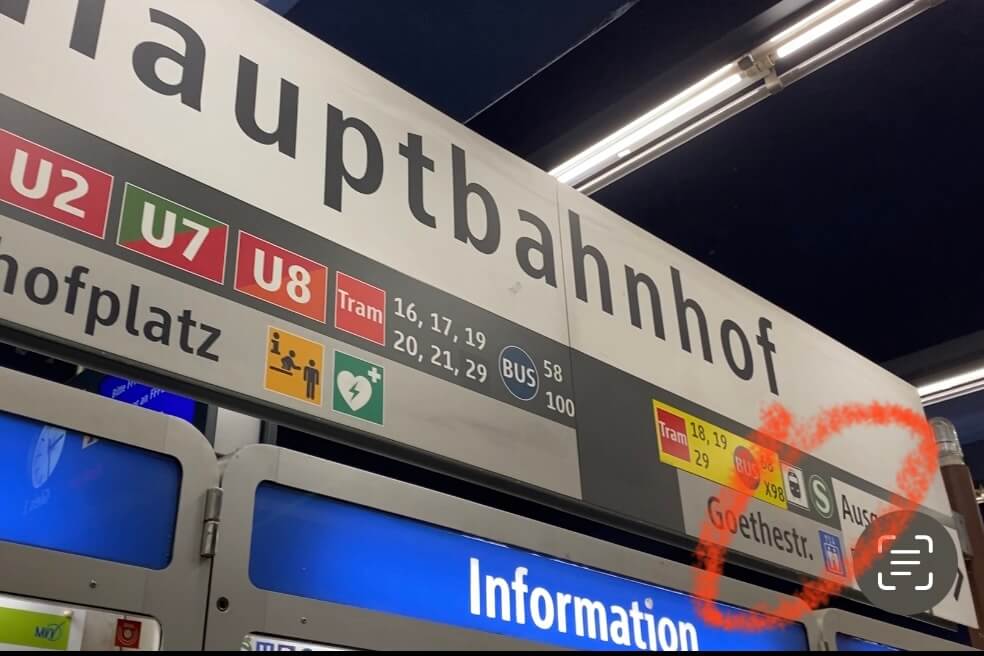
Now when you get to the station’s main concourse, your priority is finding out which platform your train is on. The Deutsche Bahn app will usually tell you in advance but I like to double check on the board just in case.
When looking at the board, remember that trains will not necessarily say your destination, but rather the final destination of the train, so if you don’t see the name of where YOU’RE travelling to, don’t panic.
Look for the time and train number, and (when available) the list of stops to see if your destination is listed, then figure it out from there. Beware that some cities like Munich and Cologne have a different name in German (München & Köln) and that’s likely the name that will show.
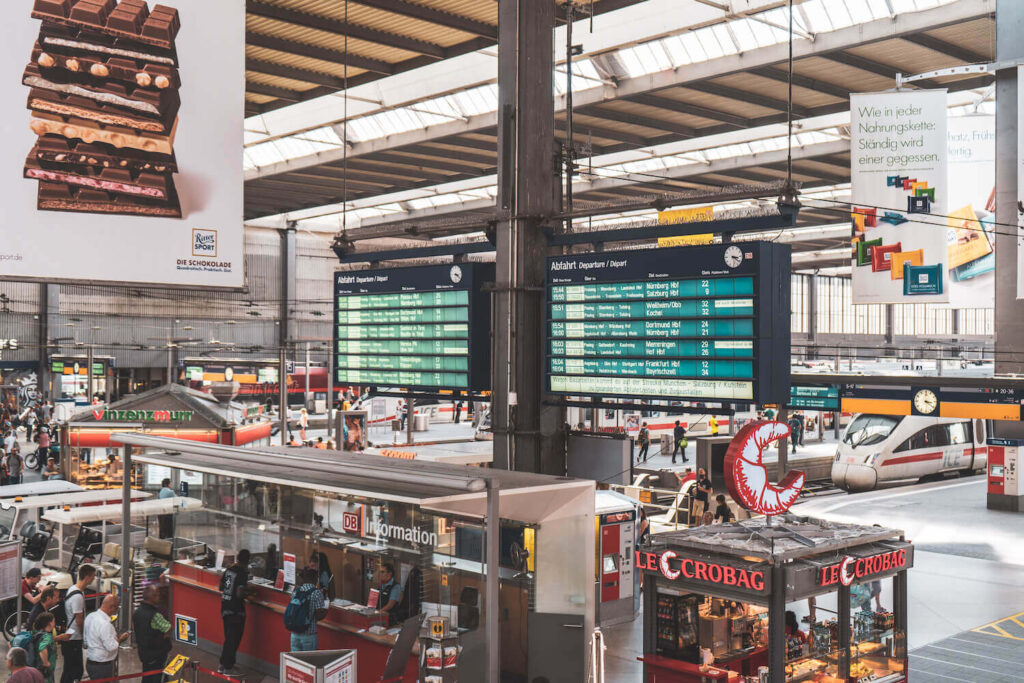
Next, it’s time to…
Step Five: Get to the Platform
Platform numbers will generally be very well marked so just look up for signs before making your way.
You will not need to have your ticket for this part, because there are no fare gates for German trains, and tickets are usually just checked on the train itself.
When you get onto your platform, double check it’s correct by confirming either on a platform screen or on the side of the train that you’re in the right place before proceeding to find your carriage.
NOTE: Some regional trains in Germany are divided trains that split at one point in the journey, which means only certain cars end up going to certain destinations. So, before you board, double check that the destination on your train carriage is actually where you want to go. In cases where the train splits, the sign will usually tell you which cars or which part of the platform to go to for your destination, so keep an eye out for that.
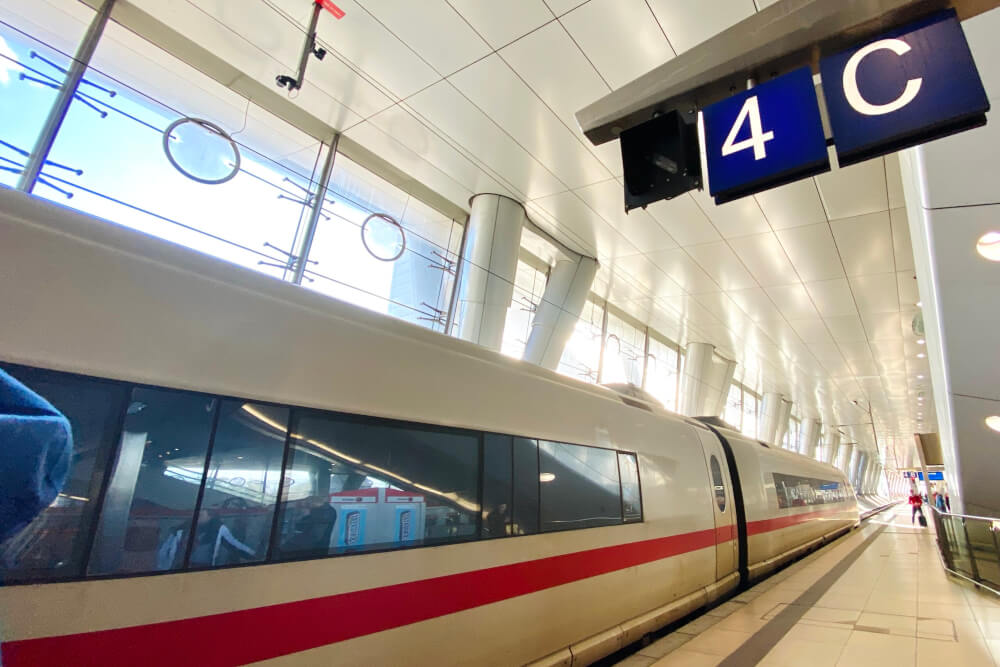
Next up, it’s time to…
Step Six: Find Your Carriage
If you have a reserved seat, then you’ll need to take some extra steps to make sure you get to the correct carriage once the train arrives.
German trains can be very long, so if you have a seat reservation, make sure you’re standing in the right part of the platform to get onto your carriage, otherwise you’ll have to awkwardly dodge and shuffle your way all throughout the length of the train.
With reserved seats, a handy thing to look out for are these charts that show you which part of the platform to stand on (marked by number/letter) depending on your carriage number.
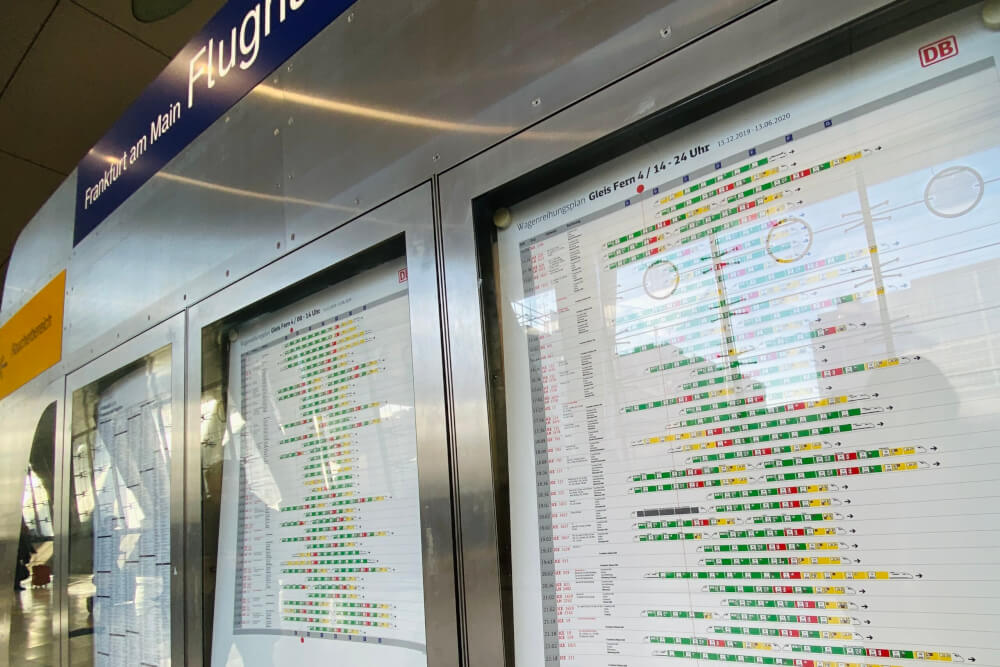
If you do not have an assigned seat, then you simply need to board a carriage in the right class, then pick a free seat.
In these cases, look up at the platform sign and there should be a little diagram that explains which letter part of the platform to stand on for 1st class, 2nd class, and the meal car (depicted by a tiny knife and fork).
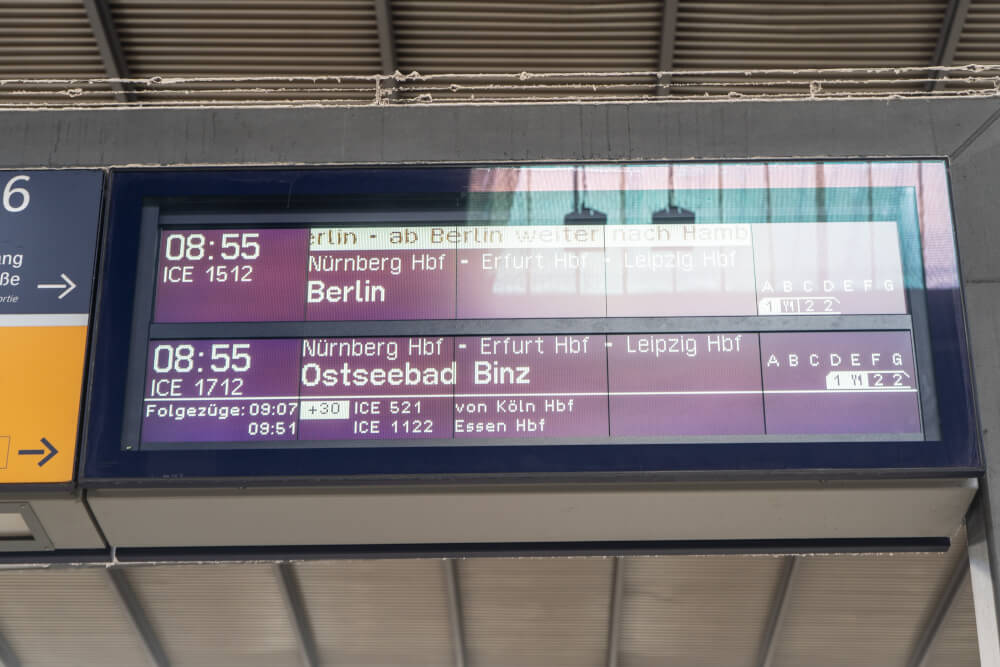
When picking a carriage to board, pay special attention to…
- The class number of the carriage (you may only board the class you’ve booked for)
- Whether they are special carriages meant for a certain purpose e.g quiet zone, bicycle zone
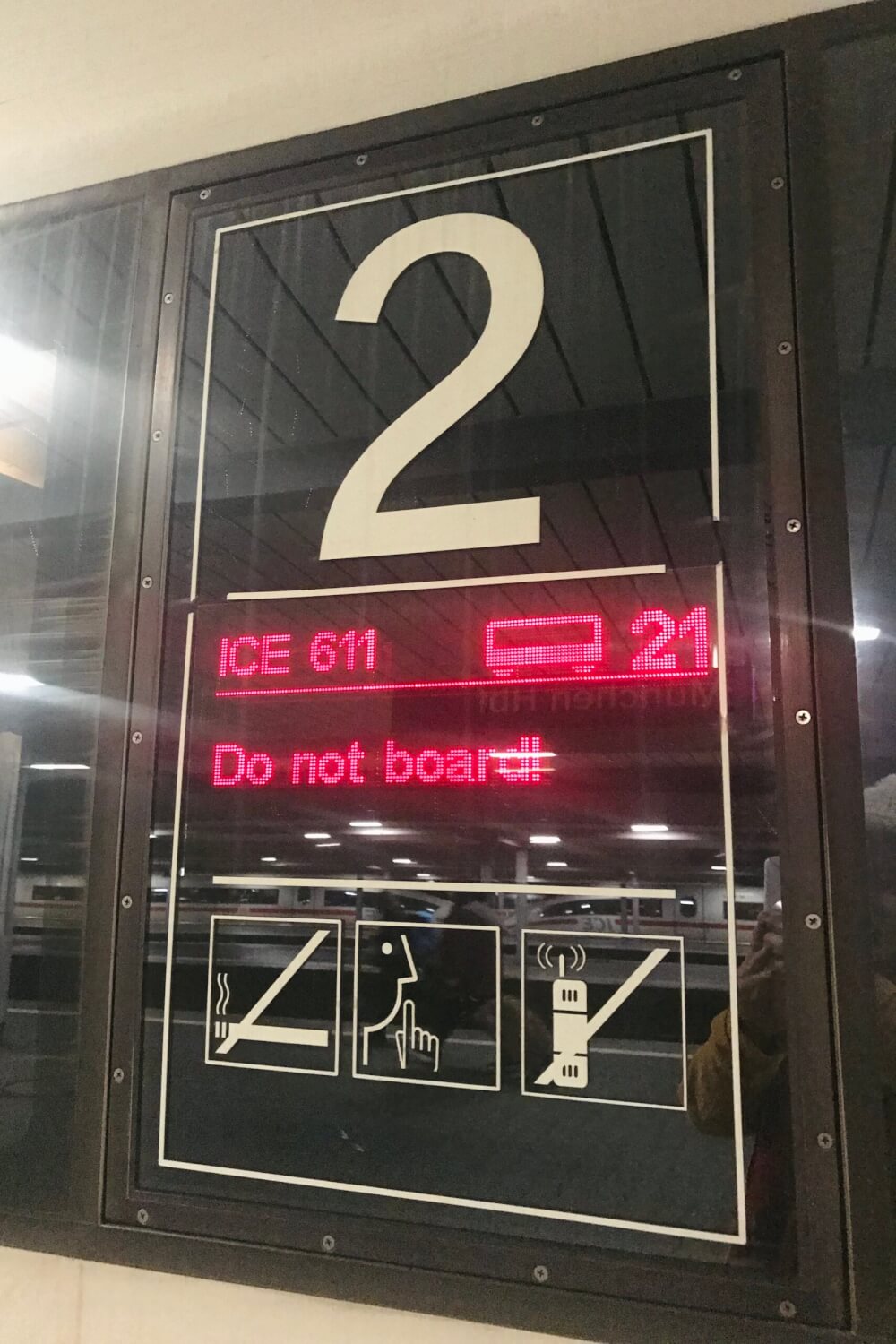
If you don’t have a reserved seat, then usually I find the farther you walk, the emptier the carriages will be.
Once you find or choose your carriage, then it’s time to hop on board.
If the door isn’t opening then look for a button like this <> and press it. This goes for the train doors as well as carriage doors.
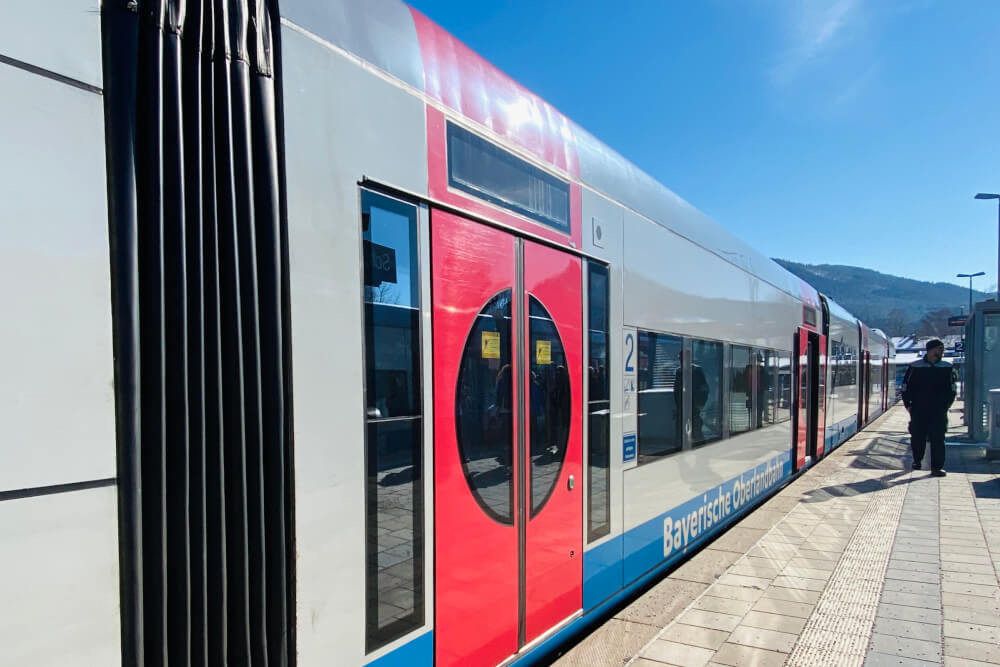
Now it’s time for…
Step Seven: Find Your Seat
First off, if your seat is assigned, try to make sure you go in through the correct door closest to your seat.
Long distance trains will usually write the seat numbers on the corresponding door, like so:
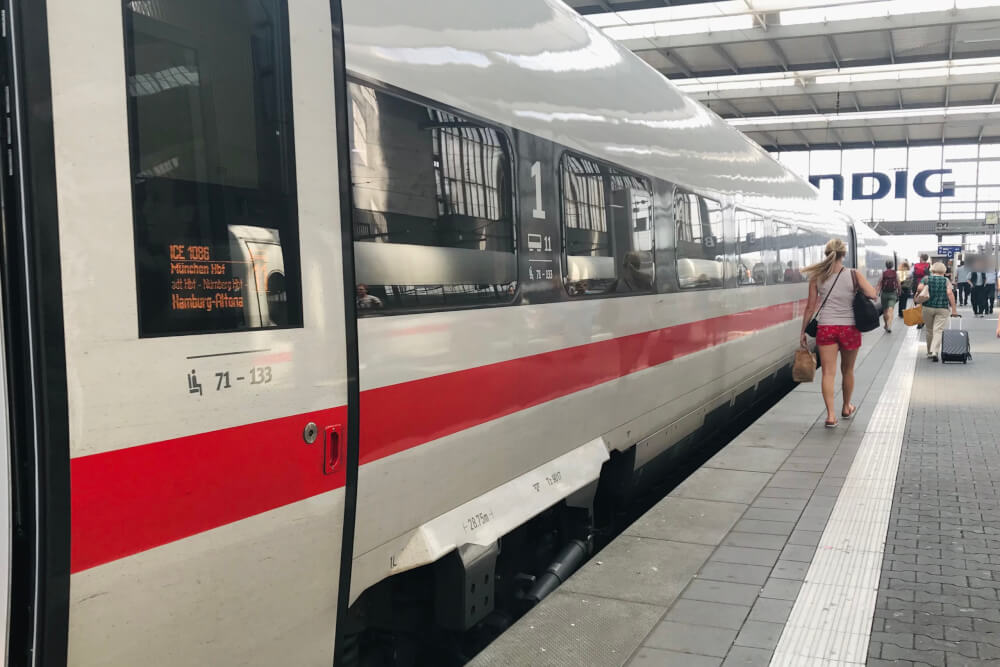
If you have large bags, keep an eye out for large luggage racks when you enter. These will usually be found on the ends of the carriages.
With smaller bags/suitcases, there is usually space above your seat for it, or sometimes under and between seats, as marked.
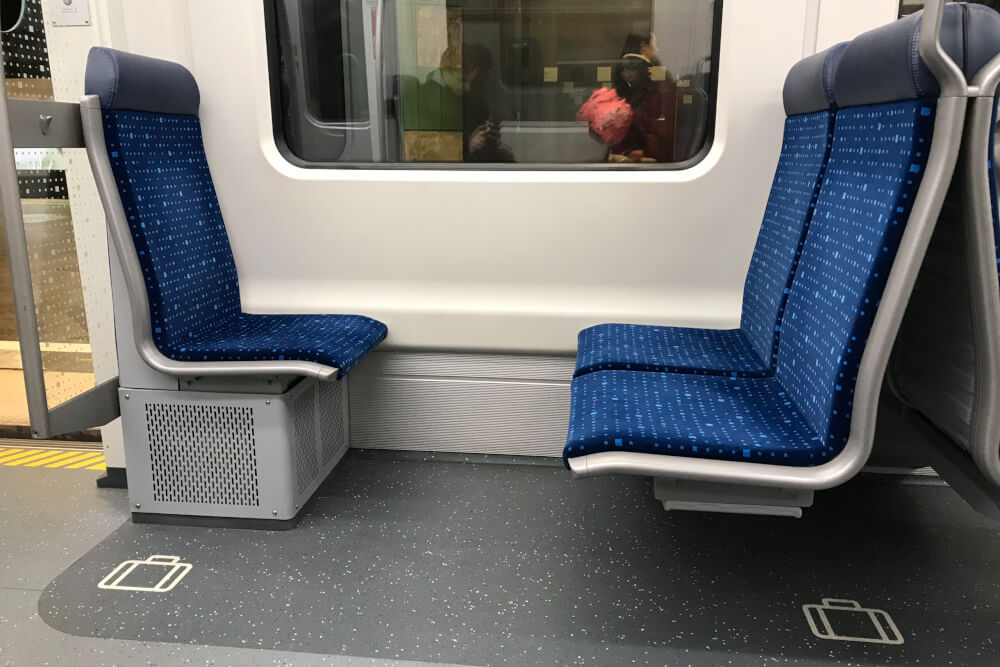
If you don’t have a reservation, before sitting down, make sure your seat isn’t reserved and make sure you’re not taking up a priority space if the train is looking full.
Seats that are reserved on long-distance trains will usually be marked on an electronic screen that shows you which part of the journey the seat is reserved for.
So let’s imagine you’re going from Munich to Berlin. The screen may show the seat is reserved for the whole journey, or for just a portion. If your journey doesn’t overlap with the reservation, then that sat is technically free.
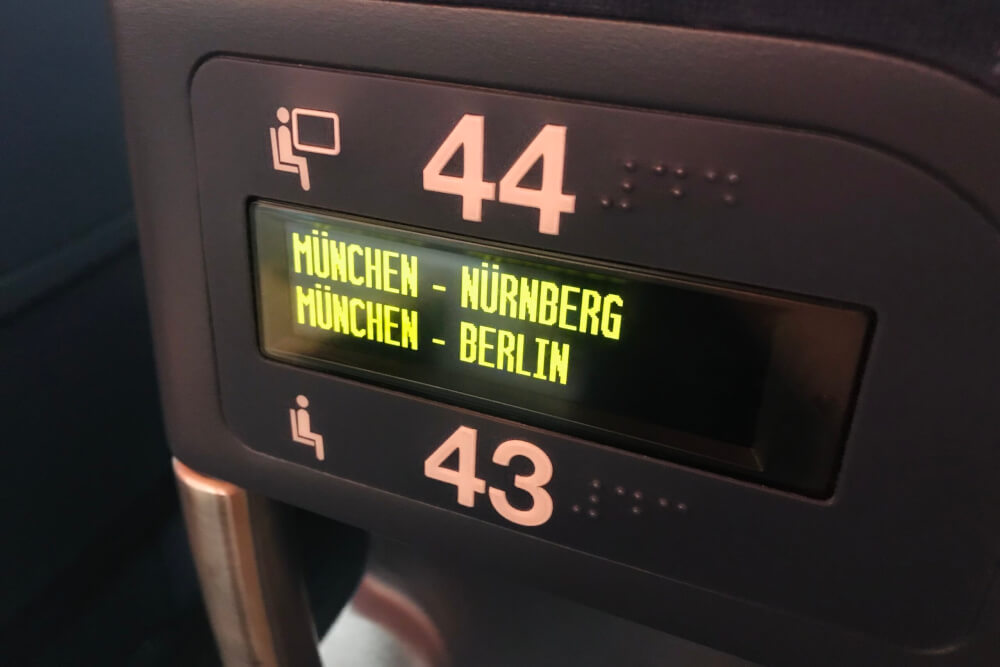
But do note however that the screen may sometimes say something else like..
- ggf. reserviert (possibly reserved)
- ggf. freigeben (possibly to release)
Both of these annoyingly mean that the seat might be reserved, or it might not, but either way you have to vacate it if the person with a reservation comes, so you kind of just have to sit there and hope for the best.
It is honestly the silliest system. To avoid this Russian Roulette of seating charts, be sure to just reserve yourself a seat. It’s worth it.
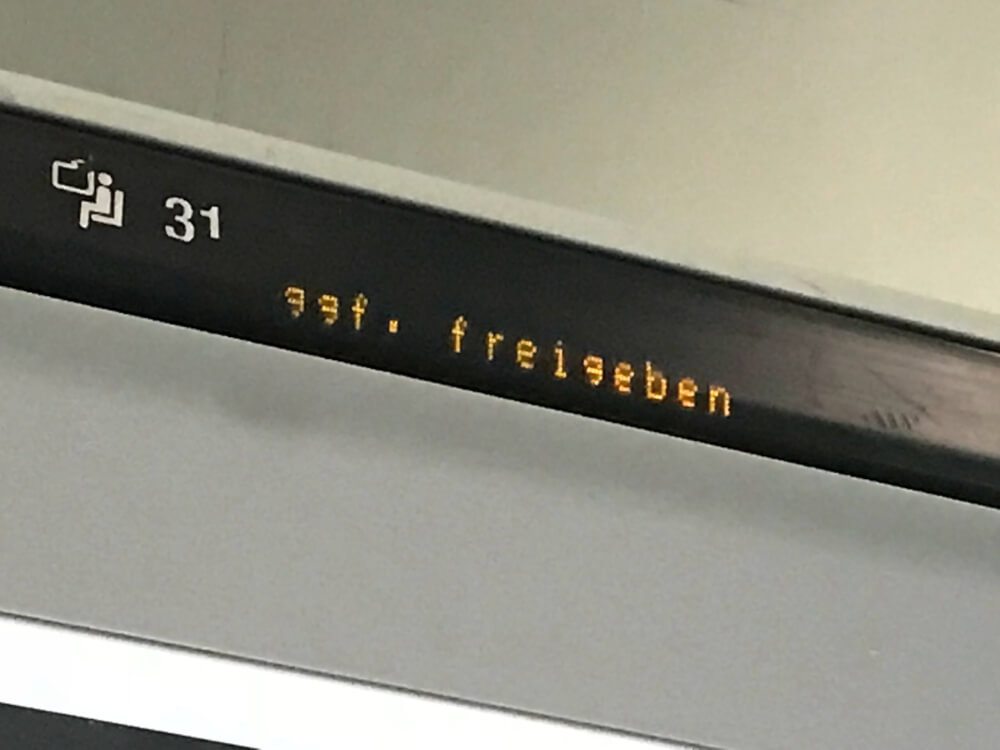
There are also some seats that are reserved for Bahn Comfort customers, i.e. VIP frequent travellers, so avoid those when you see them or an especially fancy-looking person might come kick you out of it.
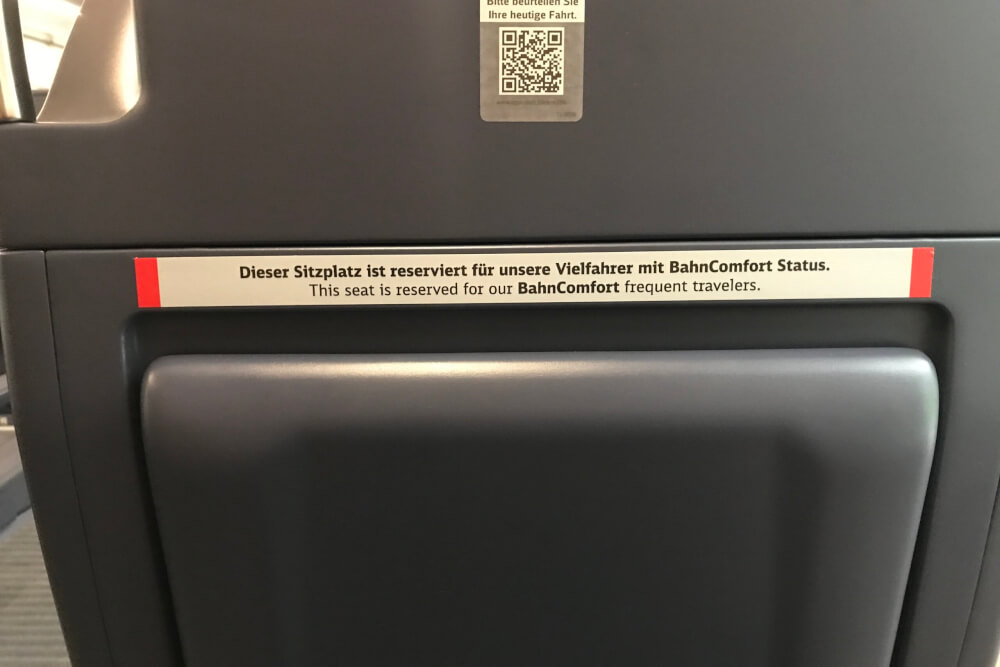
Now finally, onto…
Step Eight: Get Comfortable and Enjoy the Journey!
Once you’re all settled, you’re now in a good place to enjoy some of the hidden features and amenities of your train.
Okay, I say “hidden”, but what I mean is they’re easy to miss, especially if it’s your first time on board a German train.
So, be on the look out for…
Coat hooks: These can be found on the wall next to your seat – sometimes they may need to be pulled out. You can leave coats, scarves, etc. on those
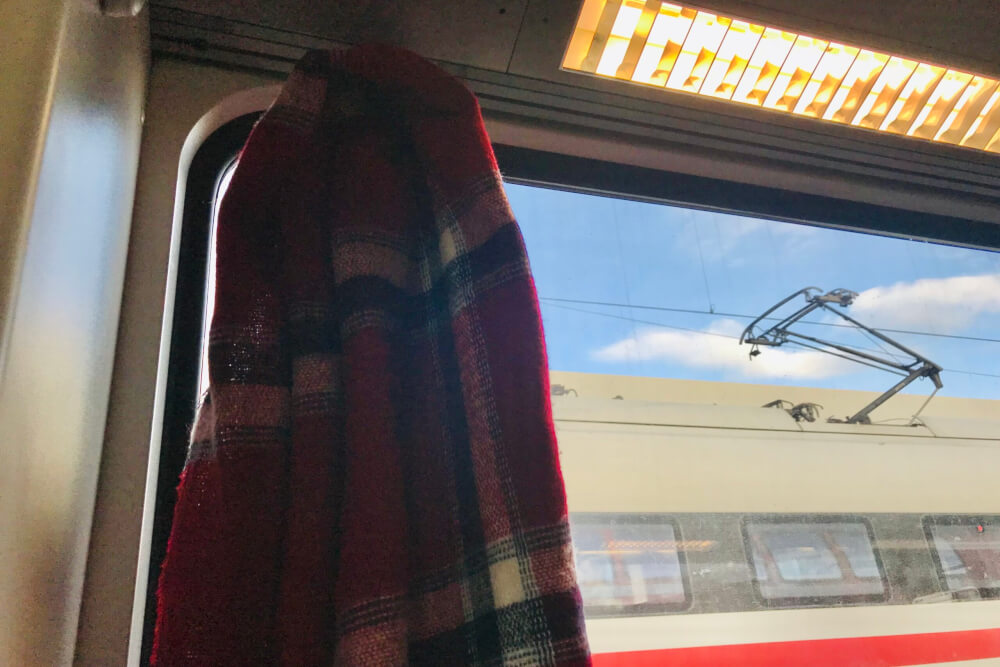
Plugs: Most trains will have an area to charge electronics. On ICE trains, usually the charging ports are in the middle part between two seats. On regional trains, the charging ports can often be found between seats or on the wall.
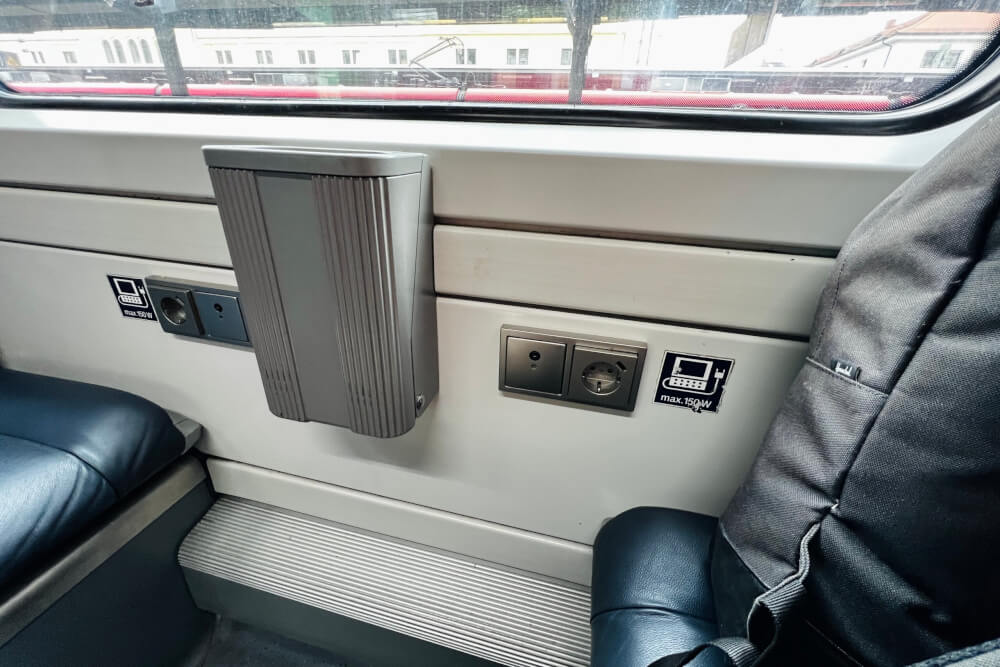
WiFi: Most long distance trains will say they have this but the quality is questionable depending on where you are. Many S-Bahn routes are starting to get WiFi too. Like with modern dating apps, be sure to try connecting, but don’t get your hopes up.
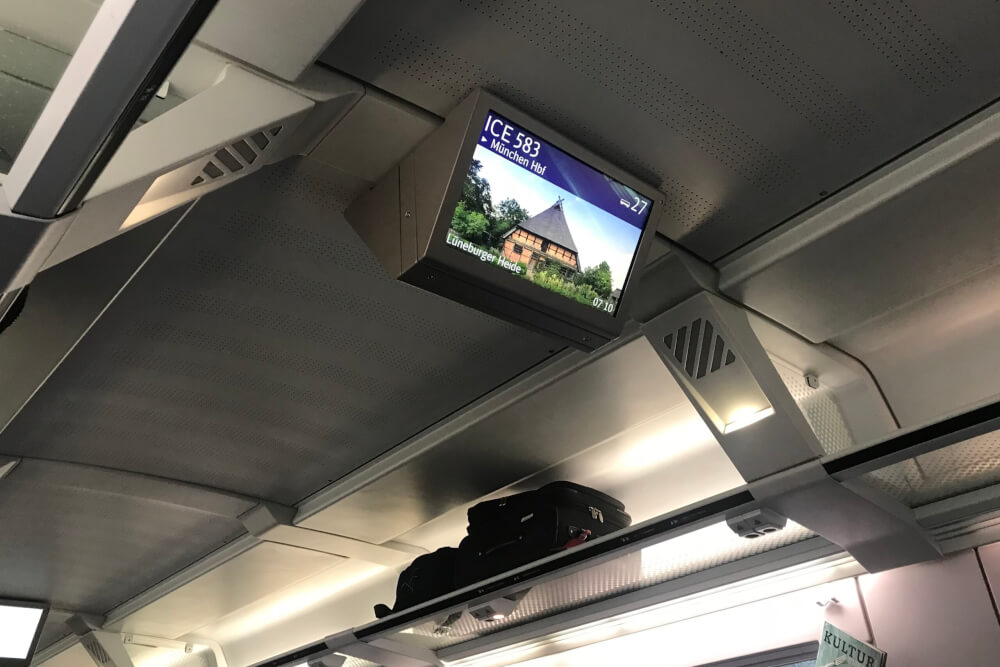
On-board restaurant or bistro: You’ll find these on long distance trains, and if you sit in first class, there’s often even table service straight to your seat.

Bathrooms: And of course, don’t forget to look for the on-board bathrooms (which are free). They’re typically marked by signs saying “WC”.
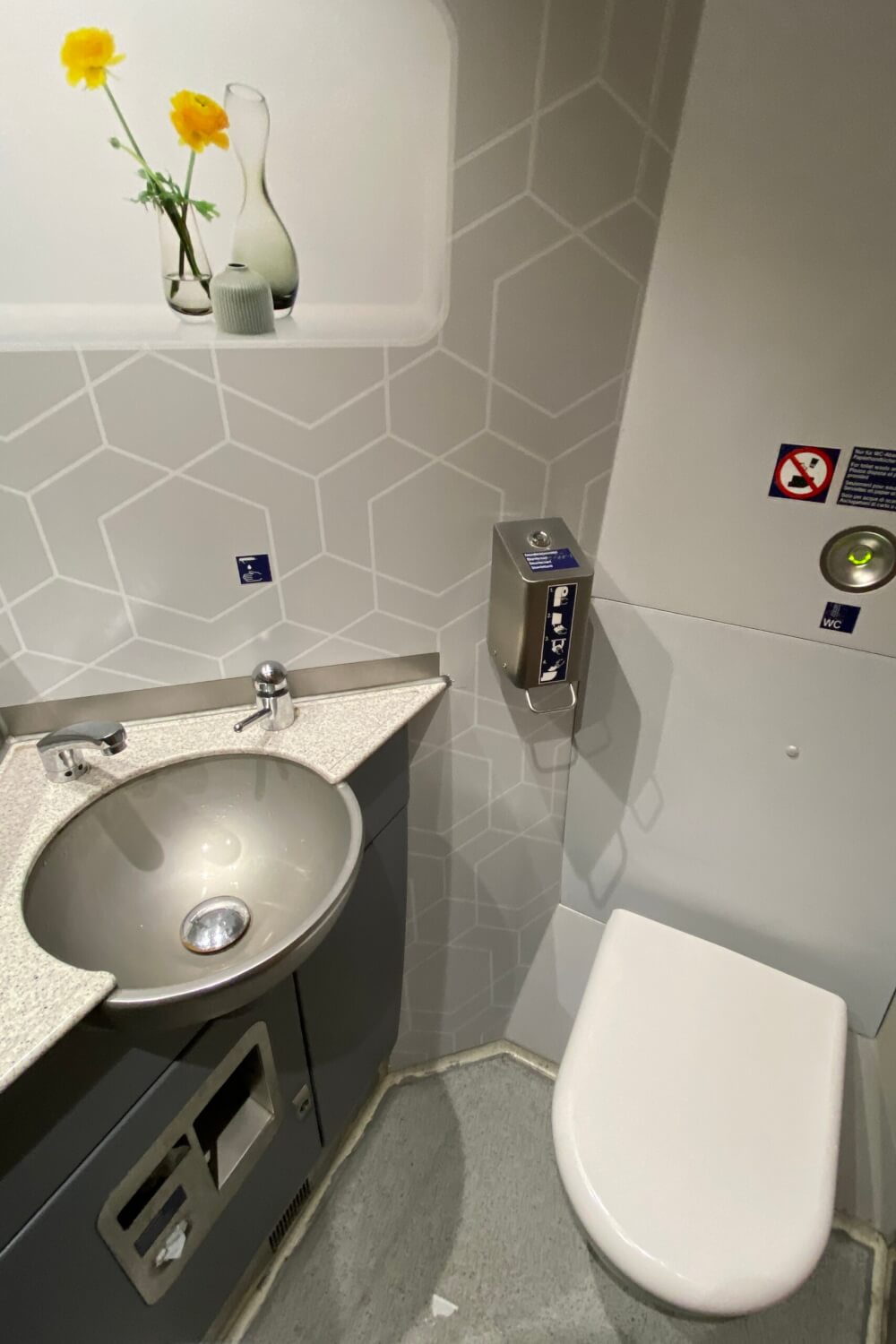
Now, as you get comfy, keep your ticket and ID handy in case controllers come on board. With long distance trains, you’re often able to check yourself in on the app so you don’t have to worry.
Otherwise, you just wait for a controller to come, at which point you show your ticket.
Getting your tickets checked by a controller tends to happen more often in high speed or long distance trains than the regional ones, but regardless just make sure you have your ticket and also some ID (preferably your passport) on you.
Sometimes they will want to verify your name if it’s a reserved ticket, and your age/residency as well depending on whether or not you’ve purchased a discounted fare.
I’ve had it before where they didn’t accept foreign IDs like driver’s licenses – only passports, so that’s why I’d recommend having that.
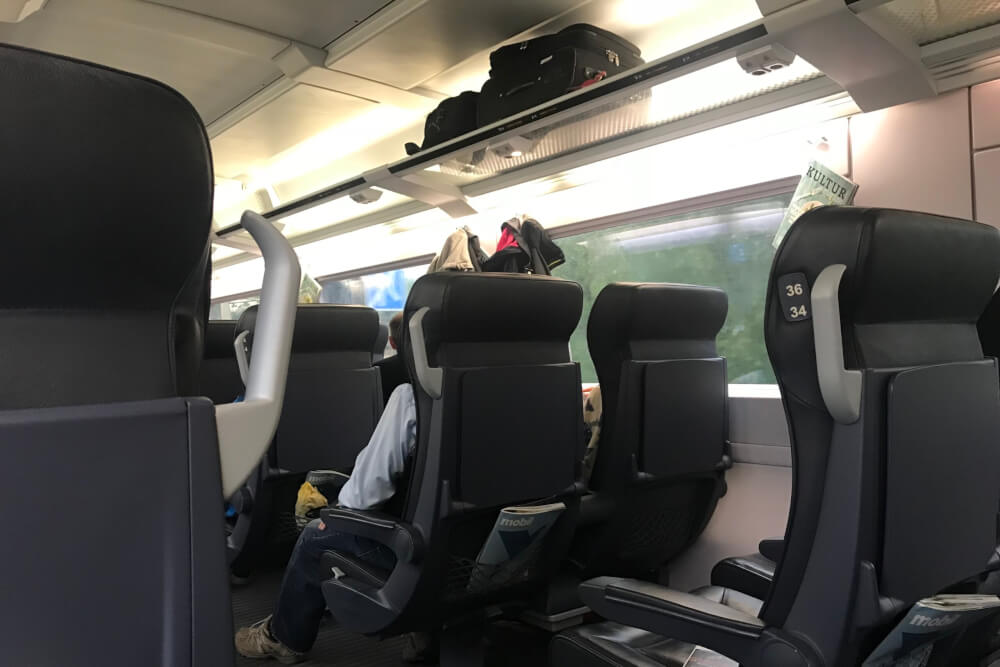
Now after your journey is complete, it’s onto…
Step Nine: Disembark
If you are not getting off at the end destination, then start prepping for disembarkation about 10 min before your arrival time. This gives you plenty of time to gather your belongings and bags in a rational, non-crazed manner.
To keep track of what time you’ll be arriving, keep an eye out for screens that show the scheduled arrival time/estimated arrival time.
Make sure you memorize the name of the stop you’re meant to get off at because most major German cities have multiple train stations and it gets a little confusing once you’re in the city. Like in Munich, you could accidentally get off at the East station instead of the Central Station, just because the names start the same.
And if you’re transferring onto another train, keep an eye out on signs/listen for announcements just before your arrive at your station because they will usually tell you which platforms to transfer on, and if there are any delays/disruptions for transfers.
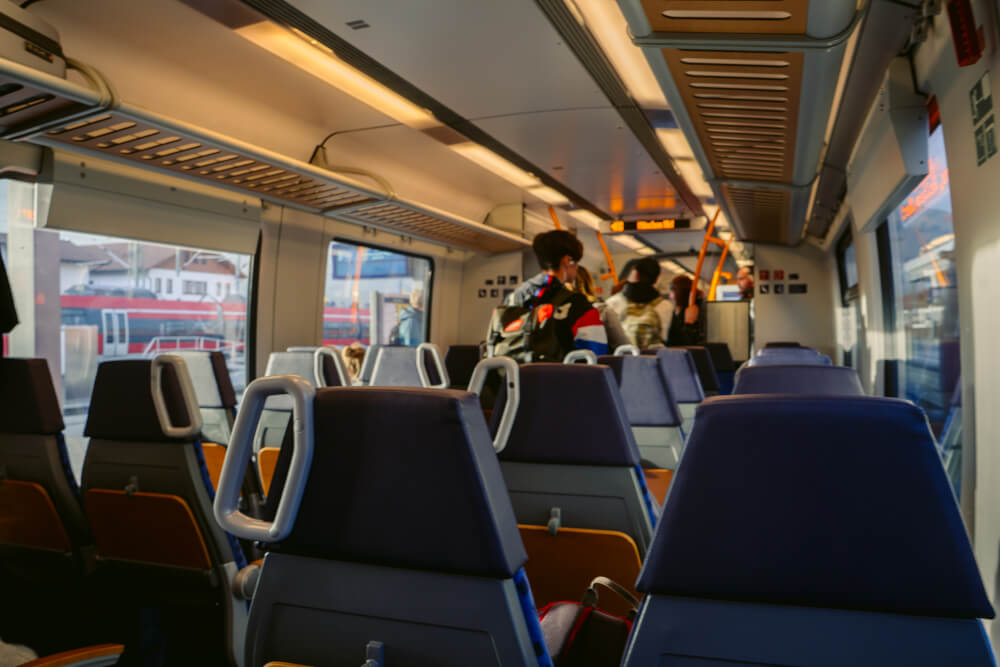
Upon arrival, if the door isn’t opening then again look for a button with the <> open symbol.
Once the doors are open, be careful getting off the train as there’s often a gap/step.
To navigate your way off the platform and onwards to wherever you need to go, keep an eye out for signs that will point you in the right direction.
If you are transferring onto another train, look around for big signs pointing to different platform numbers. If it’s a tight connection (10 min or less) you may want to speed walk or run, depending on how big the station is.
NOTE: Remember, you’re on a train platform, so to reach other platforms you need to either go via a tunnel underground or sometimes a bridge above ground. Keep an eye out for stairs/an elevator so you’re not panicking to find ways to reach your next platform.
If this is your final destination but you need a place to drop off your bags while you explore, most major train stations will have a paid left luggage area with lockers, which is great if you’re too early to check in to your accommodation, or just dropping in for the day.
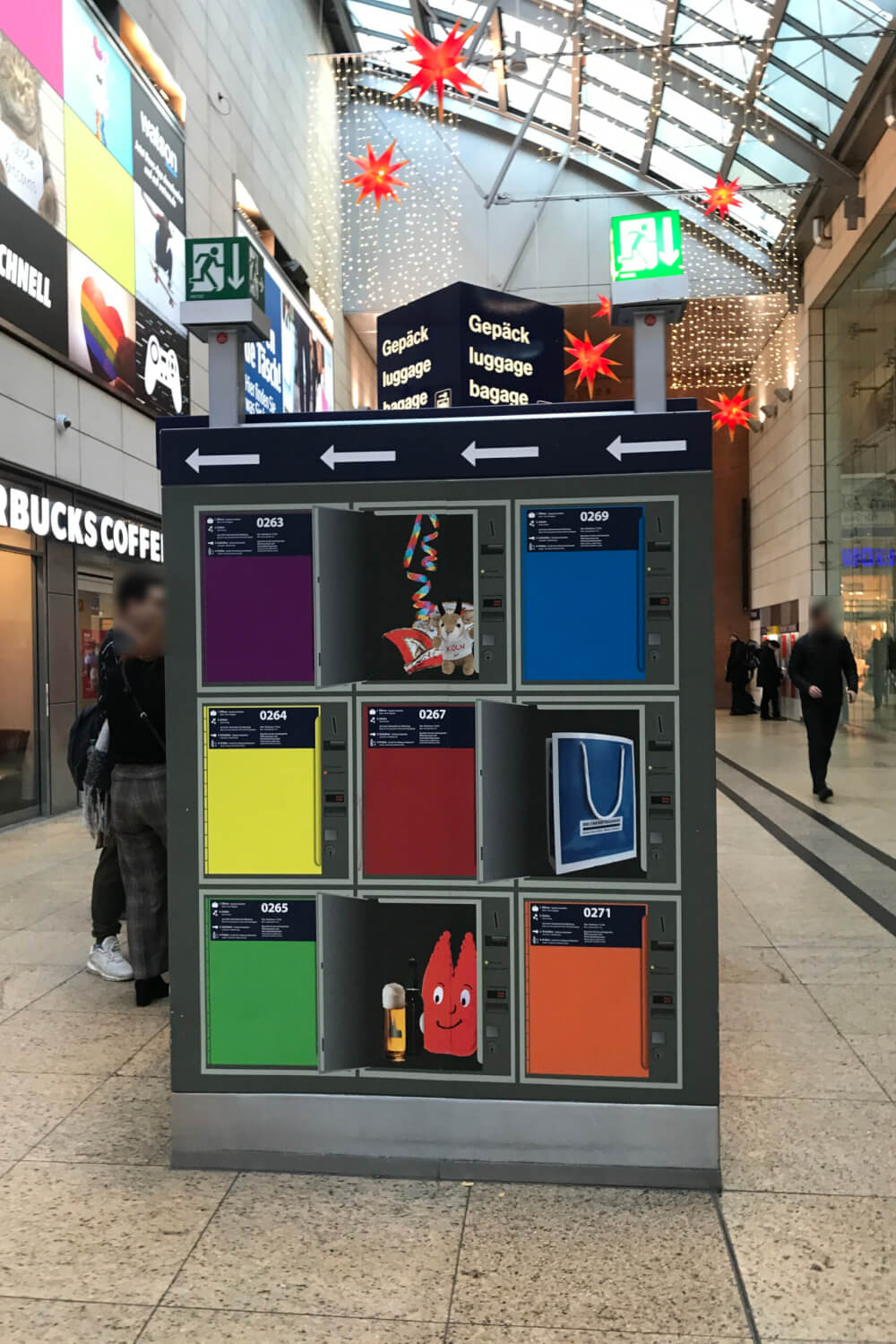
Remember that your train ticket is usually only valid for that specific train you boarded, so you won’t be able to use it for onward travel on the metro or bus unless you bought a special regional ticket or a City Ticket add-on.
Lastly, take note that in Germany, if the train is more than an hour delayed, you are entitled to compensation. Just make sure you get some proof of the delay, whether through an employee or through photos of signs showing the delay. You can then fill out a form or claim compensation through your DB app.
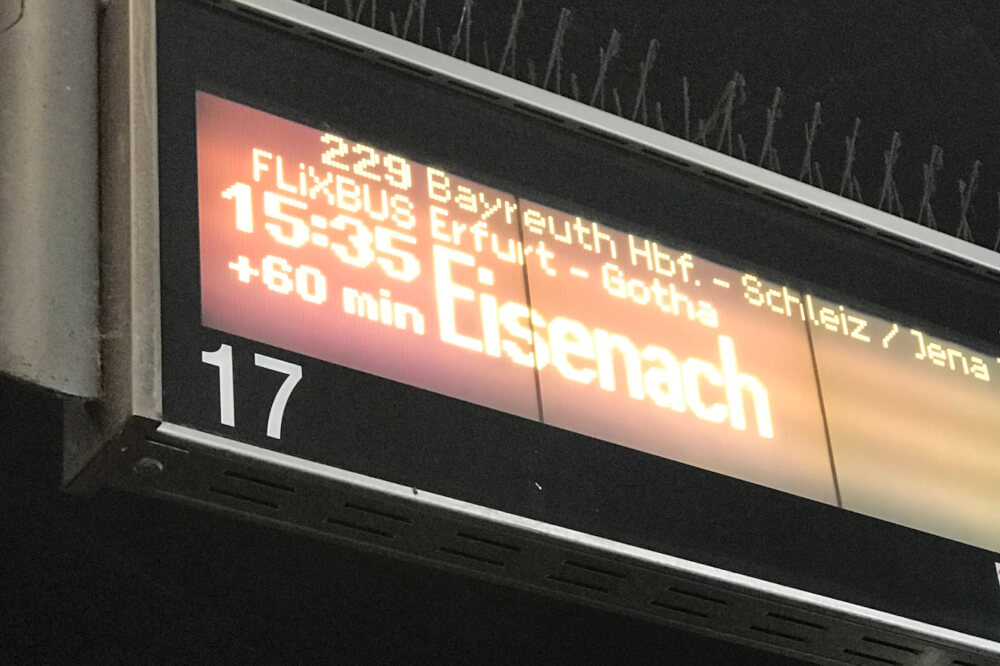
Final Tips for Taking the Train in Germany
Alright, we’ve gone through ALL the basics so now I’m going to simply leave you with some extra bonus tips on how to make the most of the German rail system!
Learn basic train-related vocabulary
The German rail system is very English-friendly for the most part, with many trains making announcements in English and most train attendants speaking at least some English as well.
That said, when you’re in a panicked state dealing with travel stress, sometimes it IS helpful to know some basic words, so here are a few to keep in mind that may be useful:
- Bahnhof: Train Station
- Hauptbahnhof (HBF): Central Train Station
- Gleis: Platform
- Abfaht: Departure
- Ziel: Destination
- Einsteigen : To board
- Aussteigen : To disembark
- Umsteigen : To change/transfer
- Zurückbleiben – To stand/stay back
- Endstation: Final stop
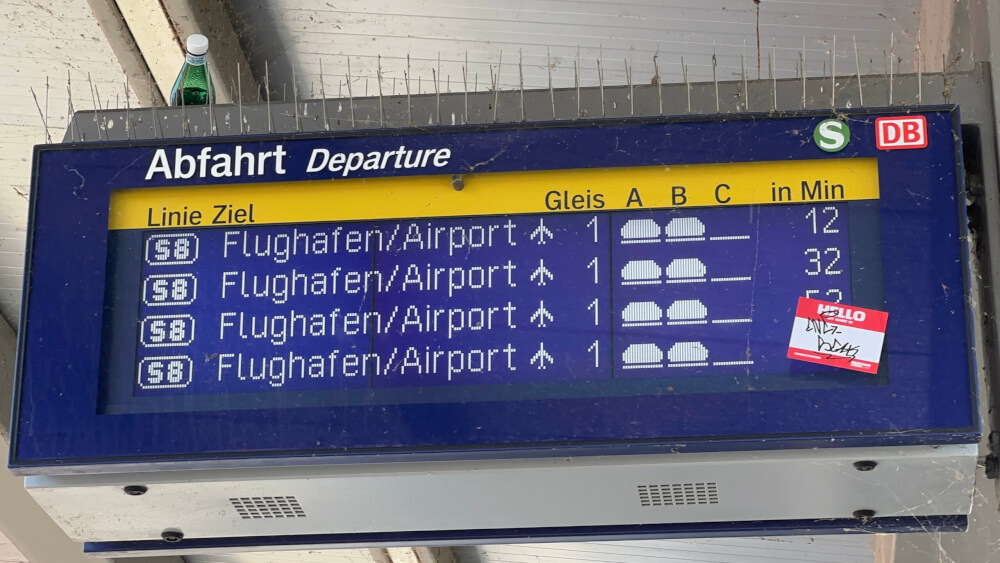
Download the DB Navigator App
I’ve said it so many times already, but the DB Navigator App is an amazing tool, and well worth downloading even if you’re only taking a few trips.
Google Maps does sync train info but it’s sometimes inaccurate or incomplete. The DB Navigator app is free and simple to use, plus it unlocks a bunch of bonus perks like self check-in. Highly recommend!
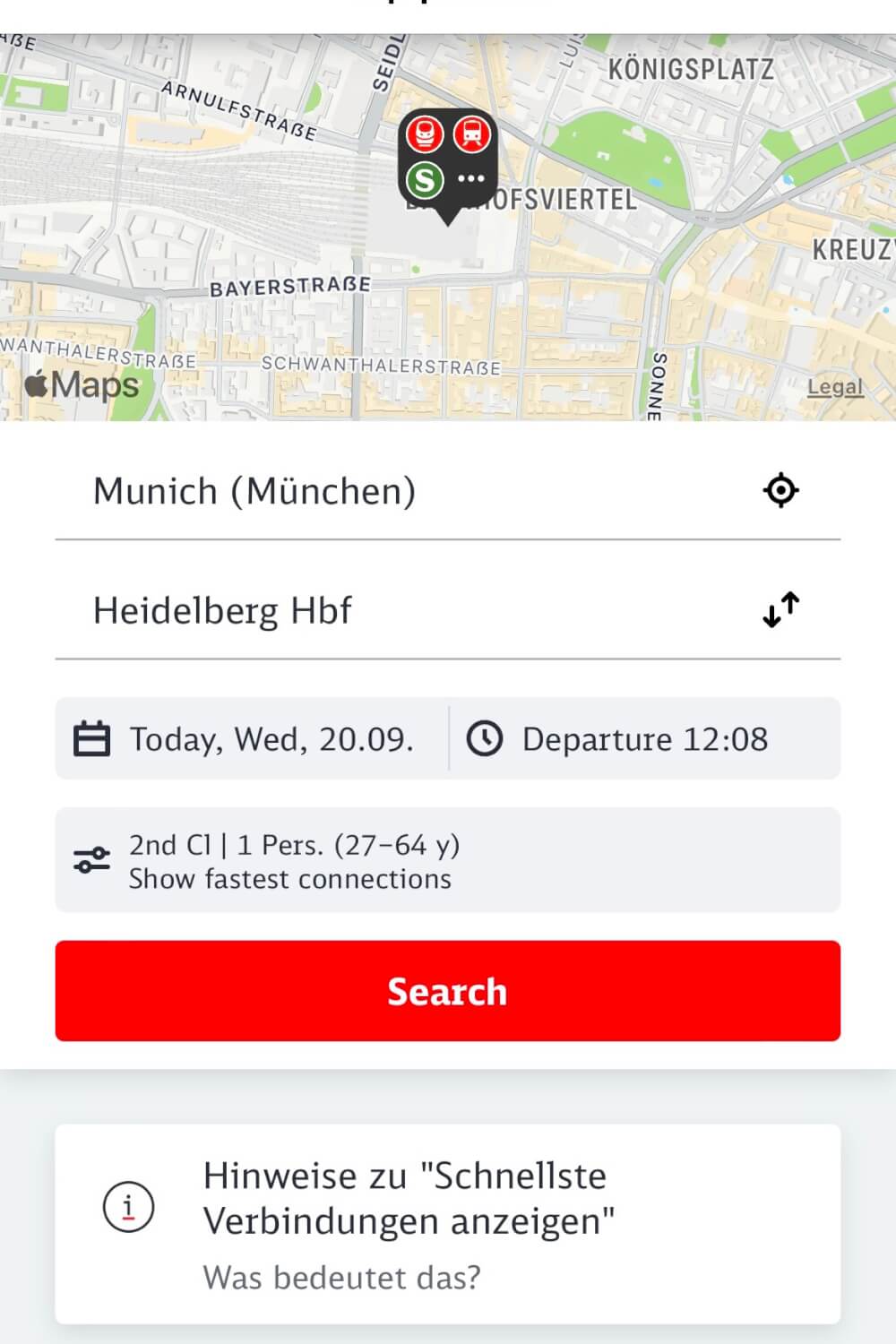
Make use of helpful search filters to find the right train
If you’re struggling to choose which trains to get, then the good news is there are many helpful tools built into the DB website/app.
If you’re travelling exclusively with a Regional Ticket or Deutschland-Ticket for instance, it may be helpful to click on “Mode of Transport” and then set it to “Local Transport Only” which will then filter out high speed trains and show you only the trains you can take with one of those tickets.
You can also ask them to only show the fastest connections, direct services only, trains with a minimum transfer time, or even specify what stopovers you want.
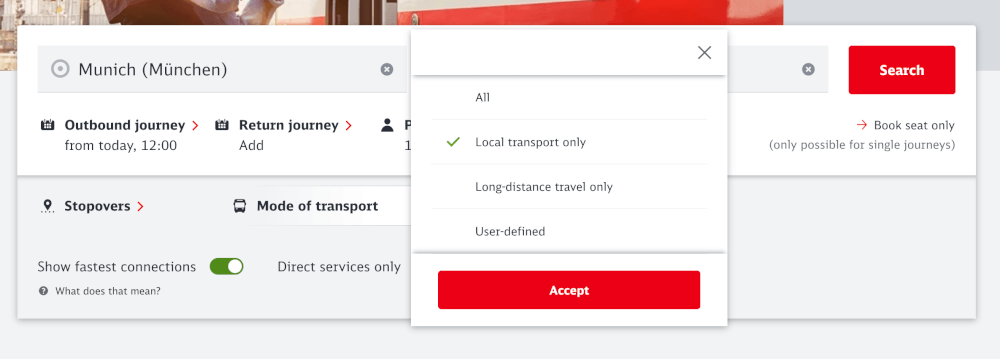
Avoid peak times
As a tourist, you have the luxury of flexibility, so try to plan your train trips around when other people aren’t travelling.
This will ensure the least stressful experience, and make sure you have room for you and your bags.
Some times to avoid include:
- Early morning (to avoid business travellers)
- 3-4pm during school days
- Early evenings just after work (again, to avoid business travellers)
- Weekends (Friday & Sunday evenings, plus Saturday & Sunday mornings especially)
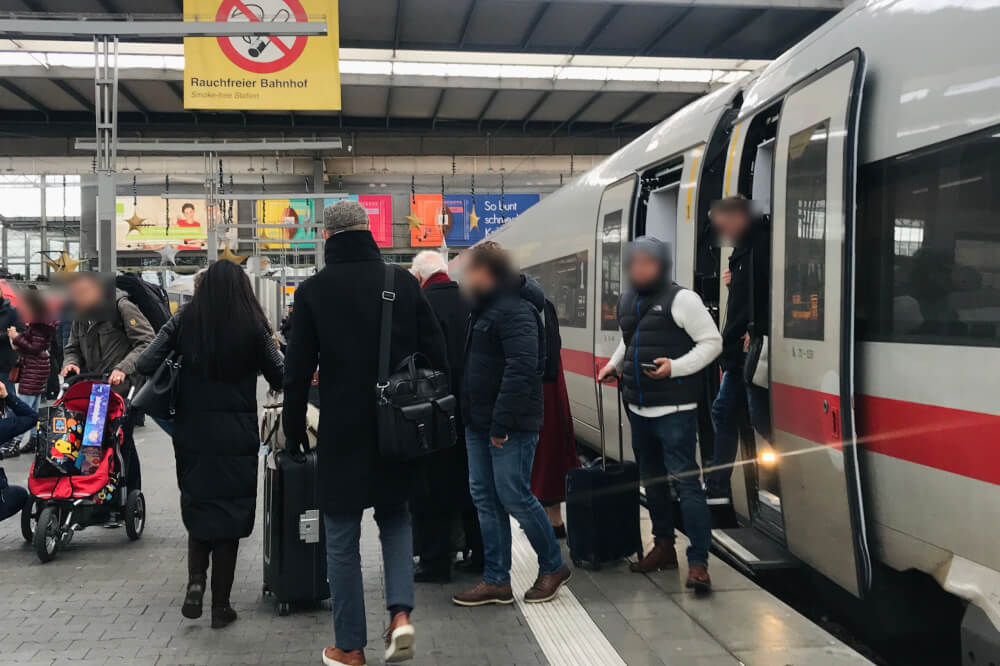
Use the bathroom on the train – bathrooms at the station cost money
As I mentioned in my Germany must-knows post, free public restrooms are quite rare in Germany, which means you’ll usually have to cough up 50 cents or more to pee at train stations.
NOTE: If you do end up using a paid train station toilet, usually the machine will print you a little coupon to use on a future purchase, so if you need to go, head to the toilet first before buying your train station snack.
Luckily, trains on board are free! So take care of business before disembarking.
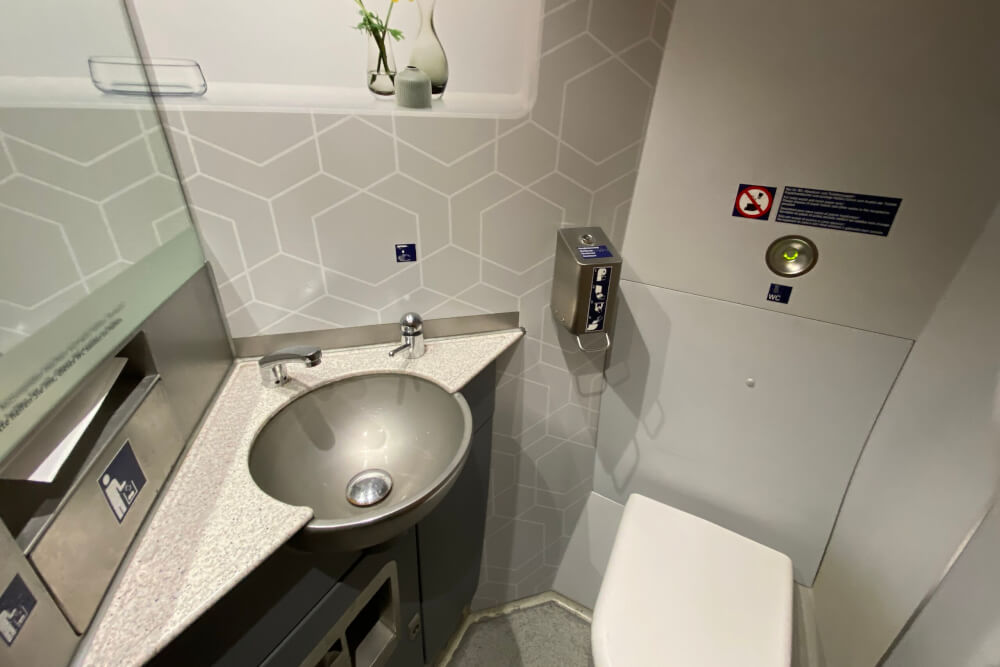
Don’t forget ID
Again, remember to have ID on you, even if it’s just a little day trip. Sometimes they will ask to see it.
NOTE: You might assume a driver’s license is okay, but I’ve had several instances where they’ve insisted on a passport because they don’t recognize foreign IDs.
It kind of depends on who checks you and how cranky they’re feeling that day, but if you’re from outside the EU, it’s a safer bet to just bring your passport… especially because it’s Germany, and your train might accidentally cross into Austria or something without you noticing.
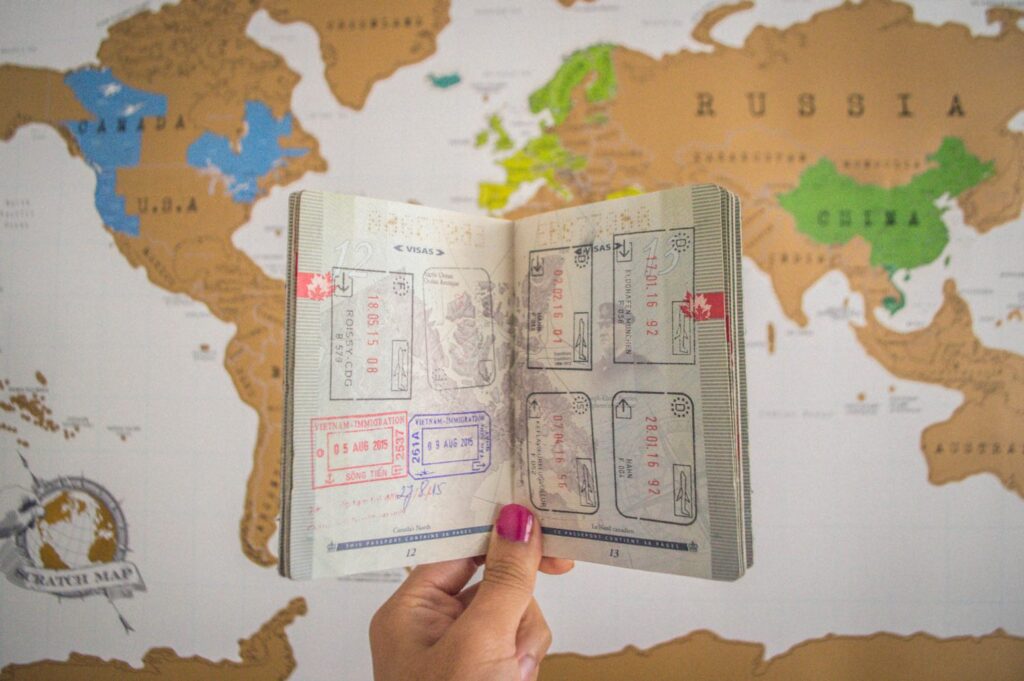
Beware of putting your bag in places you’re not supposed to
One time, I had a suitcase that was too huge and heavy to put in the overhead compartment, so I left it in the bike zone as no one was using it.
About an hour later, a cyclist got on and shouted at the top of his lungs “WHO IS THE HUMAN TRASHBUCKET THAT LEFT THIS SUITCASE HERE?” (Okay, just kidding – my German is bad and he probably didn’t phrase it like that but his tone did).
I was terrified, and was sitting pretty much right next to the suitcase. I had to meekly say it was mine and had the poor dude next to me try to hoist and cram it up in the overhead shelf.
I still have nightmares about it to this day.
So yes, don’t leave your bags where they’re not meant to be.
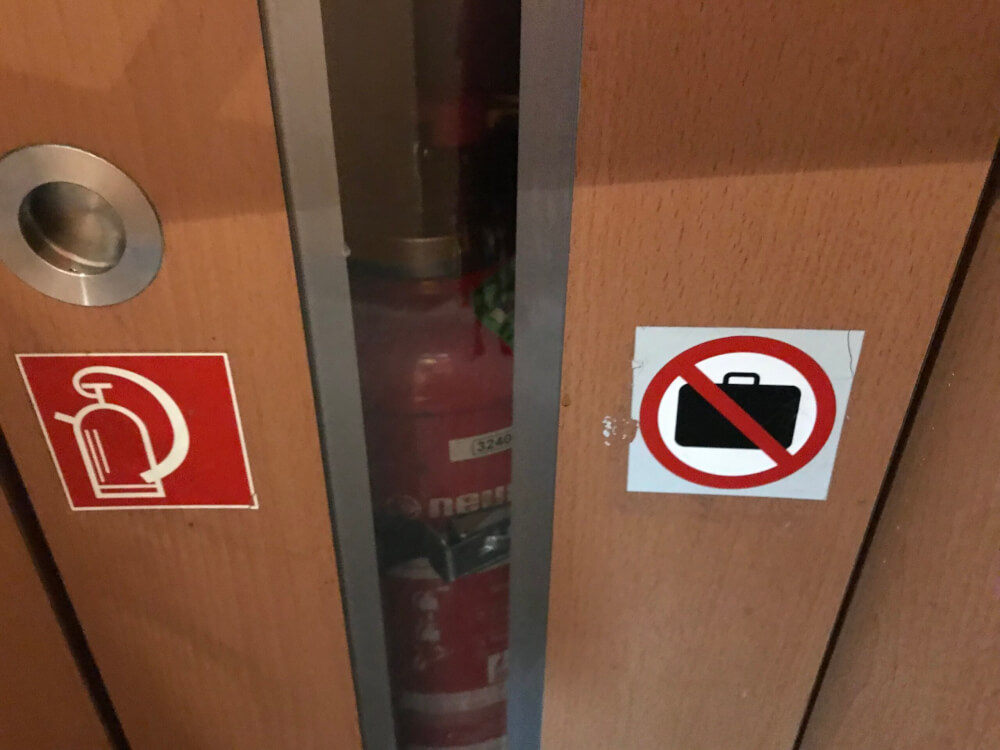
Learn the names of your destinations in German
Most places like Berlin or Frankfurt have the same name as in English, others like Munich (München) or Cologne (Köln) have a different name in German, so make sure you know the German name of your destination, and how to say it in German in case you need to ask for directions.
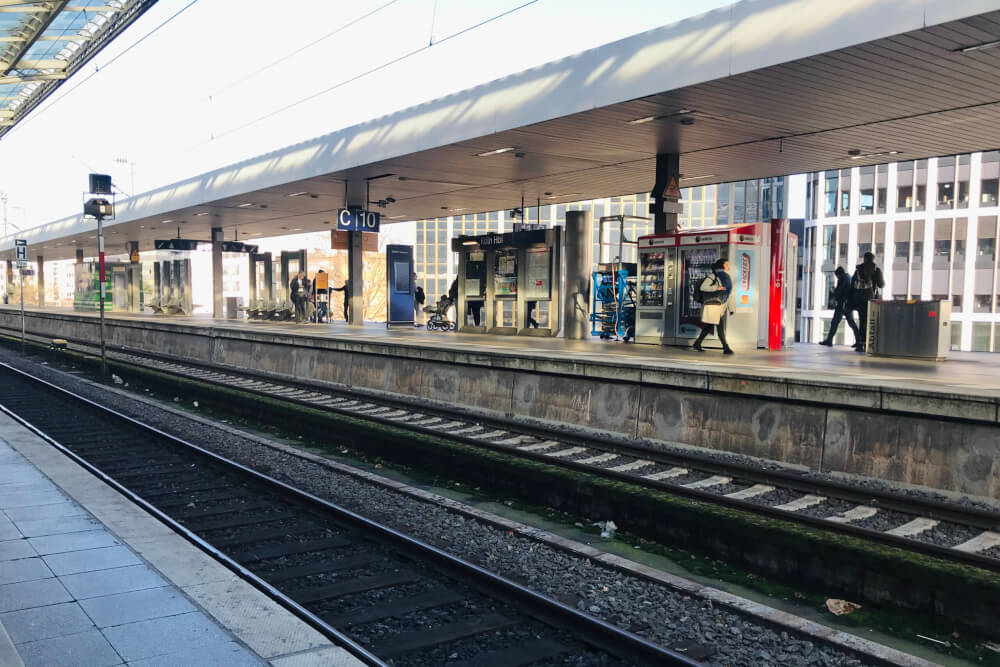
Similarly, learn how to say the names of trains the German way
For instance, ICE trains are not “ice” trains, but rather pronounced Ee Tsay Ay, like the German way of spelling it out.
Be sure to also ask for the U-Bahn, not the subway or Metro.
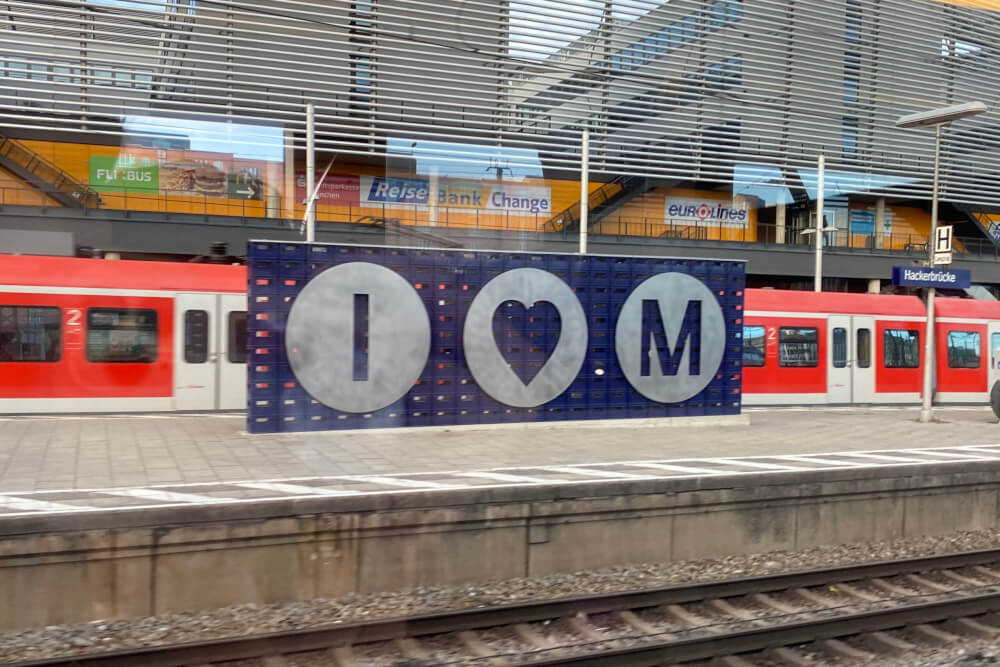
Don’t bank on the WiFi
The WiFi on German trains is hilariously bad considering how much you pay for those tickets… but yes, don’t rely on having WiFi (like setting aside a bunch of work to do on the train that requires it).
Cell service tends to be quite poor as well once you’re away from the big cities.
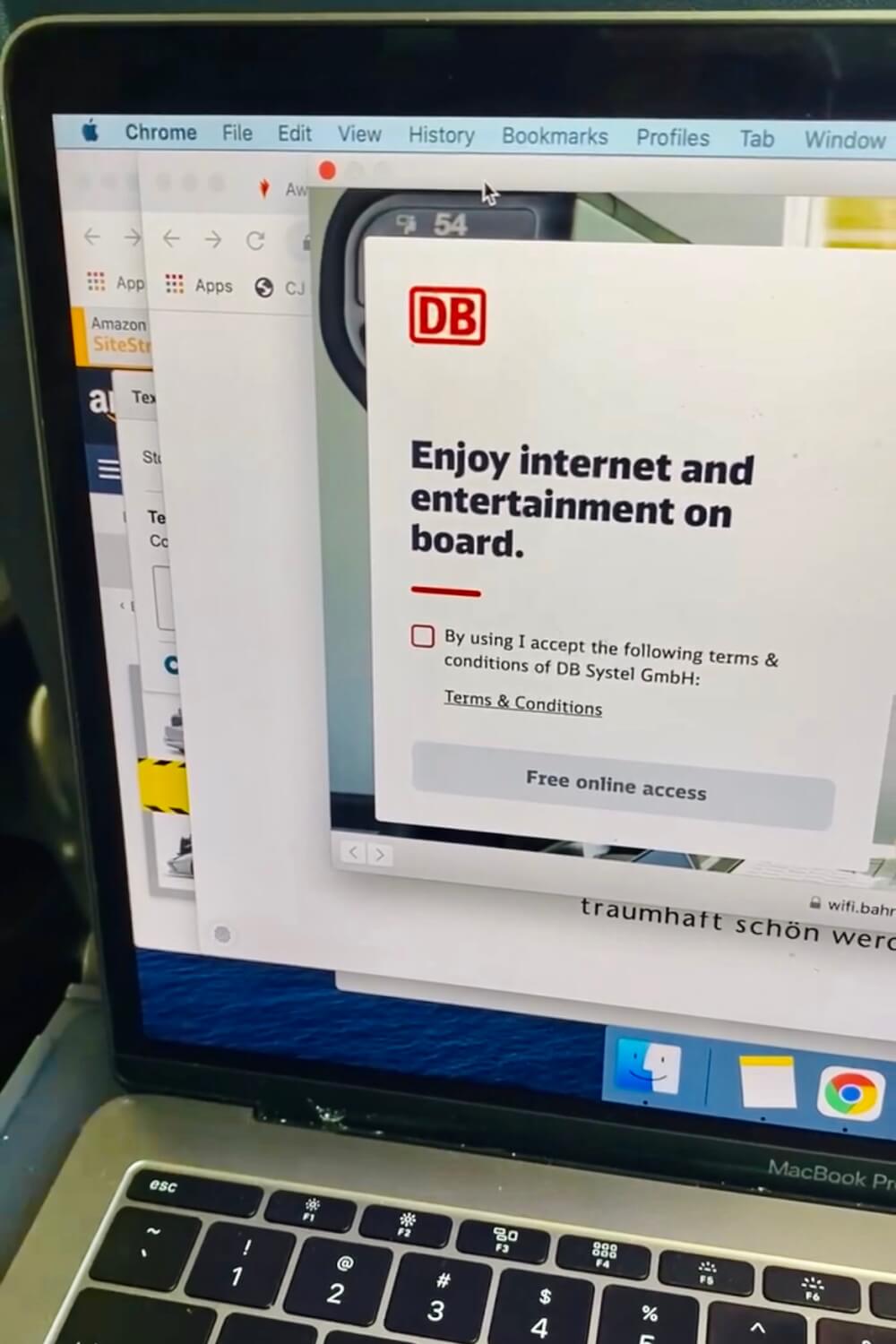
Know your route and stops
The last thing you want to do when travelling by train in Germany is relying solely on the announcements to know when to get off or what to do.
Seriously, mumbling seems to be a skill requirement for workers of DB. Mixed in with ambient train noise and the screeching of rails, I have had it far too many times where I’ve been unable to hear anything the conductor is saying.
They also seem to randomly translate in English when they feel like it, so a translation isn’t guaranteed if you don’t speak German. So, make sure you know your route and approximately when you’ll need to get off, transfer, etc.
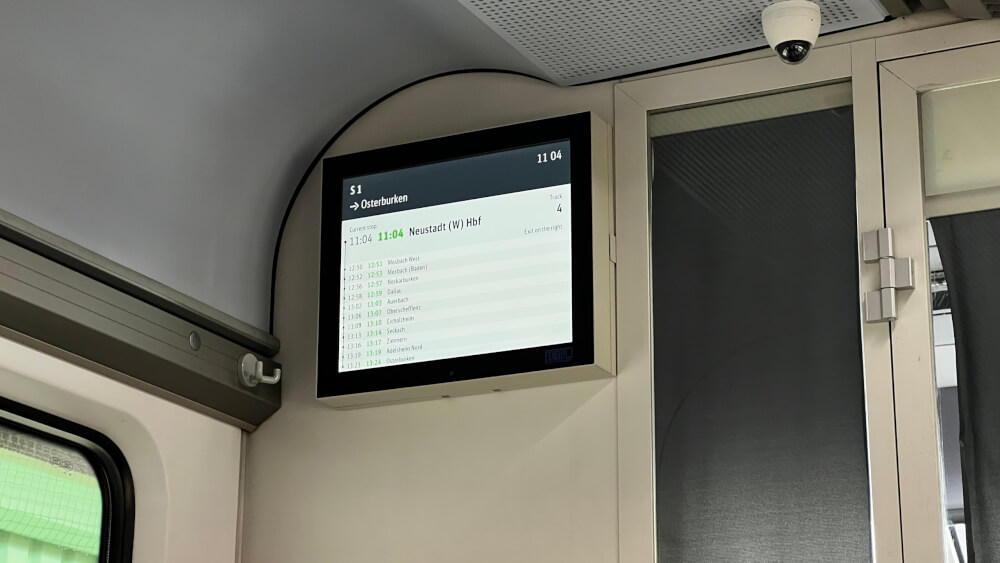
Beware of “on demand stops” where you must press a button for the train to make your stop
Very rarely, you may come across stops that only stop when someone requests it. These are known as Bedarfshaltestellen .
This shouldn’t be a concern unless you’re travelling to very small, quiet stations, so I wouldn’t worry too much, but if you notice anything on your ticket that mentions the word “Bedarfshalt” or any signs that say “”Der Zug hält nur bei bedarf” (the train only stops on demand) then be prepared to press a special button before your stop, kind of like on a bus.
If you are boarding at one of these Bedarfshaltestelle , then don’t worry – the train will stop so long as they see you on the platform.
I had this (stressful) experience when I travelled to Untergrainau:
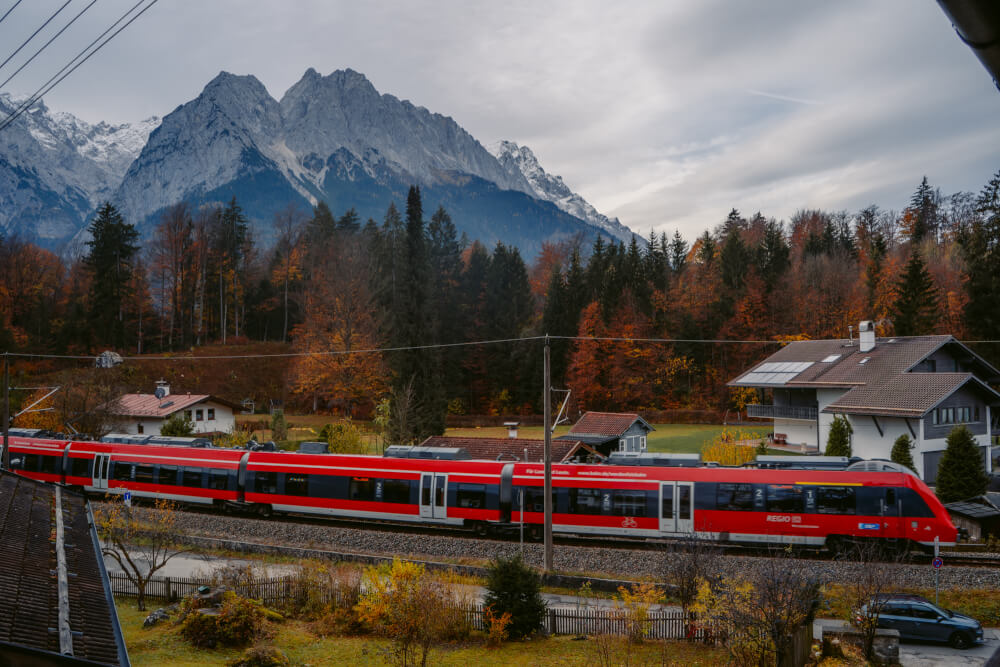
Always read the fine print
Lastly, especially when buying discounted offers for German trains, be sure to read the fine print!
With regional tickets for instance, it’s very common for there to be time restrictions on when the ticket is valid, or when it expires.
Likewise, there’s often restrictions on which types of trains you can take with your ticket, so be sure to read up on these or you may be fined as your ticket will be considered invalid.
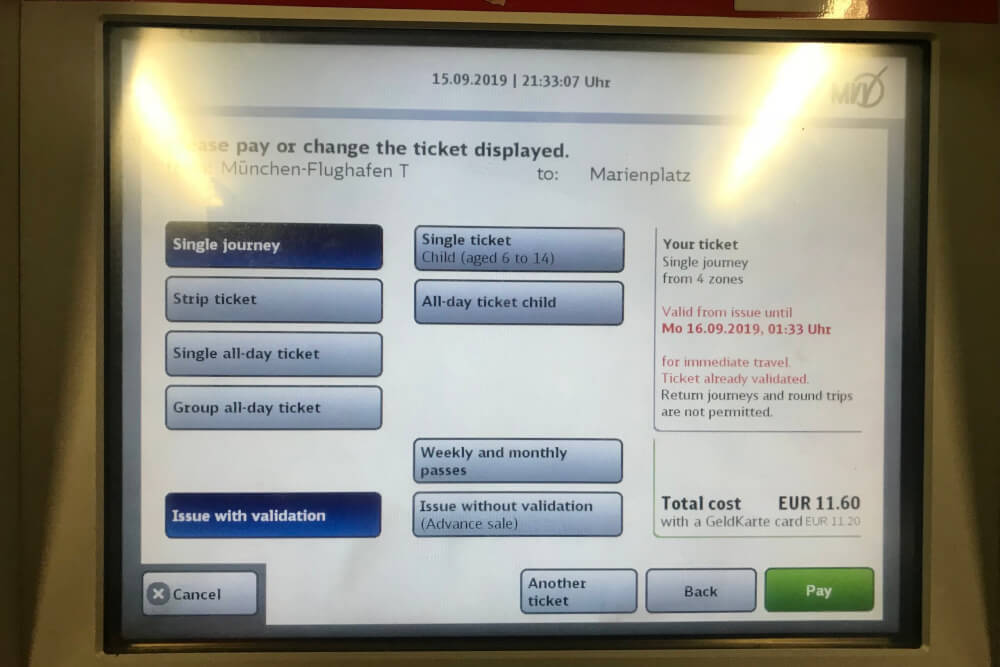
I Hope This Step by Step Guide on Taking Trains in Germany was Helpful!
Let me know in the comments if you have any more questions.
My Go-To Travel Favourites:
🧳 Eagle Creek: My favourite packing cubes
💳 Wise: For FREE travel friendly credit cards
🍯 Airalo: My go-to eSIM
🏨 Booking.com: For searching hotels
📷 Sony A7IV: My (amazing) camera
✈️ Google Flights : For finding flight deals
🌎 WorldNomads: For travel insurance
🎉 GetYourGuide: For booking activities
2 thoughts on “How to Take the Train in Germany: A Step by Step Guide!”
Thank you so much for putting this post together. This was extremely helpful for planning some train travel in Germany. The information is really clear and the pictures are super helpful.
So glad you found it helpful!! Safe travels 🙂
Leave a Comment Cancel reply
By using this form you agree with the storage and handling of your data by this website. *
Travel to Europe your way
Pre arranged tours for individual travellers
9-Day German Highlights 1st class Rail & Cruise (9R03)
When we call this 1st-class Rail tour and Rhine River Cruise the German Highlights it is a name that is well deserved!

Rhine River © Thomas H. Giesick
This charming tour starts and ends with transfers from/to Frankfurt International Airport right to/from your first hotel in Germany. You will begin your tour in the Rheingau Wine Region staying in beautiful Rudesheim am Rhein – located right at the Rhine River. On Day 2 you enjoy a beautiful Rhine River Cruise , and this is only the start. All your rail journeys will be in First Class and the tickets will includes seat reservations for you on all High-Speed “ICE” and speed rail journeys. You will visit the Romantic Road , with stays in Wurzburg and Rothenburg ob der Tauber , where you will enjoy the English-speaking tour with the Night-Watchman . Among the many sights you visit is the Imperial Castle in Nuremberg , Nymphenburg Palace in Munich , Linderhof Palace , close to the mountain resort of Garmisch-Partenkirchen and Neuschwanstein Castle – a true highlight! A day trip from Munich will bring you to Salzburg where you join the 4-hours Sound of Music tour. When you leave Bavaria to travel towards Frankfurt International Airport you will have a night in Heidelberg where you have time to visit the Old Town and Heidelberg Castle!
For detailled information what exactly is included in the price of this 1st-class Rail tour please see the tableau this is already included in the price of your tour . Here you also find everything else that is included: transfers, rail tickets, tours and admissions.
Price per Person
View 9 Day German Highlights 1st class Rail and Cruise (9R03) in a larger map
Day 1 Frankfurt Int. Airport / Rudesheim
Your German Highlights 1st-class Rail & Cruise vacation package will start with a private transfer right from Frankfurt International Airport (FRA) to your hotel in beautiful Rudesheim am Rhein. Rudesheim is not only famous for its “ Drosselgasse ” (a lively alley with restaurants and taverns stretching from the river into Rudesheim Old Town). Rudesheim am Rhein is also famous for its scenic location in midst steep vineyards along the Rhine River and for the Riesling which is grown here. The Riesling is a dry white wine which is very popular in Germany.
Depending on your arrival time at Frankfurt Airport you have time to explore the Old Town of Rudesheim and also maybe take a walk into the vineyards from where you have great views of the Rhine River and the scenic area surrounding it. If your arrival in Frankfurt is before noon you may consider taking a funicular ride up to the “ Niederwalddenkmal ”, a monument which was constructed to commemorate the foundation of the German Empire. From next to the “Germania” figure you have a great view over Bingen (across from the Rhine river). In the evening make sure to try a glass of Riesling and enjoy dinner in one of the many wine taverns , e.g. at the Wine Restaurant Rudesheimer Schloss where you will find local specialties as well as German “ Gemutlichkeit ”.

Niederwald monument, Vine tasting, KD Rhine River Cruise © Thomas H. Giesick
Day 2 Rhine River Cruise through the Upper Rhine Valley
A Rhine River Cruise is scheduled for Day 2 of your 1st class Rail & Cruise Vacation Package. A cruise ship of the “Weisse Flotte” ( White Fleet ) operated by the largest Day-Cruise company – the “KD”, Koln-Dusseldorfer – will take you from Rudesheim am Rhein thru the very scenic and romantic Upper Rhine-Valley, a UNESCO World Heritage Sit e. The cruise follows the Rhine downstream for 33 kilometers (20.5 miles) to St. Goar which is located across from the famous Loreley Rock . Along this cruise you will get off the Cruise ship three times to visit scenic wine villages along the way. For your visit of Oberwesel , St. Goar and Bacharrach you have about two hours in each of the villages. Total cruising time will be a little more than 4.5 hours (both ways), 1:40 hours downstream and almost 3 hours upstream. So actually on your way back from St. Goar you will have more time to see the historic villages, castles, ruins and landscape. We will provide you with detailed tour information for this Rhine Cruise so you will be able to identify the Castles and historic sights you see along this beautiful Rhine River cruise! You will be back in Rudesheim am Rhein in the evening – right in time to get ready for another night in this scenic wine village.
Please note: the Rhine River Cruise is not operating during winter time. If you plan to book this tour during winter time we will arrange a day trip by rail to Koblenz. The rail tracks run right along the Rhine River so you will have great views along the way.

Wurzburg Residence and Rothenburg ob der Tauber © Romantische Straße Touristik Arbeitsgemeinschaft GbR
Day 3 Wurzburg
Take a train from Rudesheim to Wurzburg. Travel time is about 2,5 hours. The city is idyllically located in the midst of vineyards , with the medieval Fortress Marienberg towering above. Wurzburg is an old bishop’s seat and a lively town, proudly presenting monuments of different eras. Culture, art, history and hospitality are ever-present in this remarkable city! Fortress Marienberg (admission included), Wurzburg´s landmark, has of course changed its appearance a great deal since it was first mentioned, today the oldest part of the fortress is the “ Rundkirche ” (round church) which was built in the year one thousand. The Cathedral , the Marienkapelle, the “ Alte Mainbrucke ” (old bridge across the river Main ), the Juliusspital and the “Kappele” are musts, but make sure that you do not miss out on the “ Furstbischofliche Residenz “, Prince Bishops Residence (admission included). This “Palace above all Palaces” is today a UNESCO World Heritage Site. Enjoy this beautiful town which offers not only cultural but also culinary highlights such as the hearty cuisin e and, of course, the world famous Frankenwein (Franconia wine!).
Day 4 Rothenburg ob der Tauber
By regional rail you will get from Wurzburg to Rothenburg ob der Tauber. The Bavarian medieval town is definitely a highlight along your tour. Your charming Hotel is located in the Old Town of Rothenburg ob der Tauber ( within the City Wall ). Taking a walk thru this charming little town is truly a journey back in time. Rothenburg ob der Tauber was once a powerful free imperial town and its monuments, landmarks and buildings still bear witness to these days. Marvel at the half-timbered buildings and on top of the historic town walls which are withstanding time since hundreds of years. Visit the town’s most famous spot, the Ploenlein square , probably the most photographed place in Rothenburg ob der Tauber. Also very interesting to see is the Spitalbastei Gate , created by Leonhard Weidmann, the latin inscription on the gate reading: ” Peace to those who enter, health to those who leave”. The Gothic St. James Church is the town’s most prominent church, here you can take a minute and relax in quietness while you enjoy the beauty of the famous Altar of the Holy Blood and the Twelve Apostles Altar . Rothenburg ob der Tauber also offers museums which are cultural highlights, such as the Doll and Toy Museum where the history of playthings is shown, as well as the Crime Museum , where the visitor gets an insight into the law and especially its execution during the last 700 years. In the evening take an English-speaking tour with the Night-Watchman (included).
Day 5 Nuremberg
By Rail it takes less than 1,5 hours from Rothenburg ob der Tauber to Nuremberg. Your hotel is located in walking distance from Nuremberg Central Station (which is located just outside the Old City Wall surrounding Nuremberg Old Town and the Imperial Castle). Nuremberg’s history reaches back to the year 1050, its name “nourenberc” translates into “rocky hill”. Nuremberg’s famous landmark, the “Kaiserburg” ( Imperial Castle ), towers above the Old town, which is protected by the five kilometers long city wall, many towers and gates can still be visited. The medieval Castle is one of the most important imperial palaces dating from the middle ages from the 11th century (admission included). In the Third Reich Adolf Hitlers´Nazi Party had chosen Nuremberg for their Nazi Rallies and if you are interested in that part of history you may want to visit the Documenation Center Nazi Rally Grounds which are located just south of the Old Town.

Sebaldus Church, Imperial Castle and Heilig-Geist Spital Nuremberg ©Thomas H. Giesick
When exploring the beauty of Nuremberg’s medieval Old Town you may want to start right at the Koenigstor (“Kingsgate”) which is the gate right across from Nuremberg Central Station. From where the timber framed buildings, the Gothic Church of St.Lawrence and the Church of St.Sebaldus can be easily reached by foot. Right next to the Koenigstor is the Handwerkerhof (craft center), here you will feel like you are back in the medieval times, there are craft workshops like they used to have a long time ago as well as a gingerbread bakery. Make sure to enjoy a Nuremberg Bratwurst along with a beer or a glass of “Frankenwein” (franconian wine).

Neuschwanstein Castle © Romantische Strasse Arbeitsgemeinschaft Gbr, Linderhof Palace © Softeis via Wikimedia Commons and Munich Town Hall © Thomas H. Giesick
Day 6 Munich
On board of the High-speed train “ICE” it takes about 1 hour and 20 minutes from Nuremberg to Munich. The price of your tour already includes a ticket for unlimited free use of public transportation within Munich (also to Munich Int. Airport) as well as admission to many sights in Munich ( Munich Residence and Residence Museum, Treasury, Cuvilliés-Theatre , Hall of Fame and Statue of Bavaria, Nymphenburg Palace and Park, Marstallmuseum, Museum of Nymphenburg Porcelain) and with your tour package you will also receive walking suggestions for a self-guided walking tour through Munich City Center. Along this walking tour you will visit the Marienplatz with the New Town Hall (with the “ Glockenspiel ”), the Konigsplatz (King´s Square), cultural center in the 19th century and later, during the “Third Reich”, site of Nazi Party mass rallies and location of the Nazi Party headquarters in Germany, the English Garden as well as the the State Opera House . You will be able to visit famous churches like Munich Frauenkirche , “Dom zu Unserer Lieben Frau (Cathedral of Our Dear Lady), with a height of 325 ft. a Munich landmark, St. Peters Church , built in the 14th century and the Asam Church , which was built as a private chapel and integrated into an apartment building. The tour will pass by the most famous Munich shopping streets (Kaufinger street and Neuhauser street) as well as by the “ Viktualienmarkt ”, a traditional farmers market (open every day except on Sundays). The tour will take you by the famous “Alois Dallmayr ” luxury delicatessen and coffee store as well as to the Hofbrauhaus of course, probably the world’s most popular beer hall. This may be a great place to enjoy a hearty dinner and a fresh Mass of beer (one mug holds 33.8 US fl oz)!
Day 7 Escorted coach tour to the Royal Castles
Another highlight of your tour will be a visit of the world famous Neuschwanstein Castle . You will be on an all-day escorted coach tour which will first take you to Oberammergau for a photo stop (you may want take a look at the Festival Hall where the Passion Play takes place every ten years.) The coach will then take you to Linderhof Palace , the Royal Villa of King Ludwig II. The Palace and Park were inspired by Versailles and the rooms are beautifully decorated and furnished. After a short drive through Austria and back into Germany you will get to Neuschwanstein Castle. The picture of Neuschwanstein is probably present in everybody’s mind and Neuschwanstein really seems to be taken out of a fairy tale. You will join an English-speaking guided tour through the Castle. The tour of the interior, the Throne Hall , the Hall of the Singers , the Grotto and all of the private rooms which were built for King Ludwig II, will make the picture perfect! After the tour of the inside make sure to take some time to explore the castle grounds. The view of Neuschwanstein from the bridge behind the castle is like no other! Your luxury coach will take you back to Munich where you will arrive in time for dinner.
Day 8 Heidelberg
In about 3 hours the Speed-train InterCity (IC) will take you directly from Munich to the romantic city of Heidelberg. Since in Heidelberg the Central station is a little bit outside of the Old Town the tour already includes a taxi transfer to your hotel which is located in the historic heart of Heidelberg.
Your tour package includes a suggestion for a walking tour through the Old Town, a “must do” – of course – is a visit of the ruins of Heidelberg Castle which is idyllically towering above the Old Town located at the Neckar River. If you do not want to take the walk up there is also a mountain train which you could take. From the Castle you have a beautiful view over the city and the Neckar River. The historic Old Town is a lively city with many students living there. In your tour information sheets you will find a recommendation where to go for a typical dinner.

Heidelberg Castle and Old Bridge Heidelberg © Wowox via Wikimedia Commons; Frankfurt Int. Airport © Thomas H. Giesick
Day 9 Frankfurt Int. Airport
Today your German Highlights 1st class Rail & Cruise tour ends. Depending on the departure time of your flight from Frankfurt International Airport we will arrange a taxi transfer from your hotel to Heidelberg Central Station and 1st-class rail to the airport. Total travel time from your hotel in Heidelberg to Frankfurt Int. Airport is about 90 minutes.
Would you like to download an overview of the 9 Day German Highlights 1st class Rail & Cruise (9R03) Tour as a pdf to print it out or to forward it to a friend? Please download it right here: Download Itinerary
This is already included in the price of your tour
The tour package we provide includes a day by day itinerary as well as all tickets, vouchers and information necessary to enjoy a great independent tour. It also contains general information about the cities you visit which you can downloaded from our website once your tour is confirmed. Book Tour
This is not included in the price of your tour
- Airfare from/to your origin to/from Frankfurt International Airport
- all meals other than breakfast (which is included)
- gratuities (tips)
You have booked the tour already and would like to download the to- europe tour package for this tour now? Please download them right here:
Download Package We are fortunate to have travelers from all over the world on our pre-packaged tours and we would love to have your feedback ! If you have been traveling along this tour with us please leave us a review below – we greatly appreciate your time! (your Email address will not be displayed)
View more reviews
Create your own review
My wife and I do not like tour groups and prefer to do out own thing. What appealed to us was having all the hotels vetted by you and within walking distance of the stations. You did not disappoint with regard to this as the hotels were all good and easy walking distance. We did need to use Apple maps to help us with some as it was not always easy to find the first street on the provided small maps with the long names of streets. A highlight was the Nightwatchman tour in Rothenburg ab de Tauber. A small mishap we forgot to change trains to get there. The trains we very smooth and comfortable. Having all the information emailed to us with instructions worked well. overall the trip exceeded our expectations. I have recommended the company to friends.
Hats off to Thomas and your entire staff for the wonderful trip. I was working on planning a trip to Germany when I ran across this To-Europe.com website. After seeing the reviews I decided it was very time consuming lining up an entire self-guided trip and I was willing to try out this company. I cannot say enough on the efficient and professional staff. We started with the 9 day German Highlights 1st class Rail & Cruise. I wanted to plan for a total of 16 days and it was amazing how knowledgeable Thomas was on giving suggestions once I told him we would be flying in to Amsterdam and out of Paris. I followed the step by step directions sent ahead of time and had printed out all the confirmations, vouchers, directions and touring information. It was extremely easy to navigate the tour with all the details we were given. Traveling by 1st class rail made the trip very enjoyable. (For anyone that has never traveled by rail, I would suggest downloading the Deutsche Bahn App to easily navigate the German rail system). The motels were very nice and the hot breakfast's were exceptional The motels were conveniently located near the rail stations welly within walking distance. Thomas and his staff not only had great communication setting up the tour but it was like having a 24/7 travel agent available should you have any questions. I was really surprised how easy it was to use the 1st class rail tickets and checking into every motel was a breeze. The mega-ticket saved us a ton getting into all the attractions. The highlights for us were many with the motel in Wurzberg and touring the residence museum there. The Night Watchman in Rothenburg will never be forgotten. We took a cable car ride over the vineyards in Rusheim that was amazing which ended up coming down a chair lift and you caught a ferry back on the Rhine River. We will definitely use To Europe LLC to further explore The Old World on another excursion.. Thank You again for such a memorable trip. Jeff & Diane
It was our first time doing a self-guided tour but everything worked out really well. We were surprised by how much instructions were given to us and how easy it was to follow everything. Thanks for all the preparation and planning that went into our trip. It was nice to have the flexibility to take our time and see and do things at our own pace. The only suggestion we would have is that it would have been nice to have air-conditioning in the hotels that we stayed in but other than that, the accommodations were very lovely and breakfasts were very satisfying. If we ever do another trip to Europe, hopefully we can use your company again. Thanks for a great time!
Dear Michaela, Diana and Thomas, Thank you so much for arranging such a wonderful 2-week solo tour of Southern Germany. I am 65 but felt like a college student. I had a fantastic time and got to see all the sights and attractions that I really wanted to see. Except for one missing voucher at the start, everything ran smoothly. I never missed one connection or had any problems with reservations or using the vouchers/passes that you provided. The pre-trip information was very detailed and complete. The accommodations you selected were very comfortable, with one exception (lots of street noise in Wurzburg). The DB's (German Rail system) service is excellent and having first-class tickets made the train travel very enjoyable. Germany is a beautiful country and the people are friendly and polite, for the most part. I look forward to my next vacation in Europe and hope that I can use To-Europe LLC to design my tour. If you are looking for a tour that combines independent and some group travel , you can't go wrong with To-Europe LLC. Their entire staff is very helpful, efficient and easy to do business with. Best regards, Thomas G., Frisco, TX
We have just ended our 2 weeks Germany holiday last Saturday. It was indeed a very enjoyable one and a big thanks to Thomas from To-europe. This is the first time we are using To-europe and we definitely will not be hesitated to use them again if we visiting Europe the next time. I am sure we are one of the most troublesome customers Thomas ever have as we have made at least 4 revisions to the itinerary. However, Thomas is very responsive and accommodated our needs. As a result, we are able to seamlessly continue our holiday in Netherlands at the end of Germany tour. Apart from responsiveness through email, Thomas often goes out his way to respond via fb messenger. There were a few times where I confused with the tickets and coupon I have got, he sorted out via messenger in the middle of his weekend. It is like you have a tour planner with you 24 by 7 while you have all the privacy space, time freedom to enjoy your holiday. The logistics such as hotel, train reservation arrangement, local travel passes, detail map guiding you from station to hotel, down to details how to collect your train tickets, are all prepared and given in advance. All hotels chosen are really good, the first class train experience is very nice, the bundle itinerary such as the night walking tour in Rothenberg is the icing to the cake. All in all, I would recommend those who enjoy the time and space freedom, enjoying the best the place can offered without spending a lot of time reading and researching, I would recommend To-europe. Thomas, thank you very much the giving us such a memorable holiday. Best regards, Michael and Charmaine
Just returned from a 12 day Germany excursion along the Romantic Road. We have not used To-Europe before, but will certainly do so again. Thomas was very responsive to our requests, since we customized our itinerary a bit. Everything was very well organized and communication was prompt. The hotels were great - close to both rail and key attractions in the cities we visited. We found the detailed rail itineraries especially helpful. All in all, an excellent trip. Thank you for a memorable experience! Highly recommended. I might suggest to include links in your email instructions to one of the good YouTube videos out there for inexperienced travelers explaining how to navigate the German rail system. I found them on my own, and they were very helpful, but Including this would be very helpful.
We had a great time exploring Germany on our 11day trip. The accommodations were excellent and conveniently located to the train stations. The sight-seeing recommendations you gave us were interesting and entertaining. We wished we could have stayed longer to see more of the country. Thanks for your expertise in planning our trip.
Michaela - thank you for your help in putting together our 18-day Germany and Austria tour. Our itinerary was well organized, and your desire to make this a trip of a lifetime for us was exceptional. We couldn't have done it without you. Thank you! For anyone who is thinking about a rail tour - we were very pleased, and highly recommend exploring options to extend the tour. We spent 18 days, and it just wasn't enough. We will definitely contact Michaela again for our next vacation!
We enjoyed our 10 day Romantic road tour customized for us by your company. The information and daily tour guide you sent us before the tour was very impressive and turned out to be very helpful and interesting. The hotels were easy to get to from the train stations. However, we would suggest that in Munich it would be nice to be offered the choice of two hotels with one being in a more central Munich location. We would have been willing to pay more for that rather than be located near the train station in Munich. We enjoyed all of the towns and the first class rail was excellent. We would not hesitate to recommend your tour company or this particular tour.
My husband and I really enjoyed our trip through Germany. We didn't have enough time to plan it ourselves, and thus used this company. They did a great job planning our journey with 6 stops. This enabled us to see the most we possibly could in 10 days without the stress of planning. All the hotels were great and in good locations. The timetables and walking tours were great. Everything was very organized and we still had enough free time to eat and drink at many different places. It so happened to work out for us to do the VIP tour to the royal castles and I say this is a must! It is so worth it! Also you need a guide for the dachau concentration camp for sure. All went great and smooth!
Share this:
Photo Sources Sitemap Terms & Conditions Imprint
You must be logged in to post a comment.
- Work & Careers
- Life & Arts
What caused the fatal sinking of the superyacht Bayesian?

- What caused the fatal sinking of the superyacht Bayesian? on x (opens in a new window)
- What caused the fatal sinking of the superyacht Bayesian? on facebook (opens in a new window)
- What caused the fatal sinking of the superyacht Bayesian? on linkedin (opens in a new window)
- What caused the fatal sinking of the superyacht Bayesian? on whatsapp (opens in a new window)
Victor Mallet and Visual and Data Journalism team in London
Roula Khalaf, Editor of the FT, selects her favourite stories in this weekly newsletter.
One of the world’s largest sailing superyachts sank in high winds off Sicily on Monday, causing the death of UK tech entrepreneur Mike Lynch and six other passengers and crew whose bodies were recovered from the wreck or from the sea.
The trip on the Lynch family’s yacht had been intended to celebrate his recent acquittal by a US jury, with 12 passengers on board, including his wife and 18-year-old daughter, and 10 crew members.
The Italian coastguard said the 56-metre, 540-tonne, British-flagged yacht Bayesian sank within minutes after it was hit by ferocious winds of 60 knots (over 110km/h) near Palermo.
The rapid sinking of such a large, modern and well-equipped yacht due to bad weather, rather than as a result of a collision, has raised concerns over marine safety as extreme weather events occur with more frequency and intensity.
You are seeing a snapshot of an interactive graphic. This is most likely due to being offline or JavaScript being disabled in your browser.

Why did the superyacht sink?
The yacht may well have been caught in a waterspout — a form of tornado — because the extreme wind speeds were recorded only in a localised area around the harbour of Porticello, where the boat was anchored about 300 metres offshore when it was struck.
Karsten Börner, the skipper of a nearby boat, told the FT that Bayesian appeared to capsize. He said he regarded the boat as unstable and his comments suggest that it could have been the combination of high winds and Bayesian’s 72-metre mast — the world’s tallest aluminium mast, according to manufacturers Perini Navi — that triggered the disaster.

Even with no sails up, a boat with a tall mast has a lot of “windage”, or surface area exposed to the wind, which can tip the vessel over in a storm. The boat may have heeled over so far that it took on water through open windows, hatches or companionways.
According to Perini Navi, Bayesian had a keel that can be lifted to reduce the draught of the boat — otherwise nearly 10 metres — for easier entrance to shallow harbours. If the keel were for some reason in the raised position rather than fully extended, that could compromise the boat’s stability in a strong wind.

Skippers of sailing yachts with exceptionally high masts typically aim to move out of harm’s way if strong winds are forecast.
Yacht designers and sailors are nevertheless puzzled by the sinking of the boat. AIS (Automatic Identification System) tracking data shows it took 16 minutes from the time Bayesian appeared to started dragging its anchor until it sank. But it is not yet known whether vulnerable hatches were open or when water started entering the boat. Italian prosecutors are investigating possible charges of manslaughter and “negligent shipwreck”.
Giovanni Costantino, chief executive of Italian Sea Group, which owns Perini Navi, told the Financial Times that Bayesian was “absolutely safe” and said the crew should have had time to secure the boat and evacuate passengers from their cabins.
Should we blame climate change?
Climate change is likely to have been at least a contributing factor in the Mediterranean’s unsettled and sometimes violent weather this summer. The Mediterranean is a favoured cruising ground for superyachts during the northern hemisphere summer — in winter, the wealthy prefer the Caribbean or the Indian Ocean — because the weather is typically warm and sunny, and storms are rare.
Meteorological experts have long predicted that climate change and the heating-up of oceans will help trigger more extreme weather events, including floods, droughts and more severe hurricanes.
Last week, the Mediterranean reached a median temperature of 28.9C — its highest surface temperature on record — and similar records are being broken in other seas. June was the 15th consecutive month that global sea temperatures hit a record high and forecasters predict the warmer waters may fuel an intense Atlantic hurricane season.

Will disasters at sea occur more often?
While design improvements and safety regulations have made even the smallest boats safer, the potential dangers posed by bad weather are increasing in line with the rising number of pleasure vessels at sea.
Last week, a sudden and exceptionally strong thunderstorm with wind squalls blowing at up to 53 knots (about 100km/h) swept over the Balearic Islands of Ibiza and Formentera, driving several sailing and motor yachts to crash on to the shore. Among those damaged and grounded but later recovered was a luxury, 30-metre vessel made by the Monaco-based Wally Yachts .
The cause was a thunderstorm known as a “Dana”, a Spanish acronym for depresión aislada en niveles altos or isolated high-altitude depression. The bad weather also caused serious flooding in Mallorca and Menorca to the north.
How can boat makers and skippers help avoid more deaths?
The weather in the Mediterranean is often notoriously unpredictable and prone to sudden, unforecast gales — unlike the north Atlantic, where weather shifts are usually signalled days in advance by changing air pressure and cloud formations visible to the naked eye.
Safety at sea depends largely on two factors: the seaworthiness of the boat and the skill and experience of the captain and crew.
Modern boats — Bayesian was built in 2008 and refurbished four years ago — are normally built to high safety standards and equipped with electronic navigation and communications systems, as well as standard emergency gear such as life vests.
Common accidents include people falling overboard, fires on board and accidental groundings or collisions — not sinking in bad weather.
Visual and data team: Alan Smith, Aditi Bhandhari, Ian Bott and Jana Tauschinski
Promoted Content
Follow the topics in this article.
- Maritime accidents and safety Add to myFT
- Travel & leisure industry Add to myFT
- Visual and data journalism Add to myFT
- Yachts & Marinas Add to myFT
- FT Edit Add to myFT
Comments have not been enabled for this article.
Ukraine war latest: Zelenskyy pleads with allies for help after deadly Russian strikes
At least three people were killed this morning after Russia launched a round of air strikes against several cities in Ukraine. Below, watch a Sky News exclusive on the Ukrainian resistance operating behind Russian lines.
Monday 26 August 2024 19:05, UK
Please use Chrome browser for a more accessible video player
- Russia unleashes missile and drone barrage across Ukraine
- At least three dead as 15 regions hit - with explosions heard in Kyiv
- Ukraine says it shot down 102 missiles in 'most massive' attack
- Zelenskyy pleads with allies for help - as Kremlin issues warning
- Search under way for military object that landed in Poland
- Watch: Who are Ukraine's secret resistance?
- Your questions answered: Can Ukraine advance further inside Russia?
A worker was killed in a fire that ripped through Russia's Omsk oil refinery, management has said.
Another six workers were injured, the refinery added.
Earlier today, the local governor said seven people were in hospital, with one in a serious condition.
The cause of the fire was not immediately clear. Several Russian oil refineries have been targeted by Ukrainian drone attacks.
Some reports on social media said a huge explosion was heard across several districts of the west Siberia city, located around 1,700 miles east of Moscow.
The Omsk refinery processes more than 21 million metric tons, accounting for 8% of Russia's total oil refining volume.
The plant, controlled by Gazprom Neft, said the fire would not affect its production plan.
"Fierce battles are raging" around the eastern city of Pokrovsk, according to the general staff of the Ukrainian armed forces.
Russian forces have made 38 attempts to storm Ukrainian positions near the strategic logistics hub today, with clashes ongoing in 14 locations, it said.
"There remains a tense situation in the Pokrovsky direction," the general staff said, referring to the name for the district.
Volodymyr Zelenskyy said Ukraine has decided to "further strengthen" Pokrovsk after being briefed by his army chief on the situation in the area.
Russian forces have been inching forward for months in the Donetsk region, where Pokrovsk is located.
The advance quickened in recent weeks as Moscow's troops mounted relentless attacks in the direction of Pokrovsk.
The Institute for the Study of War (ISW) has identified areas of the frontline from which the Russian military is likely redeploying forces to Kursk.
Moscow is drawing troops from northern Kharkiv, Chasiv Yar and western Zaporizhzhia - the latter of which readers may remember was a focal point of Ukraine's counteroffensive last year.
Russian command is resisting pressure to redeploy forces away from its "high priority offensive" on Pokrovsk in Donetsk, said the ISW.
It will "likely continue to draw forces from lower priority offensive operations elsewhere throughout the theatre to defend in Kursk", the ISW said.
The Russian defence ministry says it struck Ukrainian forces with airstrikes at more than a dozen places along the front in the Kursk region today.
Moscow said it also repelled attacks in seven areas of Kursk.
The ministry said it was hunting for Ukrainian sabotage units which had hidden in the forests in an attempt to penetrate deeper into Russian territory.
Russia's attack on Ukraine today was its largest air bombardment, Reuters reports Ukraine's air force commander as saying.
The air force shot down 102 of 127 Russian missiles and 99 of 109 drones, Mykola Oleshchuk said.
Russia has bombarded Ukraine for more than two and half years, and launched attacks on 15 regions this morning.
Mr Oleshchuk said the attack included:
- 109 Shahed drones launched from Primorsko-Akhtarsk, Kursk, Yeisk, Chauda and Crimea
- 77 Kh-101 cruise missiles from fighter jets over Volgograd and the Caspian Sea
- 28 Kalibr cruise missiles from surface/underwater carriers in the Black Sea
- 10 Kh-59/Kh-69 guided air missiles from fighter jets over Belgorod and Mariupol
- Six Iskander-M/KN-23 ballistic missiles from Kursk, Voronezh and Crimea
- Three Kinzhal ballistic missiles fired from the Ryazan and Lipetsk regions
- 3 Kh-22 cruise missiles from the Voronezh region
Poland has released more information on a military object that entered its airspace during Russia's bombardment of Ukraine.
Jacek Goryszewski, spokesperson for the Polish army's operational command, said it was likely a drone and that it may have landed on Polish territory.
Searches were underway, he said, ruling out that the object was a missile.
"The object is being searched for by 100 soldiers on the ground and one helicopter," he said.
Mr Goryszewski said it was impossible to say whether the object was Russian or Ukrainian as weather conditions had not allowed for visual identification.
The object entered Polish airspace at 4.43am GMT and radars lost sight of it at 5.16am.
"Due to the prevailing weather conditions, it was not possible to clearly identify it, which prevented the decision to shoot it down," operational command posted on X.
The head of the international nuclear watchdog will front a mission to inspect a power plant in Russia on Tuesday.
Rafael Grossi, the head of the International Atomic Energy Agency (IAEA), said today he will head to the Kursk Nuclear Power Plant.
This is due to the "serious situation" in the region.
He said: "Given the serious situation, I'm personally leading tomorrow's IAEA mission to the Kursk Nuclear Power Plant in Russia.
"I reiterate that the safety and security of nuclear facilities must, under no circumstances, be endangered."
The photographs below show the interior of a residential building damaged by a Russian missile strike in the village of Novohupalivka today.
Russia launched dozens of missiles and drones at Ukraine, targeting gas compression stations in three regions, according to Moscow.
Ukraine does not appear to be letting up on its surprise invasion of the Kursk border region in Russia which began earlier this month.
Readers have been sending in their questions to our senior correspondents and military experts for their take on what could happen next.
Today, Justice asks:
Will Ukraine be able to advance more inside Russia?
Military analyst Sean Bell says this…
Ukraine's audacious military incursion into Russia's Kursk region - the first such action by a military power since 1941 - appears to have caught Vladimir Putin by surprise.
Although it is unclear what Ukraine is ultimately seeking to achieve, it has stated it does not intend to "hold" ground, so its current occupation is temporary.
But what next? If Ukraine had planned to push further into Russia it would probably not have blown three key bridges across the Siem river which would have been vital to its further plans.
What's the goal?
Instead, it looks likely Ukraine was seeking to seize the initiative, to demonstrate Russia is not in control of the war, and to force Moscow to respond to the attack by transferring forces from the frontline in the Donbas, thus relieving pressure on embattled Ukrainian forces.
Destroying the bridges would make it more difficult for Russia to counterattack and expel Ukrainian forces.
Although Ukraine could push further into Russia, it would create an increasing logistics challenge to keep those forces resupplied, and also divert scarce resources from the front line.
Militarily the incursion into Kursk might appear risky, but it is probably designed to apply political pressure on Mr Putin, albeit we have yet to see whether the military or political objective prevails.
A Ukraine foreign ministry official has claimed a Russian attack on Monday targeted a hydropower plant in the Kyiv region.
"Today's Russian attack ... targeted Ukraine's civilian infrastructure, including Kyiv HPP," Andriy Sybiha said on X.
Meanwhile, the Russian defence ministry claimed gas compression stations were hit in three regions of Ukraine.
It also alleges to have hit power substations and Western-supplied weapons airfields in a heavy round of bombardment on Monday morning.
Telegram says its chief executive Pavel Durov has "nothing to hide" after he was arrested in France, adding the charges against him are "absurd".
The billionaire founder of the encrypted messaging app was detained after his private jet landed at Le Bourget airport on the outskirts of Paris on Saturday.
News broadcasters BFMTV and TF1 have quoted unnamed sources as saying the Russian-born entrepreneur - who became a French citizen in 2021 - was the subject of a search warrant.
Both outlets suggest the investigation was focused on a lack of moderators on Telegram and potential criminal activity by users.
They said the warrant alleges his platform has been used for money laundering, drug trafficking and other offences, though French authorities are yet to comment.
Be the first to get Breaking News
Install the Sky News app for free


IMAGES
COMMENTS
Klassenfahrt - class trip: Last post 27 Oct 11, 15:14: Von der zweitätigen Klassenfahrt waren alle Schüler begeistert. - 1 Replies: Your class are planning a trip to Nottingham. ... Learn the translation for 'SUCHWORT' in LEO's English ⇔ German dictionary. With noun/verb tables for the different cases and tenses links to audio ...
Generally, a school will organi ze a class trip that you will be invited to join (the cost is usually about US$350). afs.is. afs.is. Außerdem werden die Schulen eine Klassenfahrt anbieten, zu der du selbstverständlich eingeladen wirst (die Kosten belaufen sich durchschnittlich auf 350 US$). afs.ch. afs.ch.
Need to translate "class trip" to German? Here's how you say it.
Klassenreise {f} educ. class day trip. Klassentagesfahrt {f} educ. dict.cc English-German Dictionary: Translation for class trip.
Look up the English to German translation of class trip in the PONS online dictionary. Includes free vocabulary trainer, verb tables and pronunciation function.
Every year, visitBerlin offers a teachers' information trip for 3 days. Together with around 60 other teachers from different countries, you'll get to experience the German capital the way your class will get to experience it. If you're interested, please write to us: [email protected].
Translation of "class trip" into German . Klassenausflug, Klassenfahrt, Klassenreise are the top translations of "class trip" into German. Sample translated sentence: You're no good, but you thought You'd come along on the class trip anyway, huh ↔ Du bist schlecht, aber du dachtest, du könntet trotzdem auf den Klassenausflug, hm?
Check 'class trip' translations into English. Look through examples of class trip translation in sentences, listen to pronunciation and learn grammar. ... class trip in German. Translation of "class trip" into English . Sample translated sentence: Ein Commodore VC-20 im Film Class of Nuke 'Em High 2: Subhumanoid Meltdown (Wahnsinns-Trip). ↔ A ...
Group size: 10 - 60 participants. Teaching materials: included. We look forward to offering an individual proposal for your class trip. Please contact us here: [email protected]. German courses for classes from one week. Family accommodation or youth hotels / youth hostels. Board: breakfast, half board or full board.
Look up the English to German translation of class trips in the PONS online dictionary. Includes free vocabulary trainer, verb tables and pronunciation function.
Or you have a child which is doing a longer class trip. Wenn ihr wollt, könnt ihr mit auf diese Klassenfahrt. If you guys want, you can go on the field trip. Ein Jahr danach ging die Klassenfahrt weiter. A year later the field trip continued. See how "Klassenfahrt " is translated from German to English with more examples in context.
German Courses for Juniors. Approximately 2,000 children and youth ages 8 - 17 decide to take German language courses at did deutsch-institut or to stay longer and attend school as an exchange student in Germany. With us, you can get to know the language and culture and also make international friendships that last a lifetime.
Study with Quizlet and memorise flashcards containing terms like Einen Schultag erleben, Einen Tagesausflug machen, Eine Fahrradtour machen and others.
(Sch) class trip Declension Klassenfahrt is a feminine noun. Remember that, in German, both the spelling of the word and the article preceding the word can change depending on whether it is in the nominative, accusative, genitive, or dative case.
German-English translation for "Klassenfahrt" ... (For more details, click/tap on the translation) class trip . class trip. Klassenfahrt. Klassenfahrt. Example sentences from external sources for "Klassenfahrt" (not checked by the Langenscheidt editorial team) Most students do the sights of Kyoto on their school excursion.
Klassenreisen translation in German - English Reverso dictionary, see also 'Klassenerste, Klasseninteresse, Klassentreffen, Klassenbeste', examples, definition, conjugation ... Will there be class trips and excursions this school year? school trips: Unser Hostel ist optimal für Reisegruppen geeignet: Klassenreisen, ...
Travel Talks: Beginning German for Travelers. Travel expert Gretchen Strauch has designed this German language class just for travelers — with exactly what you need to know for practical, smooth travels in Germany, Austria, and Switzerland. You'll learn how to pronounce German words, master some key phrases every traveler should know, and ...
Schools in Germany offer a wide range of subjects, including German, English, Math, Physics, History, Art, and Music. Many schools also offer a wide range of extracurricular activities, such as choir, orchestra, foreign languages, arts, sports, and drama. High school abroad in Germany is a once in a lifetime experience!
German Phrases for Travelers is a 20 min video that will teach you the very basics of the German language that any foreigner travelling around Germany will find useful.; Basic German Travel Phrases from expertvillage is a collection of fourteen youtube videos that will not only teach you essential German travel phrases like those used when greeting people, asking for directions, travelling ...
Brandenburg-Berlin Pass: €33 for up to 5 passengers. Baden-Württemberg-Ticket: Starts at €24 plus 7 per extra passenger (max. 5 total) for second class tickets. Some examples of how to use these tickets would be: Bayern Pass: Travel from Munich to Neuschwanstein Castle starting at 25 Euro.
If you have a week, you could visit 2 cities (plus 2 day trips) in different parts of Germany and allot one day for travel between cities (e.g., a few days in Munich with a day trip to Chiemsee, travel day to Berlin, then a few days in Berlin with a day trip to Potsdam). Or you could spend a week touring one region of Germany (e.g. the Black ...
1st vs 2nd class on German Trains. The first time I got to sit on a 1st class German train, I had extremely high expectations. Part of my brain flashed to a sepia-toned flashback of glamour train travel in the 60s, with fizzy champagne flowing and a steak dinner served right to my seat. I knew this wasn't going to happen, so I dialled it down.
The pre-trip information was very detailed and complete. The accommodations you selected were very comfortable, with one exception (lots of street noise in Wurzburg). The DB's (German Rail system) service is excellent and having first-class tickets made the train travel very enjoyable.
The trip on the Lynch family's yacht had been intended to celebrate his recent acquittal by a US jury, with 12 passengers on board, including his wife and 18-year-old daughter, and 10 crew members.
Ukraine's President Volodymyr Zelenskyy has just responded to this morning's barrage of Russian strikes on his country. He says more than 100 missiles have been used, and around 100 drones, and ...